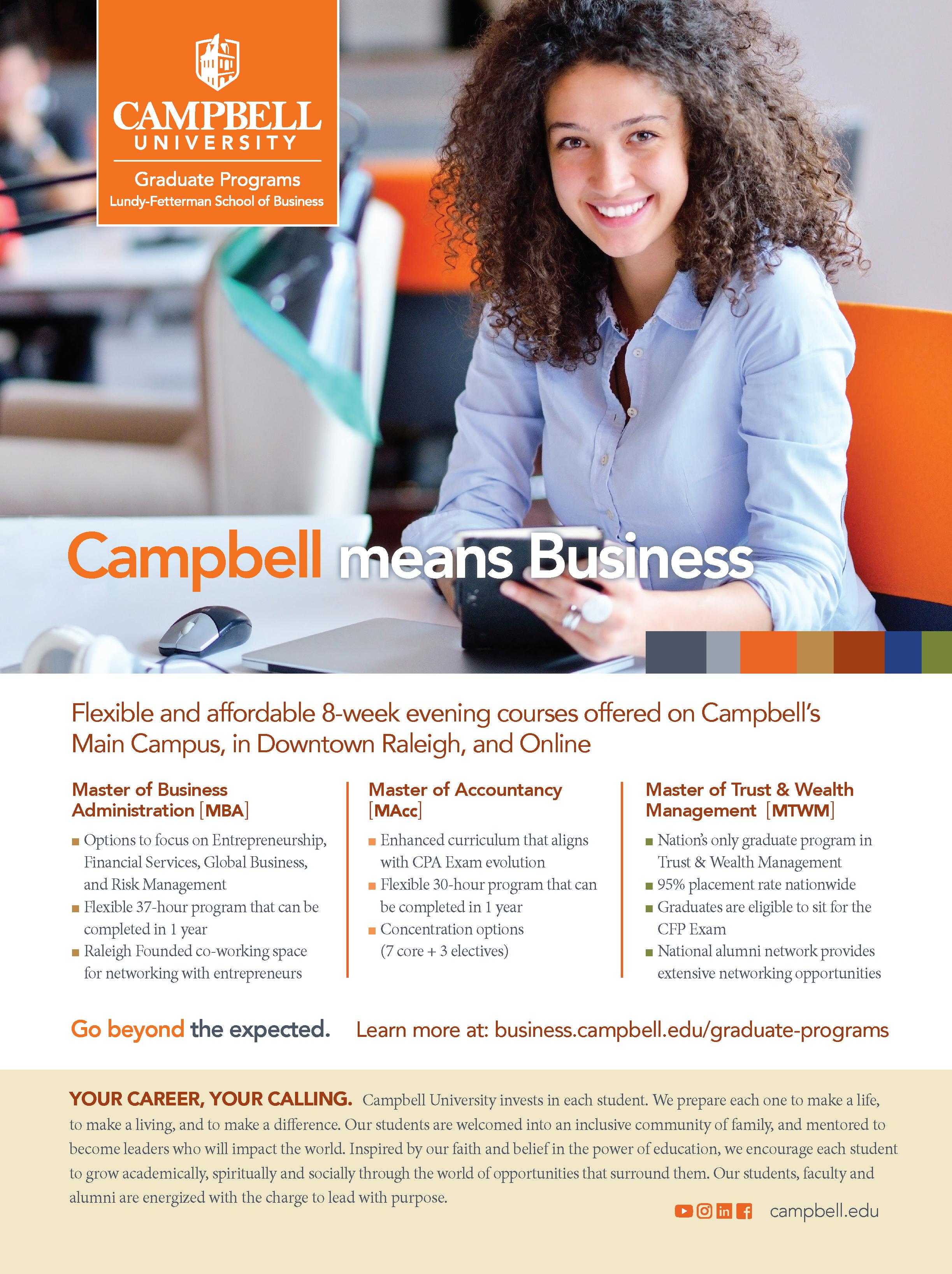

FUTURE’S SO BRIGHT

How Nido Qubein shocked the world at High Point University –and plans to keep it revved.



4

UP FRONT
6 POWER LIST INTERVIEW
Biscuitville CEO Kathie Niven dishes on the recipe that has made the ‘Fresh Southern’ chain thrive.
8 NC TREND
Wilmington’s endowment’s growing pains; Durham’s Higharc brings tech to home design; Greensboro software company helps NASA pick space travelers; Making sustainability practical in the Queen City.
72 PROJECT PLANS
Japanese transportation and pharaceutical companies are investing heavily in North Carolina.




COVER
STORY
HPU’S TURNAROUND
24 ROUND TABLE: LIFE SCIENCES
Life sciences needs more workers and capital to keep thriving in Tar Heel state, experts agree.
34 NC PROFILES:
Investing in relationships can help build a career, but it also takes an investment in one’s self to succeed.
64 COMMUNITY CLOSE UP: IREDELL COUNTY
Available land, proximity to Charlotte and two interstates makes Iredell County a place to grow manufacturing, distribution and logistics businesses.




















Nido Qubein’s approach to higher ed turns doubters into believers. He explains it was a team effort.
BY DAVID MILDENBERGHIGHER EDUCATION










Our annual guide to the state’s public and private colleges and universities, from enrollment, to cost, to graduation rates.
BY PETE ANDERSONCRUSHING IT







Martin Marietta Materials spent 30,000 work-hours coming up with a business plan. It worked so well, Duke University students now study the blueprint in a finance course.
BY CHRIS ROUSHDEFENSIVE DRIVING



General Motors returns to its military roots in the heart of NASCAR
BY DAVID MILDENBERG
A BRIGHT FUTURE
As we enter the month of May, some are thinking about college graduation. I know my wife and I are because our oldest son plans to walk down the aisle at Appalachian State University later this month (as of press time, I hope that’s still the plan). We’ll be taking the family up the mountain as we celebrate his four years in Boone and what’s to come. A lot of families will be doing this across the state this month.
So it’s tting that this issue features our Higher Education Directory. is annual listing of the state’s universities and colleges really tells an incredible story of our state’s rich history in higher ed.
North Carolina has 16 public universities, 58 private institutions and 58 community colleges. Each listing includes enrollment gures, overall costs and other insightful information on why N.C leads the nation in higher education.
Our university system, both public and private, has grown and thrived over the years. e three powerhouses in the Triangle — N.C. State, Duke and UNC Chapel Hill — have been beacons for economic development. Another great story is the growth of other public universities such as N.C. A&T State, UNC Wilmington, Appalachian State University and UNC Charlotte.
Private institutions such as High Point University, Elon University, Davidson College and Campbell University have expanded and become integral parts of local and regional economies.
Equally impressive is the work that our community colleges are doing in terms of assisting economic development e orts.
Examples include the work that Guilford Technical Community College is doing with aviation industries in the Triad; collaborations between AB Technical Community College and Blue Ridge Community College and manufacturers in the West; and how Wake Tech and Pitt Community College, among others, are working with pharmaceutical companies in the Triangle and East.
I’ve traveled quite a bit over the years, visiting many of these places for one reason or another. To really understand their impact, you really need to visit the schools when classes are in session and buzzing with student activity.
I have done this at Fayetteville Technical Community College on numerous occasions. It’s a huge campus tucked away in a quiet neighborhood.
Once I arrive, I’m taken aback by the size of the place and the number of students there. It’s bustling. It makes you think about how much training is taking place at one time in one place. is is happening every day across our state. ese visits make me feel very con dent about our future.
Check out the directory starting on Page 38. I think it will help you feel the same way.

Contact Ben Kinney at bkinney@businessnc.com.

PUBLISHER Ben Kinney bkinney@businessnc.com
EDITOR David Mildenberg dmildenberg@businessnc.com
MANAGING EDITOR Kevin Ellis kellis@businessnc.com
EXECUTIVE EDITOR, DIGITAL Chris Roush croush@businessnc.com
ASSOCIATE EDITOR Cathy Martin cmartin@businessnc.com
SENIOR CONTRIBUTING EDITOR Edward Martin emartin@businessnc.com
SPECIAL PROJECTS EDITOR Pete Anderson
CONTRIBUTING WRITERS Heath Pulliam, Ray Gronberg, Vanesssa Infanzon
CONTRIBUTING GRAPHIC DESIGN Andie Rose
CREATIVE DIRECTOR Cathy Swaney cswaney@businessnc.com
GRAPHIC DESIGNER Pam Fernandez pfernandez@businessnc.com
MARKETING COORDINATOR Jennifer Ware jware@businessnc.com
ADVERTISING SALES
ACCOUNT DIRECTOR
Melanie Weaver Lynch, eastern N.C. 919-855-9380 mweaver@businessnc.com
ACCOUNT MANAGER AND AUDIENCE DEVELOPMENT SPECIALIST Scott Leonard, western N.C. 704-996-6426 sleonard@businessnc.com
CIRCULATION: 818-286-3106
EDITORIAL: 704-523-6987
REPRINTS: circulation@businessnc.com
OWNERS
Jack Andrews, Frank Daniels III, David Woronoff, in memoriam Frank Daniels Jr.
PUBLISHED BY Old North State Magazines LLC
PRESIDENT David Woronoff


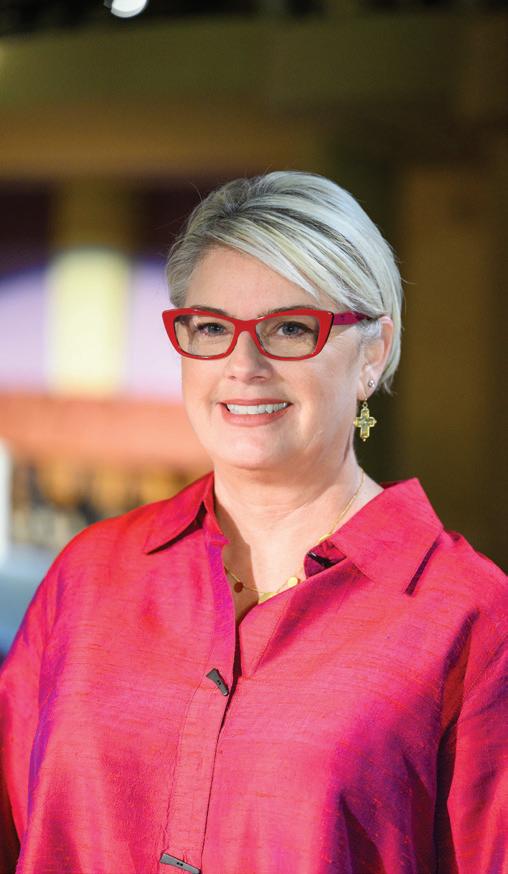
KATHIE NIVEN
LIST INTERVIEW



FAST AND FURIOUS

Biscuitville CEO Kathie Niven joined High Point University President Nido Qubein in the Power List interview, a partnership for discussions with some of the state’s most influential leaders. Business North Carolina’s annual Power List publication spotlights the state’s power brokers.
Kathie Niven joined Biscuitville in 2011 and has helped it rebrand as Fresh Southern, revamp its menu and triple annual revenue to $150 million. The Elon University grad had worked for Arby’s, Burger King and other fast food giants when she joined the regional chain, where she became CEO in 2021.
One of her early innovations was creating a “menu management assembly” process that produced the most successful promotional product-launch in company history – the spicy chicken and honey biscuit – resulting in product sales of $5.2 million annually and a 7% revenue impact. She also developed Biscuitville’s accredited college summer internship program.
Biscuitville’s roots go back to its founder, Maurice Jennings, opening two bread and milk stores in Burlington in 1966. The first Biscuitville opened in 1975 in Danville, Virginia. The chain now has 75 locations and still builds its reputation on scratch-made biscuits, Southern-style breakfasts. Stores close at 2 p.m. every day.
Niven took over as CEO from Burney Jennings, the founder’s son, who is now executive chair.
This story includes excerpts from Niven’s interview and was edited for clarity.
What makes the Biscuitville biscuit so good?
I think it’s a lot of things. I think it starts with the fact that it’s a family recipe. So when Maurice Jennings, our founder, started the company, it was a recipe that was personal for him. And then I think being family owned, how that quality comes across to the consumer is personal for the family. They take great pride in it.
The other important ingredient is that we use the same three ingredients that we always have. The first is the flour, and that’s from a company here in North Carolina. The second is we use shortening, and the third is our buttermilk. That is also from this area. So the ingredients matter a lot.
People can also watch us make them, and the integrity of how we make them the old-fashioned way.
You’re in North Carolina, South Carolina and Virginia. Why aren’t you all over the country?
I think the family has always been committed to making sure that the culture of the company is in each one of the restaurants, and that just takes time to build. It’s about making sure that we go slowly enough to make sure that our processes are appropriate, the culture is appropriate, and meets the standards of the company.
So this is 100% family owned. It’s not a franchise or license based business?
That’s correct. Every restaurant is owned by the family and run by an operator who works directly with the family.
Tell me about your own background. What was your first job?
As soon as I graduated from college, I had spent the last four or five years really preparing for law school. So I came out of college doing an internship with the district attorney in Graham, North Carolina. On the side, a friend of mine, Nancy Allison, purchased a second Arby’s in Graham, and she asked if I’d help her on the weekends.
I didn’t know much about the industry, and she didn’t know much, which was sort of the magic. Everything was possible for us. So my father said, you know, this might be a better fit than law school.
I ended up staying for an extra year, and then before I knew it, it was seven years and we’d built those two restaurants up.
I suspect one of your biggest areas of focus is people in your business.
The recipe is the flour, but the people make it or break it. One of the most important things that the brand has focused on since 2014, when we did the full rebranding project, is how do we attract the talent that gets us where we think we can go?
We have agreed and spent years on this, and it came from the inside, not from top down. In addition to the values we looked at, we looked at who people would want to work beside.
What traits do they have?
We added something in the last five years called cultural norms, and they keep moving and morphing and those are just specific ways in which we treat each other. And so the agreement is you can come from any background, you can be anybody. As long as we can agree on these basic norms, you’re going to love it here.
Treating people with respect is a big one. One of the norms people love is the concept of communication. I can’t just yell something across the restaurant at you. Making people accountable for getting what they need by asking the right way is a surprising norm that came up from the people in the organization that has really made an impact. We have 19 of them. And so they’re similar to that sort of sentiment.
Consumers sometimes say there’s nothing fast about fast food. How do you manage that?
It’s important. It’s breakfast, right? Everybody’s like, nobody leaves home an hour early for work, so we’re always dealing with consumers who are in a hurry and they have very high expectations. And being late is a problem. So that’s a condition of being in the breakfast business that we take very seriously. We want to be convenient, and we want to get people there on time. So we invest in double drive-throughs. Every restaurant we build now will be double drive-through, which helps a lot. It’s just a big focus for us, and we spend a lot of time making sure.
How do you combine a griddle cooked egg that is cracked on a griddle and get it out the door in 90 seconds and make it the way you want it? There’s a real process and formula there that works.
Now, if you’re behind 10 cars, obviously it’s going to be a little bit different.
It just fascinates me how that system can keep up with all these demands.
It doesn’t matter how many systems or processes you have in place, those are never going to trump having a group of people who care about what’s happening. When the group cares about how fast it is, when they care about the quality, when they care about what they’re doing, it trumps the process and takes the process into a completely different level.
You started helping your friend at Arby’s on weekends and eventually became president in 2018 of Biscuitville. In 2021, you became CEO.
What is it about you that made you successful?
I think I was a sponge. First of all, I am a continual learner, and I look for that in the folks that run Biscuitville. We’re always looking for somebody who recognizes they can keep being better at what they do in their craft.
And I think the other piece is I care deeply about the products I create. This really came from my mom and dad and just the family values of leaving it better than you found it. And I think that’s really ingrained and matters because people want to see that.
What is it that makes you proud of being in business and working for a North Carolina company?
I think one of the most important things for being successful in the state, and I think it makes the state successful, is having a state that doesn’t give unfair advantages to companies, but that supports the fact that companies employ our people. They create the revenue that creates the systems that make it so enjoyable to be in North Carolina.
What’s next for Kathie Niven?
It’s interesting because we were all sharing our goals at a retreat two weeks ago, and I’ve sort of named mine CEO 3.0, which is what it is going to take in my development. What changes do I need to make to be the leader that the company needs now?
We’ve got an amazing leadership team. They could take it from here. So what value do I bring now? And I think part of that is spending more time just getting out there and building that culture, but also creating opportunities for some of the folks who work for us, who don’t have it. ■
SPREAD THE WEALTH

Wilmington’s new endowment encounters growing pains as it seeks `transformational’ change.

 By Edward Martin
By Edward Martin
The Cape Fear River laps at the hull as smells of breakfast ll the air. Soon, Sunday regulars are arriving at Anne Bonny’s Bar & Grill, a Wilmington barge restaurant used for a weekly worship service and breakfast provided by Anchor United Methodist Church.
Some of the 30 or so visitors smell of nights in alleys and vacant warehouses. ey sip co ee and enjoy sweet rolls, some wandering o before Pastor Jamie ompson’s message that God cares even for those without a street address.
“We don’t require them to stay. is is about meeting folks where they are,” says the Methodist pastor. “We try to connect them to professional services that we as a church aren’t equipped to provide,” such as healthcare and addiction treatment.
Anchor’s unconventional worship exists in part because of a $32,000 grant from the New Hanover Community Endowment. It was created with $1.25 billion in proceeds from the county’s sale of 800-bed New Hanover Regional Medical Center to Novant Health in 2021. It rivals Asheville’s Dogwood Health Trust, formed a er the 2019 sale of Mission Health, as among the largest community-building nonpro ts created in state history.
Other signi cant initial donations by the endowment include more than $15.6 million to various UNC Wilmington groups, $10 million to Cape Fear Community College and $4 million to the YMCA of Southeastern North Carolina. e endowment charter focuses on social and health equity, community safety and community development. e group has a goal of becoming a “transformational, move-the-needle,” organization, board Chair Bill Cameron says. Improving healthcare is not the sole focus.
Be tting its broad charter, the group in February approved
spending $6.8 million over three years to partner with the county on a nonpro t community grocery store in northeast Wilmington, where o cials say area residents have no convenient fresh food options.
But a deluge of money resulting from the sale of local hospitals can result in bruised feelings and disagreements over strategy and execution, other communities have found. at appears to be the case in Wilmington, where CEO William Buster, 52, le abruptly in early February without explanation.
At his hiring in March 2022, the foundation cited Buster’s experience as a senior vice president of Dogwood Health, which was created a er the $1.5 billion sale of Mission Health to HCA Healthcare. Buster had previous experience at foundations in Texas, Michigan and Winston-Salem.
No one will discuss the CEO’s departure. Buster issued a statement thanking the endowment for giving him an opportunity and saying his work set up the foundation for future success. He could not be reached for comment.
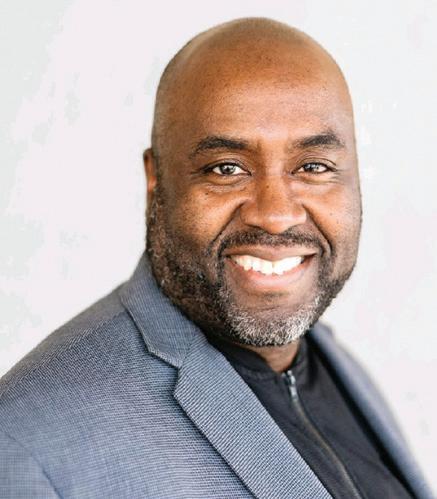

Asked what happened, Cameron says, “ at’s a personnel matter,” declining further comment. Executive Vice President Lakesha Day is now overseeing day-to-day operations. e board hired the Durham-based moss+ross search rm to nd a new leader.
Buster may have clashed with his board a er feeling rushed to pump out grants to show the endowment was progressing rapidly,
according to people familiar with the matter. Dozens of small, onetime grants have been made to groups such as Anchor Methodist.
Also, the former CEO was known for being outspoken. In an interview with WHQR public radio in Wilmington, he said, “If I lived in Pender County, I would be mad as hell. If my family … if my grandmother and my you know, my mom, and all my sisters, and everybody gave birth in that hospital and everybody, grandma had to go there, and we shared, and I and I saw the numbers and the number was 68% of the revenue came from outside of the county. It’s a sincere question that any rational person would have,” Buster said.”
That’s a sticky situation he inherited in Wilmington because the group’s bylaws restrict donations solely to New Hanover County. “That’s the major issue,” says County Commissioner Rob Zapple.
New Hanover partisans reason that county residents financed and built the operation, so they should benefit from its sale. But more than 40% of the hospital system’s revenue “has been derived from surrounding counties,” says Steve Stone, manager of adjoining Brunswick County, among the fastest-growing in the state. “Demographically, we’re one of the oldest counties in North Carolina, with a lot of retirees and similar residents.”
Stone’s estimate may be low; state data supports Buster’s view that more than half of system revenue historically came from residents outside of New Hanover. Beyond Wilmington, Novant operates smaller hospitals in Brunswick and Pender counties, plus more than 100 other medical offices regionally.
“If Pender or other counties had wanted their own, they could have built them like we did,” says New Hanover County Commissioner Jonathan Barfield. The endowment charter is final and stipulates the proceeds be spent in New Hanover, Cameron adds.
The hard feelings aren’t going away, however. “There’s the basic issue of fairness,” says Stone. “It seems to have gotten lost in the transition.”
Another concern is that Novant isn’t operating the system as well as the county. The system, which has major market share in Winston-Salem and Charlotte, is also working on its $2.4 billion acquisition of three coastal South Carolina hospitals in February.
“The transition simply is not going smoothly,” Zapple says. “Everybody has my number, and they tell me problems are not being addressed. The hospital used to be the best in southeast North Carolina. Not under Novant.”
In February, Novant named former UNC Health executive Ernie Bovio as CEO, marking the third person to hold the job during the Winston-Salem-based system’s short ownership.
Bovio is a 20-year UNC Health veteran who had led UNC Rex in Raleigh.
“He’s from outside Novant and seems to have identified the problems,” says Zappple. “It’s hard to get any kind of continuity when you have so much turnover. I have high hopes for him.”
To be sure, public complaints about Novant’s efforts in Wilmington haven’t reached the same level as in Asheville, where public officials, nurses, physicians and local residents have roasted HCA Healthcare after its purchase of Mission Health. HCA officials contend that they are addressing concerns and the system is operating well.
New Hanover County sold its hospital after a lengthy public auction process, led by a community advisory board co-chaired by former Mayor Spence Broadhurst and healthcare executive Barb Biehner. Most community leaders advocated for a sale, thinking the area would be better served with a well-capitalized system operating the 8,500-employee hospital. It had been among the largest U.S. hospitals still owned by a municipality, posting annual revenue of nearly $1.5 billion.
Transparency and the endowment board’s racial makeup are other key issues to watch at the developing institution. N.C. Attorney General Josh Stein’s review of the sale included a requirement that the group hold a public annual meeting. But most other business can be handled in private, despite the endowment’s receipt of $1.25 billion in public funds. Under IRS rules, it will have even fewer public disclosure requirements as it changes from a public charity to a private foundation in 2028.
Stein, the Democratic nominee for governor in November’s election, also emphasizes that the board should “reflect the diversity of New Hanover County.” The 13-member group, whose appointments are made by Novant (six), the county (five) and board itself (two), has two Black directors and one Hispanic. About 75% of New Hanover’s population is Caucasian.
Meanwhile, the endowment is ramping to eventually provide $60 million in annual grants. The Wilmington area is home to hundreds of nonprofit enterprises, most with annual budgets of less than $1 million. There are no shortages of hands reaching out in the Port City region, as the hungry Sunday morning visitors at Anchor Methodist can attest. ■


BANKING ON LIFE SCIENCES IN NORTH CAROLINA
This is the thirty-first in a series of informative monthly articles for North Carolina businesses from PNC in collaboration with BUSINESS NORTH CAROLINA magazine.
As home to the largest research park in the United States, three Tier 1 research institutions, a favorable business environment and a robust startup ecosystem that attracts its fair share of venture capital activity, North Carolina has leveraged this cross-section of competitive strengths to build a thriving life sciences landscape of global renown.
According to the North Carolina Biotechnology Center, North Carolina today is home to 830 life sciences companies that employ 75,000 highly skilled workers, with an additional 2,500 companies supporting this vital sector.
And as life sciences organizations with a presence in North Carolina continue to produce cutting-edge research and life-changing technologies, the banks that serve this vital industry are innovating solutions of their own to help facilitate success, growth and sustainability for this meaningful sector.
Delivering banking, capital markets and corporate finance solutions within a sector as dynamic and nuanced as life sciences requires the support of bankers with specialized industry knowledge and experience. Raleigh-based Rich Brown, who leads PNC Bank’s national Pharmaceuticals & Life Sciences corporate banking group, is one such banker.
As head of this specialized group, Brown serves as the senior PNC executive for a coast-to-coast book of business with a focus on pharmaceuticals, life sciences, medical devices and pharma services – collaborating with PNC Corporate Banking relationship managers in key markets across PNC’s footprint to help provide tailored financing and banking solutions to pharmaceuticals and life sciences companies.
He brings to this role a multi-faceted background in banking, venture capital and technology as he helps life sciences companies navigate an environment that is anything but linear. “Being a trusted banking advisor for pharmaceuticals and life sciences companies is about so much more than reviewing financials and recommending a solution,” says Brown. “There are so many industry-specific variables and nuances to consider – from underlying market drivers, to intellectual property and patents, to reimbursement dependencies and regulatory developments.”
Among the industry segments for which Brown and his team have delivered innovative financing solutions is pharmaceutical services & technologies – and, specifically, contract research organizations (CROs), which originated in North Carolina and provide clinical trial management support for pharmaceutical, biotech and medical device companies and institutions.
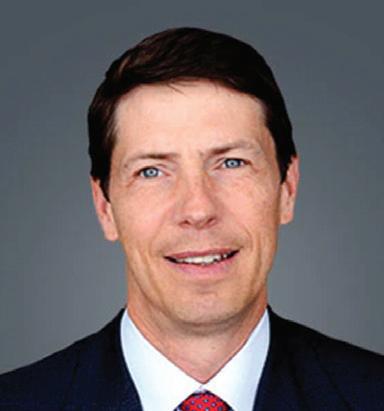
To help optimize the capital structures of CROs – organizations that, by design, deliver contract-based work and traditionally hold minimal physical assets – PNC Bank was a pioneer in structuring and implementing accounts receivable securitization credit facilities, which have helped some organizations optimize their capital structures, enhance profitability and support their strategic objectives, says Brown.
At the most basic level, an accounts receivable securitization is a committed capital facility used to finance or monetize a company’s accounts receivable portfolio. This financial application is designed to efficiently leverage the value of a company’s accounts receivable portfolio into a low-cost, committed financing platform, which is customized to meet the parameters and needs of each company.
“An accounts receivable securitization can be a meaningful component of a CRO’s debt capitalization stack because it can serve as a tool for achieving expense savings, cash flow improvement and reported leverage reduction,” says Brown. “Securitizations typically deliver interest rate savings relative to other sources of committed financing and also can be used for balance sheet improvement, such as working capital and leverage ratios, when accounted for as a sales or monetization program.”
And in the life sciences industry, which is rife with M&A activity due to a range of factors driven by patent life considerations, it is not uncommon for organizations to consider using the proceeds of accounts receivable securitizations to pursue strategic transactions or refinance debt, says Brown.
A veritable economic engine, the life sciences industry contributes more than $88 billion in economic impact statewide, according to a November 2022 report prepared for the North Carolina Biotechnology Center.
And, as Brown notes, the tremendous scale and growth of the industry represents a remarkable success story that underscores the contributions of visionary leaders. “I have had the privilege to work with many leaders of life sciences companies who skillfully create unique value propositions, innovate new technologies and realize commercial success,” he says. “There are many leaders in North Carolina who have achieved this trifecta, and their respective bodies of work serve as inspiration for what our region can accomplish.”







In an industry as dynamic as life sciences, ongoing efforts to build scale and innovation unfold against the backdrop of an ever-evolving regulatory landscape.


Among the pending and recently enacted regulatory changes PNC is monitoring – changes that have the potential to impact life sciences organizations as 2024 progresses – include:
Inflation Reduction Act (IRA) – Pharmaceutical companies continue to encounter challenges stemming from the Inflation Reduction Act, which has given Medicare increased leverage in negotiating drug pricing. The pharmaceutical industry has opposed the passage of the law, and several companies and lobbying groups have filed lawsuits in an effort to overturn the legislation or limit its impact.
Mergers and Acquisitions (M&A) – The Federal Trade Commission and Department of Justice have proposed updates to U.S. merger guidelines that could affect regulation of consolidation in the healthcare industry. If guidelines are finalized, vertical and cross-market mergers will not be allowed to create anticompetitive market structures, and regulators will be able to examine vertical mergers even if they are below 50% market share.

Pharmacy Benefit Managers (PBM) – Lawmakers have proposed federal legislation to investigate PBM business practices around pricing transparency. PBMs,
which help administer prescription drug insurance benefits by negotiating prices with drug manufacturers and pharmacies and establishing drug formularies and pharmacy networks, are under scrutiny, given the level of concentration of their services (with three PBM firms controlling the majority of the market) and vertical integration with insurers and pharmacies.
Lab Regulation – The Food and Drug Administration (FDA) has proposed regulations that would bring laboratory-developed tests under the agency’s purview. These tests were previously exempted from some regulatory requirements, but the FDA is now making efforts to include all tests under one regulatory framework.

Sterilization Technologies For Medical Devices – Increased Environmental Protection Agency (EPA) standards may require transitioning away from the use of ethylene oxide (eto) to new sterilization technologies. The industry has concerns about the EPA’s proposed timeline and emissions targets.

For more information, please
REGIONAL PRESIDENTS:
Weston Andress, Western Carolinas: (704) 643-5581
Jim Hansen, Eastern Carolinas: (919) 835-0135
These materials are furnished for the use of PNC Bank and its clients and do not constitute the provision of investment, legal, or tax advice to any person. They are not prepared with respect to the specific investment objectives, financial situation, or particular needs of any person. Use of these materials is dependent upon the judgment and analysis applied by duly authorized investment personnel who consider a client’s individual account circumstances. Persons reading these materials should consult with their PNC account representative regarding the appropriateness of investing in any securities or adopting any investment strategies discussed or recommended herein and should understand that statements regarding future prospects may not be realized. The information contained herein was obtained from sources deemed reliable. Such information is not guaranteed as to its accuracy, timeliness, or completeness by PNC. The information contained and the opinions expressed herein are subject to change without notice. Past performance is no guarantee of future results. Neither the information presented nor any opinion expressed herein constitutes an offer to buy or sell, nor a recommendation to buy or sell, any security or financial instrument. Accounts managed by PNC and its affiliates may take positions from time to time in securities recommended and followed by PNC affiliates. Securities are not bank deposits, nor are they backed or guaranteed by PNC or any of its affiliates, and are not issued by, insured by, guaranteed by, or obligations of the FDIC or the Federal Reserve Board. Securities involve investment risks, including possible loss of principal.
“PNC” and “PNC Bank” are registered marks of The PNC Financial Services Group, Inc.
©2024 The PNC Financial Services Group, Inc. All rights reserved.



DESIGNING A BETTER HOME
By Chris RoushIn 2018, Marc Minor wanted to build his family a new home in Durham, just north of Interstate 85. But he became frustrated during the design process at how long it was taking.
“It was very surprising to me how much of the Dark Ages the housing industry was in using software,” says Minor. “I realized that we could make the process much better for builders and for homebuyers by applying many of the software ideas used in manufacturing.”
Minor, who had been working for 3D printing startups Carbon3D and Desktop Metal, raised $5 million to start Durhambased Higharc with three co-founders. Two used to work for AutoDesk, a San Francisco-based software company with annual revenue of $5 billion, and one from the videogame industry.
Homebuilders now use Higharc software to help design homes, order building materials and market to potential homebuyers. They can sit down with builders to adjust color schemes or configuration of rooms using the software, which automatically changes orders for wood, paint and other supplies. The software can reduce the time required by builders to design and market new-home communities by 75%.
Higharc’s efforts are attracting prominent investors, who put up $53 million in February. The 18-member group included Home Depot and former AutoDesk CEO Carl Bass. Since 2018, the business has raised $78.7 million.
Minor expects Higharc to turn a profit within a few years. “We’re in it for the long run,” he says, sitting in his 3,000-squarefoot home, which was finished during the pandemic and served as inspiration for the company’s software. “We’re in it to influence how homes are designed and built.”
Epcon Communities, which built about 300 homes in the

Raleigh and Charlotte markets last year, started using Higharc’s software in the fall of 2021, says Paul Hanson, president of franchising and product development. He says the company previously designed homes using one software, marketed in another software and developed pricing estimates for construction in a third.
“We were skeptical [about Higharc],” says Hanson. “We tested it in a community in Cincinnati and spent a lot of time giving feedback on what we wanted to see in the drawings. And so they changed what they were doing.”
Now, the software has “purchasing capabilities and instant access to the amount of materials such as drywall and studs and windows. And they have a feature where sales consultants can see the inside of the house and walk through selections with a customer.”
Such features eliminate confusion by the buyer, Hanson adds. “Now they can see everything down to the color selections,” he says. “We’re really thrilled with the marketing capabilities.”
The cost of the Higharc software is more than what it was previously using, but Epcon had digested that expense because of the shorter sales cycle and the elimination of construction errors, he says. He declined to share details because of a confidentiality clause.
Minor believes that the software, which is primarily employed by smaller and regional builders, will eventually be used to build most homes. AutoDesk’s AutoCAD, introduced in 1982, now has a 90% market share in U.S. home design.
He also notes that Higharc’s software allows builders to adjust for market changes, such as higher interest rates that can force buyers to adjust their ideal price. “If the home market changes and buyers all of a sudden don’t have as much purchasing power, how do you change what you’re building?” he asks. “Our strategy is to enable the people who build houses to have a higher margin and in the long run, improve the affordability of houses.” ■
MARS MISSION
By Heath PulliamAsmall North Carolina technology out t is making waves in the eld of Mars travel. Xtern So ware, a Greensboro custom so ware development company, is playing a behind-the-scenes but integral role in Artemis, NASA’s upcoming manned mission to the moon.
Back in the early ’80s, 10-year-old Greensboro native Keir Davis spent a lot of free time tinkering with computers. “ is hobby that I’ve had, maybe it could really be a career,” he recalls thinking. A er earning a degree in broadcast communications at UNC Chapel Hill, Davis veered into so ware and earned a master’s in computer science in 2000.
A er working for a so ware integration business, Davis founded Xtern So ware in 2002.
Xtern’s initial successes involved desktop so ware for manufacturing companies, though work has now shi ed to be more web- and mobile-focused. e company’s core clients remain manufacturers such as furniture maker Lloyd Flanders, though other clients include Lagos Fine Jewelry and various departments within UNC Greensboro.
One of Xtern’s value propositions is that their work is done locally and not outsourced. “If you can dream it and think it up, then we can build it for you,” says Davis, who remains the company owner.


One of space travel’s biggest challenges is preventing interpersonal con ict onboard the vessel. e constant isolation, con nement and prolonged separation make selecting and monitoring astronauts huge factors of a successful mission.
Teaming up with NASA, researchers from Northwestern University’s Communications and Engineering departments are building a so ware interface called Tool for Evaluating And Mitigating Space Team Risks, or TEAMSTaR. e team uses the behavior modeling tool to study the optimal composition of
astronauts for long-distance missions.
As the Northwestern team is building the algorithms that predict human behavior, they require a special so ware for TEAMSTaR. It required a great depth of knowledge in so ware development. A er responding to Northwestern’s RFP, Xtern was selected for the task. Most of Xtern’s developers have master’s degrees in computer science, company o cials say.

While the project’s data modeling and simulation so ware is done by Northwestern, Xtern handles the website and infrastructure side. “What we’ve created is the entire interface around it that the people in Houston will use on the ground to interact with and run models, and on the spaceship as well,” explains Davis. TEAMSTaR will help determine which four people, out of 115 candidates, will be selected for the Artemis mission.
Although Xtern has its sights on space, it focuses on the Greensboro community. “We are so proud to recruit and retain technology talent within the Triad,” Davis says. Nine of its 13 employees are UNC Greensboro graduates. Its o ce is located at the edge of Greensboro’s historic Fisher Park neighborhood, across from Latham Park, which the sta helps maintain through the city’s Adopt-a-Park program. Xtern also takes part in home repair with Community Housing Solutions and hosts site visits for UNC Greensboro students interested in technology. All but one of Xtern’s employees live and work in Greensboro.
Reliable so ware poses a di cult task in space travel. e connection between Earth and Mars is slow, as data must travel millions of miles each way. ere won’t be a way for astronauts to communicate with Earth in real time, so Xtern’s so ware has to function independently. Northwestern’s behavioral models will need to be rerun during the mission to continue monitoring the crew, 24 hours a day. at’s a huge task, given that a Mars mission is expected to occur over a few years, not months. e bulk of the work being done now by Xtern and Northwestern is for Artemis II, which is slated for September 2025. is mission is being viewed largely as a manned test run, gathering data for a Mars mission as early as the 2030s. Davis and his team are proud to work on a historic mission. ey’re making sure everyone’s mark gets le in space. “ e code set that we’re putting together, every single employee has contributed at least one line of code for a spaceship, even the o ce manager,” Davis says. ■



TALKING IN CIRCLES
Charlotte seeks to show environmental leadership through attainable projects.
By Vanesssa Infanzon
Charlotte’s 100 Gardens, which grows kale, lettuce and other leafy greens, was a natural t to lease space at the Innovation Barn incubator for environmentally conscious enterprises. e 400-foot space is plenty for the nonpro t vegetable grower, which sells or donates its products to local restaurants.
“It is a perfect match because we can have a public-facing facility that we can use for a variety of di erent reasons,” says Sam Fleming, 100 Garden’s executive director. “And they (Innovation Barn) can use us as an educational partner.”
Innovation Barn is part of Envision Charlotte, a publicprivate entity founded in 2011 when Center City Partners, Cisco, the city of Charlotte and Duke Energy wanted to boost awareness of sustainability initiatives. e goal is for the Queen City to be an environmental leader.
e e ort has attracted considerable notice. In 2014 and 2020, Envision Charlotte’s projects were selected as nalists at the Smart City Expo World Congress in Barcelona. In October, Newsweek named it one of ve cities worldwide making waves in sustainability, citing the group’s involvement in what insiders call “the circular economy.” at is shorthand for eliminating waste through creative recycling, rather than just pitching stu in the trash.
DIVERTING FROM THE LANDFILL
Envision Charlotte’s rst project in 2011 was an energy e ciency program for uptown’s largest buildings. Sixty-one buildings with a combined 23 million square feet of o ce space signed up, allowing meters to be installed that helped track energy usage. Over ve years, the program delivered an average reduction in energy use of 19%, just shy of the project’s 20% goal.


“It was this rst project that put us on the international map because we used data and technology to drive e ciency and sustainability,” says Amy Aussieker, Envision Charlotte’s executive director since 2013.
Envision Charlotte’s focus has shi ed to promoting “zero waste” by diverting concrete and demolition materials, organics, plastics and textiles from the land ll. By partnering with businesses, nonpro ts, universities and utilities, the e orts promote innovation and job creation, says Aussieker, a former business consultant and marketing executive at the Charlotte Chamber.
Among Innovation Barn’s projects, it recently has been collecting can carriers from local breweries. e barn’s plastics lab grinds down the carriers and molds them into bricks, furniture or tiles. It’s among several experiments to see what can be done with plastic.
“We are trying to look at the items the city of Charlotte already buys that we can produce instead of buying,” Aussieker says. “Like the water meter cover — it’s just a molded piece. Why aren’t we doing that with our excess plastic?”
Last year, Envision Charlotte began collecting glass bottles from the Spectrum Center in uptown Charlotte. ree tons of glass were crushed, si ed and broken into ve levels of sand and used as an aggregate in concrete. A local company, Resource Flooring, is using the recycled product for construction projects, while making donations to Envision Charlotte. e arena hopes to use the processed glass as a concrete aggregate in upcoming projects.
“We’re thinking about putting this (machinery) into a shipping container and making it mobile in the community,” Aussieker says. “We can have little pods around the community, bringing jobs and taking care of the glass in those areas.”
Envision Charlotte’s team operates the labs and projects, serves as the property manager and provides educational tours and eld trips for more than 100 visitors a week.
Last year, 3,500 volunteers worked on Innovation Barn projects, including an Earth Week community sanitation program called “Clean the Queen.”
Envision Charlotte operates with a $900,000 annual budget, aided by a mix of public and private sponsors. Corporate backers include Coca-Cola Consolidated, Duke Energy, Ikea and Lowe’s. Mecklenburg County budgets $75,000 a year for the Innovation Barn’s educational center, exhibits and kiosks. e U.S. Conference of Mayors made a $250,000 grant last year, while individuals kicked in about $12,000.

throw it in there,” she says. “But in Europe, they don’t have the land, plus they have more progressive policies.”
e Innovation Barn building is next to the city’s Solid Waste Services Department, and is leased for $1 a year. Six businesses and ve nonpro ts occupy space at the Innovation Barn, paying $8 to $15 per square foot in monthly rent.
BUILDING A REPUTATION
Aussieker envisions a future in which the circular economy is much more ingrained. In 2015, she invited 10 cities, chosen through an application process, to participate in workshops to learn how to launch a similar program in their own regions.
In 2017, she took a group of city leaders including the city manager, mayor pro tem and solid waste manager, to Amsterdam, Barcelona and Rotterdam, to see how the European cities manage waste.
“In the U.S., we have a ton of land, so we dig a big hole and
In February, Envision Charlotte hosted a two-day conference on the circular economy that attracted 110 representatives from California, Florida, North Carolina and Tennessee. e gathering featured the leader of Netherlands-based Metabolic, a consulting business that champions sustainability with a holistic approach and helps clients set zero-waste goals.
Envision Charlotte recognizes it needs long-term partnerships with funding attached to projects, says Jennifer Grabenstetter, an Envision Charlotte board member and a local technology and marketing consultant. If the program is of value, companies will pay for services that include generating jobs and providing training and skills development, she says.

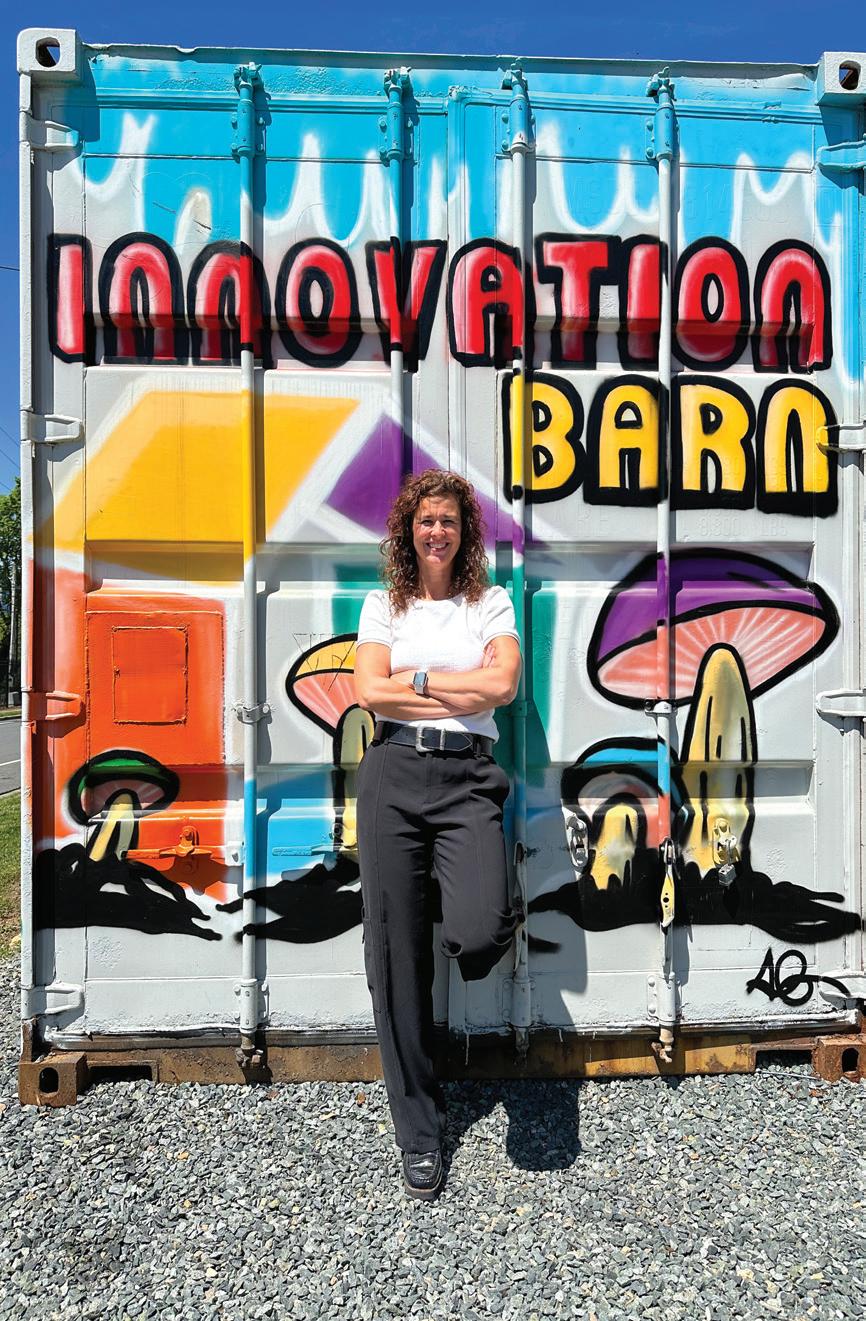

Jobs created through Envision Charlotte support the 2050 Circular Charlotte vision to be a more equitable, sustainable community, says Danielle Frazier, special assistant to the city manager for workforce development.
“We were the rst city in the United States to make that political commitment to a circular economy as a municipal strategy,” says Frazier, who is a board member of the nonpro t.
“We have a number of organizations and municipalities that ock to the city of Charlotte to ask, ‘How did you do it? How can we make it happen in our communities?’ I think that speaks to the leadership and where we are and where we are going.” ■















HAVING THE TALK: HOW EMPLOYERS SHOULD PREPARE FOR DIFFICULT DISCIPLINARY SITUATIONS
by Justin Hill and Ken GrayEvery employee hired is expected to be a team player and integrate into the employer's culture to cultivate success. However, nearly all employers find out at some point that new hires do not always work out as planned. Unfortunately, disciplinary action must be taken at times, and termination of employment becomes necessary far more often than many expect. Even worse, regardless of whether termination is justified or meritless, terminations can lead to lengthy, expensive legal battles. For business owners, proper planning can prevent them from expending six figures in legal fees (or losing their business altogether due to an exorbitant jury verdict).
DON'T WALK IN BLIND
Before inadvertently inviting costly litigation, employers should prepare for termination decisions and alleviate risks to the extent possible. This process starts with understanding the legal limitations of discharging employees.
First, the employer should review its relationship with the employee. Although at-will employment is the default rule in the United States (with the exception of Montana and Puerto Rico), employment contracts can provide a guaranteed term of employment. If an employer and employee agree to a term other than at-will employment and do not provide for termination without cause, then the employment relationship is terminable only for cause, which should be defined within the agreement. Additionally, contrary to popular belief, at-will employment does not allow employers to terminate employees for any reason. Instead, employers may terminate an employee's at-will employment for any reason or no reason, with or without notice or cause, provided that it is not for an unlawful reason.




Next, the employer must understand the applicable laws that may create a basis for wrongful termination claims. Examples include Title VII, the Americans with Disabilities Act, the Age Discrimination in Employment Act, the Family and Medical Leave Act, the National Labor Relations Act, and many more federal, state, and local laws. Employers also must recognize public policy exceptions to at-will employment, which prohibit termination from employment in specific situations. In summary, all of these laws prohibit discrimination, retaliation, or harassment against employees based on protected classes or protected actions.
While employment laws place limits on terminating employees, they do not prevent terminations based on legitimate grounds. However, if challenged, the onus generally falls on the employer to prove that an employee was terminated for legitimate, lawful reasons (and not rely upon the fact that an employee was employed at-will).
BUT DID YOU DOCUMENT IT?
Assuming termination is not for an unlawful reason, employers should look to their policies to support the decision to terminate an employee. Employers' policies should be crafted to match their practical standards and expectations. Moreover (and this step is important), employers must follow their policies and hold employees accountable for failing to abide by the policies. Oftentimes, proper documentation and implementation of policies serve as the first line of defense in wrongful discharge claims. Documented violations of company policies will help undercut an employee's burden to prove a wrongful discharge claim.
On the other hand, an employer's failure to effectively document an employee's issues prior to terminating








employment may indicate to the applicable agency (such as the Equal Employment Opportunity Commission) or a jury that the employee was actually terminated for an unlawful reason. Documenting the motives for termination in real time through performance evaluations, written warnings, and meeting notes is completely in the employer's control, so failure to prepare such documentation reduces an employer's chance of meeting its burden to offer a facially nondiscriminatory reason for termination. On the whole, it is essential that employers train their management-level employees to give timely, honest, and constructive criticism in an objective manner and maintain a sufficient written record to bolster defenses in potential litigation.
THE END
Once the appropriate documentation has been reviewed and the decision is made to terminate an employee, employers should deliver the message promptly and appropriately in a private meeting. Any disciplinary records or other documentation relevant to the termination should be assessed in advance to communicate clearly, concisely, and in accordance with the written record. The termination meeting, similar to other discipline, should be documented, and a human resources representative or another member of management should be present as a witness. When delivering the message, employers should be prepared for a negative response and avoid arguments related to the decision. Rather than debating facts, employers should lean on the documented issues and move the meeting towards a conclusion.
If applicable, the employee should be reminded of any ongoing obligations that survive the end of the employment relationship, such as restrictive covenants or confidentiality
agreements. When concluding, the employer should discuss the employee's final pay, any continuing benefits, and whether a separation and release agreement will be provided as consideration for any severance payment. Finally, employers should be aware of any notices required by state and local law to ensure that those final obligations are met. Although not required, it is generally recommended that employers send a follow-up termination letter encompassing the termination meeting and providing any required notice in writing.
CONCLUSION
Every termination is different, and any disciplinary action taken by an employer has some risk of being misconstrued. However, employers who put the time and effort into documenting issues in advance stand a much better chance of having a former employee's claims dismissed at minimal cost. Conversely, those who fail to do the work on the front end generally pay for it (figuratively and literally) on the back end.
Ultimately, there is no singular script for terminating an employee. There is no avoiding the fact that disciplining an employee is a difficult situation. Nevertheless, thoughtful employers prepare for these situations and hopefully avoid additional legal disputes arising out of these situations down the road. ■


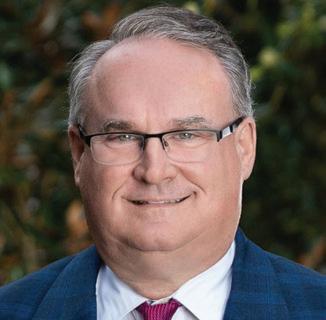


Ken Gray Labor and Employment Attorney smg@wardandsmith.com
Justin Hill
Labor and Employment Attorney jthill@wardandsmith.com
Read additional articles in our new series "Laboring through Difficult Times" throughout May at wardandsmith.com

This article is not intended to give, and should not be relied upon for, legal advice in any particular circumstance or fact situation. No action should be taken in reliance upon the information contained in this article without obtaining the advice of an attorney.





CHARLOTTE
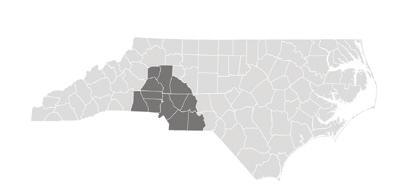
CHARLOTTE
Arizona-based Resideo Technologies expects to acquire Charlotte’s Snap One for $1.4 billion in the second half of the year. Resideo said it will combine Snap One into its security products distribution. Snap One’s has complementary products in its smart living market and innovative Control4 technology platforms.
Rodgers Builders has been sold to Japan’s Kajima, a publicly traded company and one of the world’s largest contractors. Kajima also owns Batson-Cook, an Atlanta-based contractor. The late B.D. Rodgers started his business in 1963. His wife, Pat, has run the firm since 1987.
Investment giant Vanguard Group paid $117 million for the 91-acre campus in University City originally planned to house insurer Centene’s East Coast headquarters. Pennsylvania-based Vanguard will consolidate its Charlotte
operations, including 2,400 employees, into the 700,000-square-foot office complex. Vanguard opened its first local office in 1997.
Wegmans Food Markets plans to open a store in Charlotte’s Ballantyne neighborhood in 2026. The Rochester, N.Y.-based grocer has 110 stores, including four in North Carolina with another planned for Holly Springs in Wake County. The family-owned company has $12 billion in annual sales.
McShane Partners, an investment advisory firm, was sold to Birmingham, Alabama-based Waverly Advisors. McShane was founded in 1985 as one of the first fee-only registered investment advisers in the city. McShane CEO Daniele Donahoe is majority shareholder and has grown the firm to more than $700 million in assets under management since joining it in 2010.
Ally Financial named Michael Rhodes as its new CEO. The move comes about five months after former CEO Jeff Brown announced he would become president of Hendrick Automotive Group. Rhodes will be based in Charlotte. He was named CEO of Riverwoods, Illinois-based Discover Financial Services in February
after working for Toronto-based TD Bank for more than 12 years. Capital One agreed to buy Discover for $35 billion, pending regulatory approval. Rhodes wasn’t getting a top role at the combined company
Krispy Kreme has agreed to sell its doughnuts in 13,500 McDonald’s restaurants by the end of 2026. The move is expected to double Krispy Kreme’s current distribution. McDonald’s started selling Krispy Kreme doughnuts in 2022 at some of its Kentucky stores.
Bojangles is opening its first restaurants in Los Angeles County. Lorenzo Boucetta and Poulet Brothers plan to open 30 restaurants over the next six years through a Bojangles franchise agreement. The company, founded in 1977, has more than 800 locations in 17 states.
Duke Energy named Harry Sideris as president, a title that CEO Lynn Good held. Sideris, a 28-year Duke veteran who will be responsible for Duke’s electric and gas utilities, including customer service and operations, has been executive VP of customer experience, solutions and services.
Piedmont Natural Gas wants an 11.7% base rate hike. The Duke Energy subsidiary says it needs the rate increase to recoup costs of complying with federal safety regulations and to build infrastructure to meet increasing energy demand. If the N.C. Utilities Commission approves the hike, it would take effect in November. The company serves 810,000 N.C. customers.
The Charlotte Symphony heard chaching after it received more than $40 million in contributions from local groups and foundations in a campaign led by retired Bank of America executive Pat Phillips. Bank of America and the C.D. Spangler Foundation each put up $10 million, while the Knight Foundation added $5 million. It’s part of a $50 million campaign.
Atlanta-based United Parcel Service announced it would cut 75 mostly part-time jobs at a Charlotte facility. The company has reported an overall logistics and shipping slowdown.
The N.C. Economic Investment Committee canceled the $2 million Job Development Investment Grants for Cognizant Technology Solutions, a large New Jersey-based tech company. Cognizant failed to meet its promise of creating 300 jobs “due to economic uncertainty and decreased demand,” the company said.
Hudson Automotive Group acquired Toyota of North Charlotte, owned by siblings Joe and Bob Siviglia. The dealership opened in 2003. Charleston, South Carolina-based Hudson now owns 54 dealerships in North Carolina, South Carolina, Georgia, Kentucky, Louisiana, Ohio and Tennessee.
Maynard Nexsen law firm acquired the North Carolina criminal defense firm Dysart Willis of Raleigh. The move expands Maynard Nexsen’s white collar criminal defense and government investigations practice. Maynard Nexsen also has offices in Greensboro and Raleigh, plus five locations in South Carolina.

BELMONT
Piedmont Lithium received state approval for its planned Gaston County mine, and will seek a necessary zoning change from county commissioners. Piedmont submitted its application in August 2021 to the N.C. Department of Environmental Quality’s Division of Energy, Mineral and Land Resources.
Novant Health established an endowed chair for its breast health department as the result of a $1 million donation from Bank of America Charitable Foundation. The foundation provided the donation in recognition of the 40 years of service of longtime BofA executive Catherine Bessant, who now leads the Foundation for the Carolinas.
Honeywell International is considering selling its personal protective equipment division in a deal that could value the unit at more than $2 billion. The company’s PPE products, ranging from respiratory protection to work boots and face masks, saw a surge in demand during the COVID-19 pandemic.
Autobell Car Wash opened its first Delaware operation, and 89th overall. Autobell is one of the largest U.S. familyowned car wash companies, employing more than 3,000 team members in North and South Carolina, Virginia, Maryland, and now Delaware. The late Charles Howard Sr. founded the business in 1969
and subsequent generations still own and operate Autobell.
HARRISBURG
Power Test, an electrical testing business, was sold to Texas-based Shermco Industries. A group of technicians and engineers formed Power Test in 2005 and it now provides field service, maintenance, testing, repair and analysis of power distribution and equipment to numerous customers across the state.
HUNTERSVILLE
Bharat Vats is the new CEO at Atom Power, succeeding founder Ryan Kennedy, who started the business based on research at UNC Charlotte. Atom raised $100 million from South Korea’s SK group in 2022, and last year received a $1.2 million N.C. job development grant, pending investment of $4.2 million and hiring of 225 employees over the next 12 years. Atom employs 100 and does EV charging installations.
NC TREND ›››
KINGS MOUNTIAN
Catawba Two Kings Casino is preparing to add 12 live table games this summer in addition to the existing 1,000 slot machines and electronic table games, retail sportsbook and restaurant. To support the operation of table games, the casino is opening a free card-dealer school.

SHELBY
Site Selection magazine named Shelby the top “micropolitan” in North Carolina for 2023 and No. 7 in the U.S. Cleveland County Economic Development Partnership had seven projects that resulted in an investment of $94.7 million and the creation of 399 new jobs in 2023, says Brandon Ruppe, the group’s associate executive director.
PINEVILLE
Houston-based Hines, a real estate company that owns Cary’s Fenton mixeduse development, entered the rental-home market here. Hines U.S. Property Partners bought Blu South, which has already finished 341 of a planned 551 houses on 75 acres, from Athens, Georgia-based Landmark Properties. Hines believes the “build-to-rent” sector is a financial winner because higher interest rates preclude many from buying homes.
TROUTMAN
Two North Carolina animal attractions — Zootastic, on 186 acres here, and Aloha Safari Park, on 68 acres close to Fayetteville — are on the market. Zootastic, dubbed the largest privately owned and operated zoo in the state, boasts a $16 million price tag. Aloha Safari Park offered for $4.5 million.
EAST
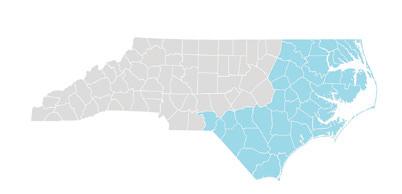
ELIZABTHTOWN
Campbell Oil and others agreed to a $700,000 settlement resolving allegations that the company conducted charter flights violating safety regulations. The United States District Attorney’s Office filed a complaint in March 2023 alleging that Campbell Oil, Executive Aircraft Services, and others illegally operated more than 150 paid, passenger-carrying flights that didn’t adhere to safety regulations. The settlement was not an admission of wrongdoing.
FAYETTEVILLE
Fayetteville State University faculty held a no-confidence vote regarding Provost Monica Terrell Leach, the school’s chief academic officer, over their workloads. Professors are angry that Leach is advancing a plan to require full-time faculty to teach four classes per semester instead of the current minimum load of three classes.
HAMLET
Graham-based Big Rock Sports is closing its 300,000-square-foot distribution center here and consolidating operations with its Charlotte warehouse. The center distributes a full range of fishing, hunting, shooting, camping, electronics and boating supplies and will close in June or July, resulting in the loss of 81 jobs.
KENANSVILLE
Highly Pathogenic Avian Influenza, commonly referred to as Bird Flu, has been confirmed in a herd of dairy cows at an undisclosed N.C. site. The virus is highly contagious among waterfowl and poultry, according to the N.C. Dept. of Agriculture. So far this year, HPAI has been confirmed
in commercial turkey flocks in Duplin and Lenior counties.
KINSTON
Tommy Sowers, the president of flyExclusive, resigned from the charterflight company. In a LinkedIn post, Sowers wrote, “My family needs me through my wife’s cancer treatment. While I love my work family, my family comes first, and I hope you understand.” flyExclusive began trading on the New York Stock Exchange on Dec. 2.
NASHVILLE
Canadian pet food company The Crump Group will spend $85 million to expand its manufacturing plant, slightly more than a year after it began production here. The company produces dog treats for Costco, PetSmart, Walmart and others. The initial 2021 investment of $13.2 million was expected to create 160 jobs. The number of jobs added by the latest expansion will be announced later.
NEW BERN
A German-based plastic injection molding operation will lay off about half of its 120 employees starting in May. Wirthwein will consolidate the automotive part of its business with a Fountain Inn, South Carolina, location that makes parts for BMW. Wirthwein’s remaining employees here will continue to make parts for appliance-maker BSH, which has a nearby plant.
TOPSAIL ISLAND
North Carolina land preservation organization Coastal Land Trust agreed to buy about 150 acres of undeveloped property here for nearly $8 million. Todd Olson, CEO of Raleigh software company Pendo, had previously proposed plans to develop 20 out of its 150 acres at the site.
WILMINGTON
An ongoing project will change the ways rail travels through the city, including closing some crossings and making improvements to new ones. The changes include permanent closure of five rail crossings and will be made to the existing 13-mile CSX rail line, which is the only active track through the city.
Additional cargo shipments are headed to North Carolina’s coast amid the ongoing Baltimore Port closure, North Carolina Ports disclosed. North Carolina Ports says it is working with an existing port customer that plans to utilize the Port of Wilmington as a contingent port until the situation improves in Baltimore.

YouTuber MrBeast — aka Jimmy Donaldson — struck a deal with Amazon’s Prime Video to host a reality competition series called “Beast Games.” The show will have 1,000 contestants competing for a $5 million reward, which promoters claim is “the biggest single prize in the history of television and streaming.”

Visit businessnc.com/smallbusiness or scan the code above to go directly to the nominations page.
We are looking to find the best Tar Heel small businesses.
2024 marks our 29th year of honoring the contributions small businesses make to our state’s economy. Help us to fi nd the small businesses that best represent North Carolina. The winners will be profiled in the December 2024 BUSINESS NORTH CAROLINA magazine. Please submit your nominations by June 18, 2024 .
SPONSORED BY

NC TREND ››› Statewide
New Hanover County approved more than $3.3 million in incentives to help fund the expansion of Wilmington Trade Center, to help fund the expansion of Wilmington Trade. It would be one of the largest industrial parks in the state. County incentives will help fund the infrastructure and investment needed to add 10 buildings. Plans call for 13 buildings overall with a combined space of 3.2 million square feet.
nCino President Josh Glover left the fintech company to pursue an opportunity outside of financial services. Paul Clarkson, a former executive vice president at Global Banking, was named executive vice president of Global Revenue. Other executives will take on the president’s duties.
WILSON
Germany-based Schott Phama will invest $371 million to build a pharmaceutical production facility that will create 401 jobs. It will the company’s first U.S. facility to manufacture pre-fillable polymer syringes, while adding to the nation’s supply of prefillable glass syringes. The company’s first of six U.S. manufacturing facilities.
A Circle K located off U.S. Highway 264 plans to add a 24-vehicle charging station
that will be the largest supercharging site in the state. The expansion will also include the only Krystal fast-food location in the area.
TRIAD
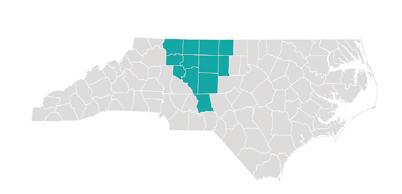
EDEN
Nestlé Purina PetCare opened its $450 million renovation of the former MillerCoors brewery. The 1.3-million square feet of production space sits on a 1,365-acre site. The Purina facility occupies about 80% of the site. It is parent company Nestlé’s first manufacturing facility in North Carolina.
THOMASVILLE
Davidson County officials cleared the way for another megasite in hopes of luring another large industrial development project to the Triad. A rezoning vote for property off U.S. 64 southwest of the city limits gives the Charlotte property owner more than 1,000 acres of land zoned light industrial. The

GREENSBORO
Boom Supersonic took a step toward its passenger jet ambitions by completing the first flight of its demonstrator plane, called XB-1, at the Mojave Air & Space Port in California. The startup jet maker has an agreement with North Carolina to build a $500 million flagship at Piedmont Triad International Airport, including as many as 1,761 workers.
proposed megasite is next to the property where Nucor is building a $350 million plant to make steel rebar.OINT
GREENSBORO
Cone Health and the N.C. A&T Real Estate Foundation confirmed their partnership on a $32 million mixed-use development branded as The Resurgent. The development is focused on revitalizing the area around East Market Street, across from N.C A&T State University and close to U.S. 29.
The new owner of the historic Spencer Love House released a statement about the decision to destroy the historic home. “We had hoped to renovate the home, but ultimately found that was not a feasible option to meet our needs,” said new owner Roy Carroll, who acquired the home from Bonnie McElveen-Hunter for $4.5 million.
WINSTON-SALEM
Hanesbrands will give some current and former employees the option of credit and identity monitoring, up to a $50 Hanes store credit and $6.99 in shipping costs, or a cash payment of $35 in a proposed settlement of a federal lawsuit tied to a May 2022 ransomware attack. Separate lawsuits were filed in February 2023.
Novant Health named Alice Pope as its new executive vice president and chief financial officer, effective May 13. She has been CFO at Falls Church, Virginia-based Inova Health System, and had similar posts at healthcare systems in Arizona and Tennessee during a nearly 35-year career.
Brookridge Retirement, a community of the nonprofit ThriveMore, partnered with Forsyth County nonprofit Imprints Cares to establish a childcare center called the Center for Thriving Children. The planned facility, serving children from infancy through middle school, is estimated to cost about $4.5 million.
Novant Health wants Forsyth County Board of Commissioners to approve a resolution allowing the nonprofit health care system to issue tax-exempt bonds valued at $750 million. Novant made a similar request to Mecklenburg commissioners to borrow up to $785 million in tax-free bonds, mostly for construction and expansion projects. Federal law requires approval for the issuance of certain tax-exempt bonds.
TRIANGLE
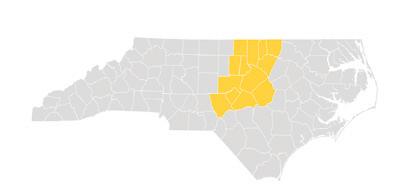
BURLINGTON
Labcorp made its fifth acquisition since spinning off its clinical trials business last year. The laboratory services company will pay $237.5 million to acquire select assets of BioReference Health, a wholly owned subsidiary of Miami-based OPKO Health. The assets generate approximately $100 million in annual revenue.
DURHAM
8 Rivers Capital, a decarbonization technology developer, hired Christopher Richardson as CEO. Interim CEO Dharmesh Patel, the former vice president and financial controller, will become senior vice president of finance. Richardson previously was the head of the Americas energy and infrastructure projects section at the global law firm White & Case.
Duke University discontinued its Reginaldo Howard Memorial Scholarship Program for “top applicants of African descent” in the wake of last year’s Supreme Court decision that ended race-based affirmative action in college admissions. The scholarship was established in 1979 and named in honor of Howard, Duke’s
first Black student government president who died in a car wreck during his sophomore year in 1976.
RALEIGH
Highwoods Properties sold nine properties for $79.4 million, including eight office buildings near Rex Hospital. Seven of the eight office buildings in Rexwoods were purchased by one buyer for continued medical and office use. The other building will be redeveloped.
More than 104,000 people attended the Dreamville Festival, a two-day, hip hop music event created by Fayetteville native and rapper J. Cole. The event set an attendance record at Dix Park in its fourth year, festival organizers say, with fans from all 50 states and representing more than 20 countries attending.
The governing board of North Carolina’s 58-campus community college system wants to restructure the funding model to make it more responsive to the state’s workforce needs of employers. The price tag for the first year of the Propel NC project would be about $100 million, in addition to the $1.5 billion already budgeted for community colleges.
The Raleigh-Durham Airport Authority Board passed a $419 million budget for the fiscal year beginning April 1. Traffic is expected to top 5.5 million passengers, a 1.1 million passenger increase compared to fiscal year 2023-2024.
Lab-testing company Mako Medical agreed to pay the state $2.1 million after state investigators identified unnecessary Medicaid billing for urine drug tests over five years. Mako allegedly gave health care providers the option to order two urine drug tests for patients, which were conducted on the same sample at or near the same time.
WEST
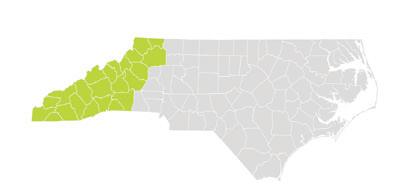
ASHEVILLE
UNC Asheville terminated a dozen staff members as part of a plan to address a projected $6 million budget deficit for the current fiscal year and an $8 million projected deficit for the following fiscal year, according to Chancellor Kimberly van Noort. UNC Asheville has faced a roughly 25% enrollment decline over the last five years.
George Briggs will retire Aug. 1 from the North Carolina Arboretum, ending a 37-year-career. The Reidsville native is credited with creating The Arboretum.
BOONE
Sheri Everts stepped down as chancellor of Appalachian State University due to “significant health challenges,” she said. She had been chancellor since 2014. UNC System President Peter Hans named Heather Hulbert Norris, provost and executive vice chancellor, as interim chancellor.
CHEROKEE
Plans for the state’s first legal recreational marijuana sales are on hold as the Eastern Band of Cherokee announces their marijuana dispensary will only sell medical marijuana during its April grand opening. The Great Smoky Cannabis Company dispensary will be the first in the state. A joint statement issued by tribal leadership said there are still too many questions about the implementation of recreational marijuana to start sales April 20. ■















LIFE SCIENCES LEADERS



North Carolina is home to 830 life sciences companies that directly employ 75,000 people, emerging as a leader in biotechnology, pharmaceuticals, medical devices and agricultural biotechnology. In 1984, the state’s General Assembly established the North Carolina Biotechnology Center to encourage the development of the life sciences across the state.
North Carolina is ranked among the top three states for biotechnology strength, according to Business Facilities Magazine. North Carolina is among the world’s largest and most mature life sciences clusters and is highly specialized in biomanufacturing and clinical research.
Business North Carolina and the N.C. Biotechnology Center recently gathered a panel of biotech experts and leaders to frame the issues around the life sciences industry. The panel was moderated by Executive Editor Chris Roush and has been edited for clarity.
Photography by Bryan ReganThe discussion was sponsored by:
•N.C. Biotechnology Center
•N.C. Central University
•NC Life Sciences
•Pappas Capital
•Pitt County Economic Development
WHAT DO YOU SEE AS THE BIGGEST CHALLENGES IN THE LIFE SCIENCES INDUSTRY?
JORDAN: The biggest issue that I see is access to capital to fund some of the exciting innovations that the biopharma industry is creating. As we understand more about disease and wellness, it takes capital to get these technologies approved.
EDGETON: I agree with that. But I also say probably from our perspective, the workforce for the growing industry is a big challenge. We are facing shortages of workers in the thousands. And so we
want to make sure that the state is ready for the next generation of opportunities that are coming our way.
BAXTER: We think that microplastics are one of the most pressing issues today. We’re as a species depositing about 1 million metric tons of plastic waste every single day. And we are also consuming too many microplastics every single week, which has been linked to things like cancer, heart disease, inflammation and fertility. And we’re just really scratching the surface of all of the health issues. We think that that’s an area of study that needs to be significantly more funded and addressed.
PAPPAS: I’m gonna flip it around because everyone talks about capital, and I agree with what Doug says in terms of manpower. But the other side of the coin in terms of capital for the market is really entrepreneurial leadership to lead and build our companies. If we have those correct people in place, I think they’re going to be able to raise money. We’ve shown that money can come into the state if we’ve got the right leaders.
SMITH: I think one of the biggest concerns that we may have is making sure that there’s enough people of diverse backgrounds that can get jobs in this industry.










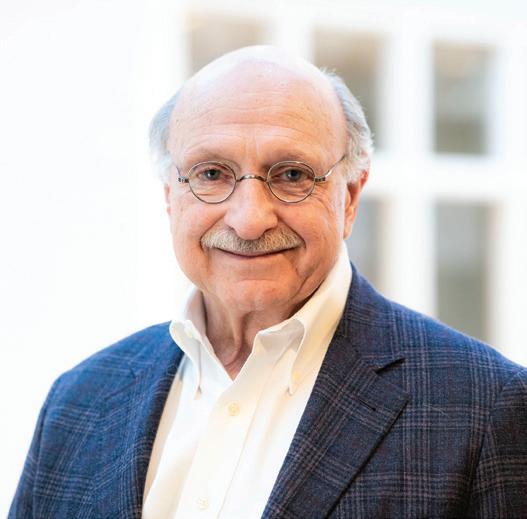




KUENZI: In Morrisville, we’ve had a site there for quite some time and we are currently building one of the largest bio manufacturing facilities in the country in Holly Springs. It’s going to be a $2 billion investment (increased to $3.2 billion investment since this discussion). And with that comes a lot of need for talent. That’s one of the biggest needs we have as a company is to not just attract talent, but to grow it and sustain it in this area. We’re going to need talent for years to come. And we’re looking for a diverse set of talents and people that have real skills when they come into the workplace. Not just book smarts, but people that have touched the equipment and really know how to get in and work in the industry.
MONTEITH: Interestingly, I just finished meeting with most of our members who have manufacturing facilities in the state. The No. 1 thing I heard was our workforce – not just entry level but also mid-management level positions. Currently, there isn’t a pipeline to fulfill those. Manufacturing sites have to go outside the state, which is something we would rather not be doing.
I’m going to throw one other thing in there that I haven’t heard yet. The second biggest thing I heard was infrastructure — wastewater management, water availability, power reliability. North
Carolina is known for the education and industry collaboration that occurs, especially in life sciences, to work on workforces. But I think what we’re suffering from right now is our success. We’ve grown extremely fast. Last two weeks, there were three new life sciences companies that have been announced coming into the state. Those are all drawing on the same resources. And that’s something I think we need to really be focusing on as we move forward to be able to maintain our position and become one of the central biomanufacturing hubs.
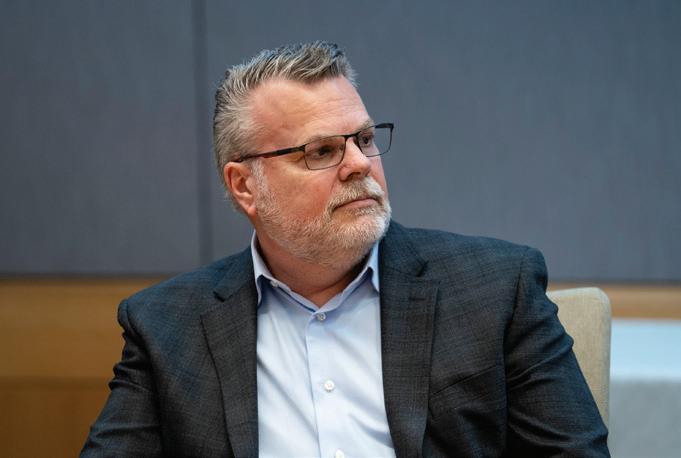
HOW DO WE GET THOSE TALENTED WORKERS INTO NORTH CAROLINA AND INTERESTED IN THE INDUSTRY? HOW DO WE TRAIN THEM?
KUENZI: One of the things that’s a real advantage for us here is that we have a university and community college system
that really works together. It’s not in separate silos. There are a lot of programs that are available. But that’s not all that we really need. If you get a bunch of engineers that come out that have never touched things like a bioreactor, it’s going to be difficult for them to come in and really contribute in a meaningful way. We have things like the NC Biotech Center; we have things that also give people some real practical experience. But I think we’re just beginning, and so how do we continue to expand and increase the collaboration among those programs to really make this a place that people want to come and work? It’s a real wake up call for us to say hey, we need to grab this and continue to work on talent in this area.
JORDAN: We start in a position of strength. And I love that stat of really coming up on Boston and San Francisco and San Diego – that North Carolina is holding its own now and No. 4 in the life sciences market. It seems like there needs to be maybe more from that strong educational system as to that next step of how do you help people get to the job. It seems to me that’s the divider.
SMITH: We have the programs to expand the processing training to six other campuses across North Carolina –five HBCUs and UNC Pembroke –
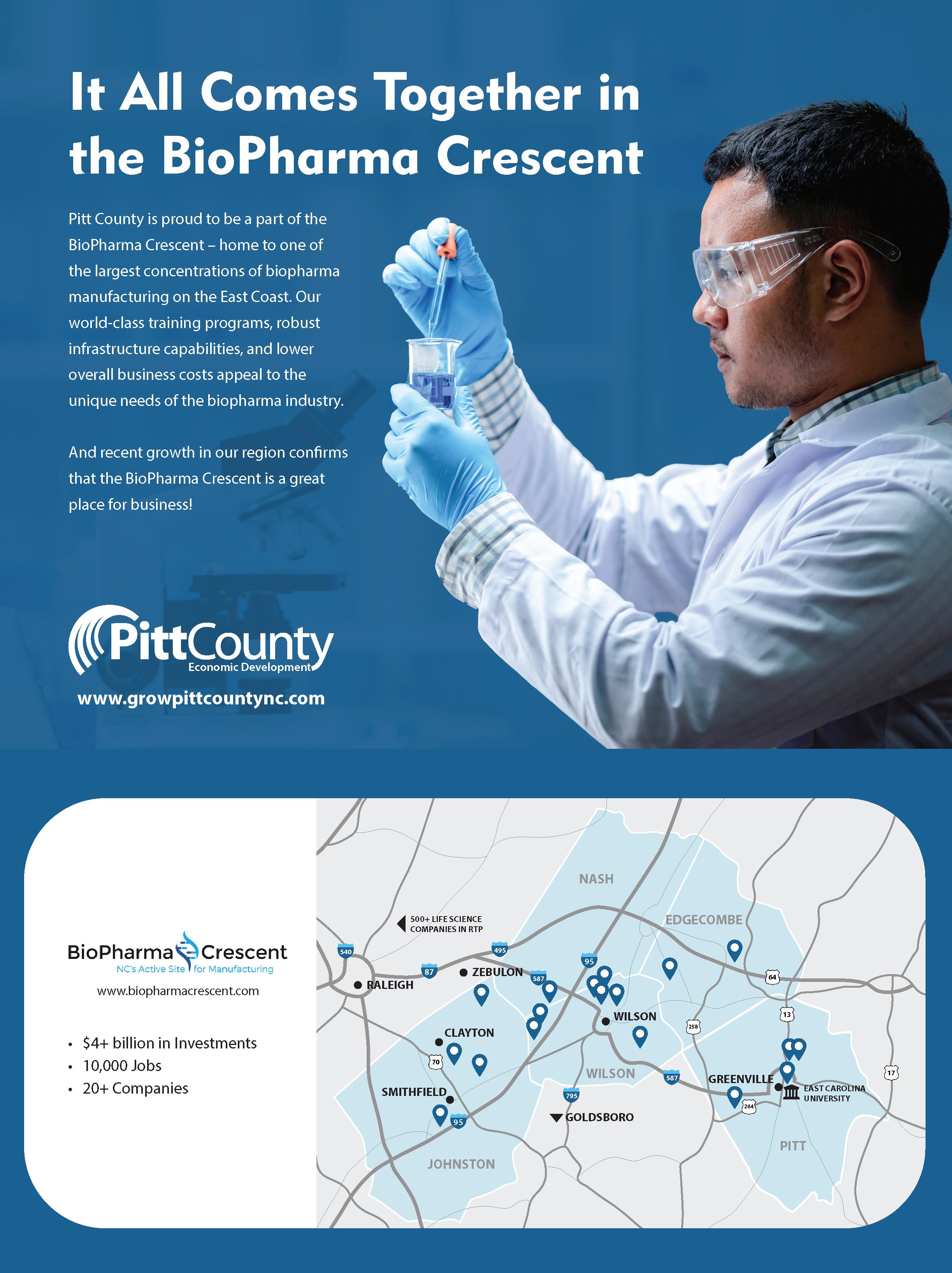
to train people on how to get these entry -level jobs. So how do you get that to other HBCUs across the state to train these people who would never have thought they would get jobs in this industry? And it’s all targeted to one or two counties, but people in these other counties live in the poorest counties in the state. To put someone in a job in the life sciences industry with a salary starting at $55,000 or $60,000, think about the economic impact you’re going to have in someone’s life and the change it has for North Carolina as well.
PAPPAS: There are two challenges. I think I agree with everything that’s been said. And I think what’s been attractive to some of the larger companies coming in, including the ones that just announced, was the workforce we have here and the education, the technical education coming out of the community colleges. But it’s the leadership aspect that we really don’t have in place in the community. My sense is in the community colleges, that’s part of the need. It’s not just the entry-level positions. It’s who’s going to supervise and grow and do the recruiting and the development of staff.
MONTEITH: So I’m part of NCBioImpact as well, which basically is a coalition of the academic institutions that are providing a lot of this training. We’re trying to rebrand to hit some of the points that you were just talking about. There’s an awareness problem. A lot of the people don’t realize a lot of these programs are in existence. And to be honest, I’m not sure that we’ve done a good job on the technical side or the leadership side. And I think we need to be able to put together this awareness program and let people, especially other HBCUs in the state, be aware of what’s going on. This is a statewide issue that we need to be focusing on.
EDGETON: Right now we have a need for about 12,500 trained workers. We also need people in the higher ranks who can actually run the organization because almost every one of those positions is recruited from outside the state. There are about 600,000 students in our community college system, and about 4,300 people a year graduate with a master’s or Ph.D. in the hard sciences, and another 4,500 or so with a master’s or higher in engineering. Attracting those people to the workforce will be really great, but they haven’t touched the equipment. So we have to have these intermediate steps to get those folks ready to go.

DILLON, WHAT’S
BEEN YOUR EXPERIENCE IN GETTING EMPLOYEES THAT FULFILL YOUR NEEDS?
BAXTER: We’re still a young organization growing quickly. We’re hiring on pace about a new employee a week and these are typically fairly key hires for us, kind of upper level. We’ve had great success finding industry professionals in the plastics industry here. It seems to be a very attractive place for people who want to work that don’t currently live here and we’ve been able to get some really good talent to want to relocate here. So I think we haven’t really seen too many issues. We’re still young and fairly small. So it’s been overall good so far, and I think there’s a lot of attraction to moving to the Raleigh-Durham area.
JORDAN: One thing we should do is think about upskilling people over a career. If the university becomes something that says, ‘Well, you’ve got your entry-level job, you’ve been there a few years, we want to promote people and bring them up in the industry.’ If they had opportunities to learn leadership skills or project management skills, these things that partner with their technical abilities, we can bring them up quicker through the ranks and keep them here so they don’t go take another job elsewhere.
MONTEITH: For the manufacturing side, we need the talent that’s coming out of the two-year colleges, the four-year universities and the graduate schools. But another big thing I heard were trades. We need mechanics trained at the vocational programs. So the high school levels are also very important to be thinking about as well.
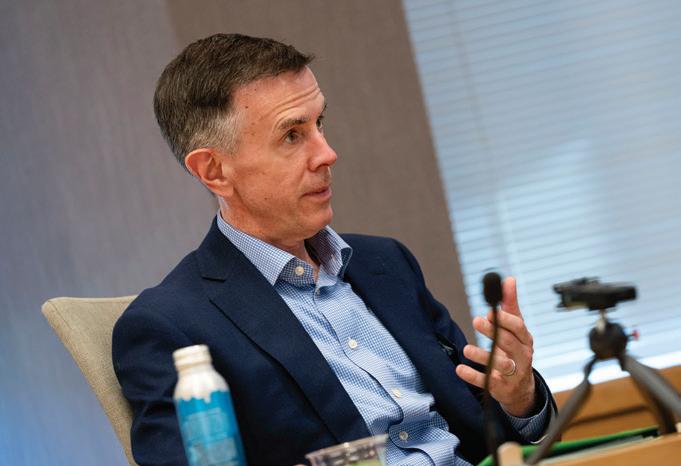
LET’S SHIFT GEARS FOR A MINUTE. FOR PEOPLE WHO LOOK AT INVESTING IN THESE COMPANIES, WHAT DO YOU LOOK FOR WHEN YOU’RE DECIDING WHERE TO INVEST?
JORDAN: The cost of developing a drug has only gone up and the complexity of doing so has also gone up. So inevitably, it puts pressure on these biopharma companies to raise money in equity markets that have not been all that friendly of late, especially coming out of
the 2021 peak for biotechs. And debt has gotten expensive and restrictive. When we look at companies, you want a strong leader and a strong team that is executing on a good business plan. The second piece is technology. And then third is an execution mindset that this is a company that can navigate the difficult pathway to get to approval. That takes capital because it’s a long process even when you’re at the final stages.
PAPPAS: My view was the other side of that coin, and that is if we have a good leader that’s here building a business, he or she should be able to get capital. When I look at our portfolio companies, a third of our portfolio is in this region. A third is on the West Coast, the other third’s in the Northeast. We’ve been able to syndicate with outside investors coming
in as long as we have a good leader running that operation. Our business is such that we need the capital to take it into the manufacturing side to develop it.
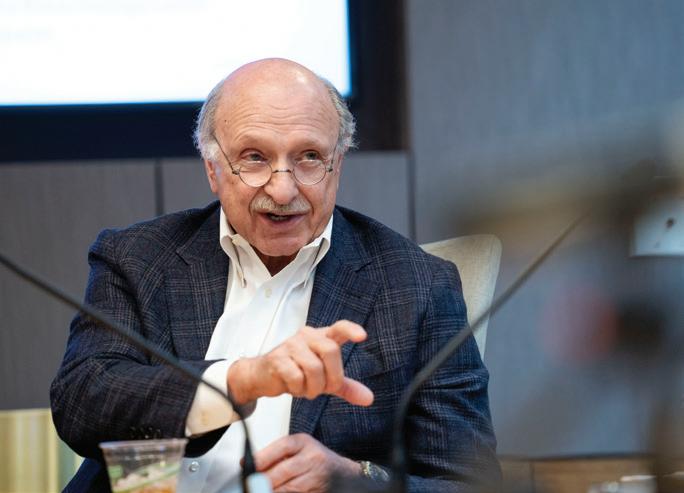
EDGETON: Prior to the pandemic, everybody felt like they had to be near the VC or the VC needed to be near them. But now people are much more open to being located in other places. We set a goal of attracting $4 billion of outside
capital coming into the state in 2020. And we’re about $3.5 billion into that.
DILLON, HOW HARD WAS IT FOR YOU TO RAISE CAPITAL AND TO GET INVESTORS?
BAXTER: There was a bit of a dry spell in early stage financing a little over a year ago. And that was a difficult time period. And then we found some pretty good momentum after that. So we recently closed on an $8 million bridge round and we’re about to close on another $15 million. I will say, we’ve been in North Carolina for about 10 months now. I haven’t had one discussion with any early stage investors in North Carolina. So all of that capital has come from outside. It’s interesting because I’ve met quite a few really promising startups. But it doesn’t
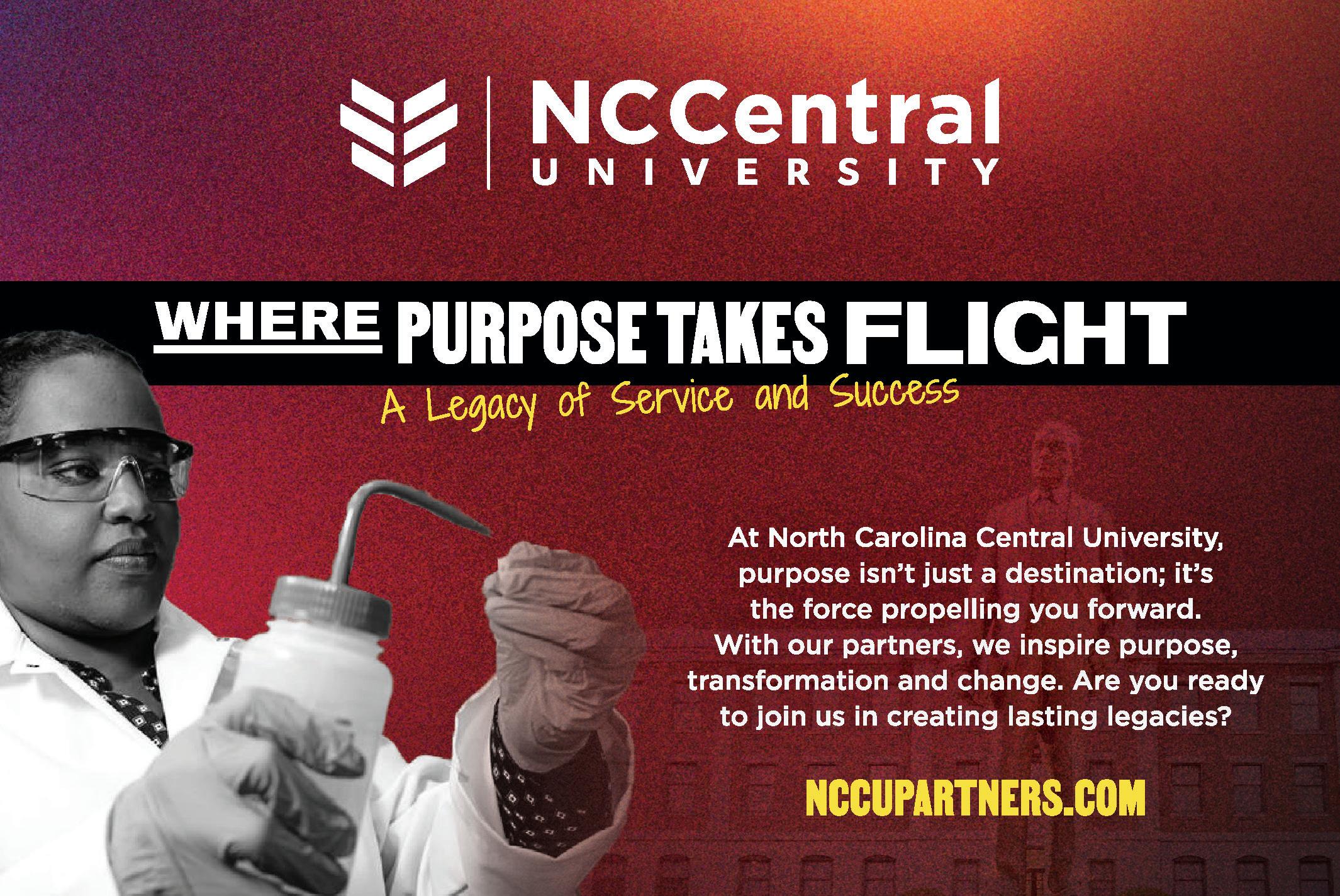
seem like the match is there for early stage capital in North Carolina. If you’re a good entrepreneur with a good company, you’ll be able to attract capital from wherever. But there needs to be more of it here. I think that’s underdeveloped.
KUENZI: One of the things we see at Fujifilm is that it sometimes takes so long to get the capacity that you need. You either have to build facilities, or you have to try and arrange and fit yourself into a company that is a contract manufacturer. We see the future as something that’s very modular and agile so that we can have buildings that are easily replicable and can be partnered with a customer to bring them up to speed. On the backside of that, not everybody has a big billion dollar blockbuster but they need manufacturing capabilities.
PAPPAS: I’m sure you see it as a business opportunity also because a lot of our early stage companies go to Korea to Samsung to do that kind of work. And we’d love to be doing it here in the United States.
HOW MUCH IS THE INDUSTRY DOING IN TERMS OF MENTORING? I HEAR A COMMON THEME HERE THAT WE’VE GOT SOME GOOD STARTUPS THAT HAVE GOOD IDEAS, BUT THESE PEOPLE ARE IN THE HARD SCIENCES AND MAY NOT KNOW HOW TO RUN A COMPANY.
JORDAN: My impression is that mentoring is more individualized, that it’s on the back of an enterprising entrepreneur to go find it. I don’t think that’s the right way for us to build enduring business. It would be great to set up more of this as part of the ecosystem where there is a group of people. I’d be delighted to share the things that I’ve learned.
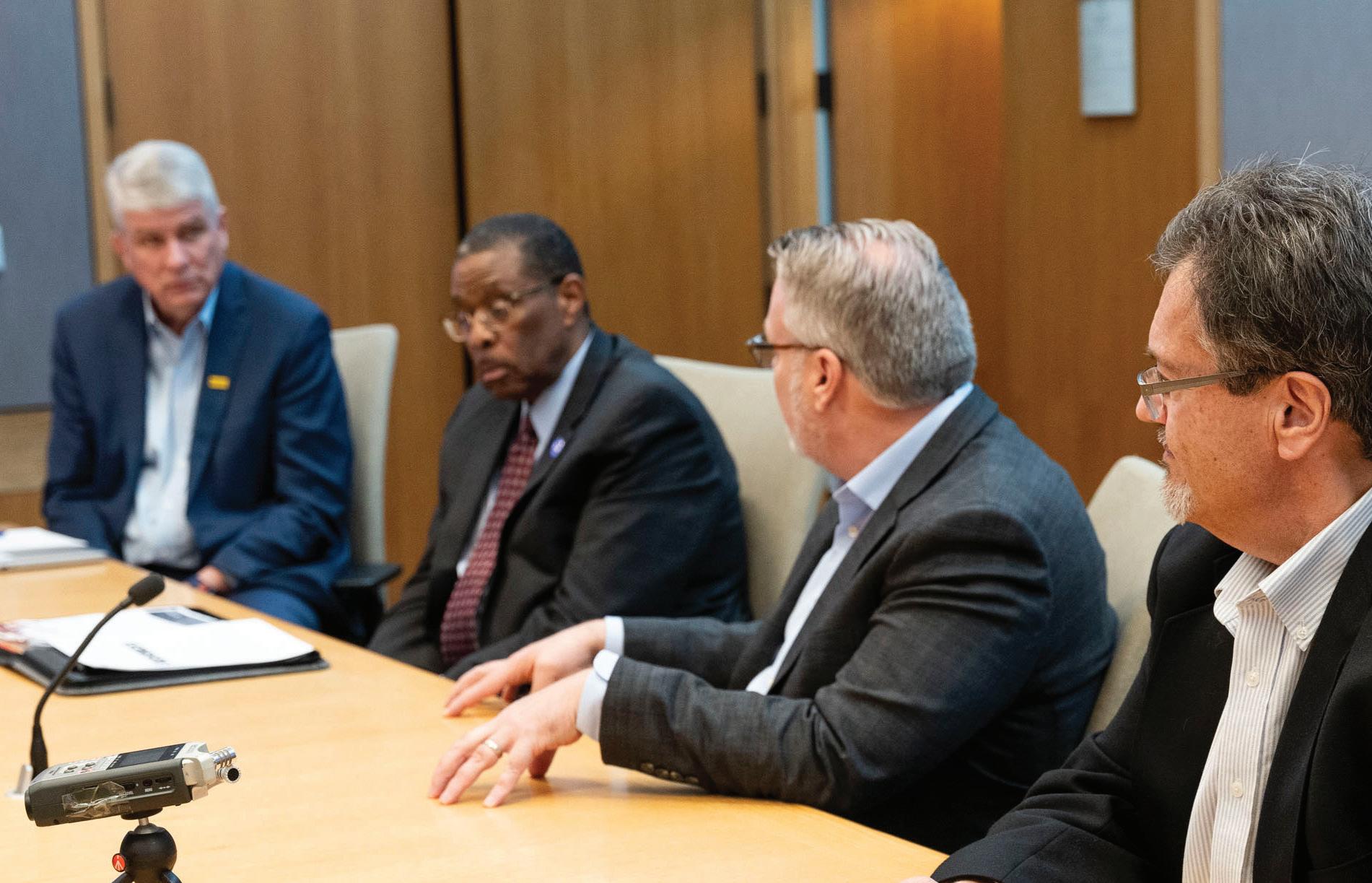
MONTEITH: My last three companies were all startups. You have a great scientific idea and you have a number of scientists forming a company and the operational parts of that are missing. They don’t necessarily mentor versus looking to hire it in. So they try to find people with the experience and the levels of knowledge that are needed to fill those roles versus sort of mentoring within. That’s what we did at StrideBio.

EDGETON: Each of the universities has executive and residence-type programs, but a lot of people don’t know that they exist. We have an entrepreneur in residence here at NC Biotech. We have three former CEOs of small startups that are here to help companies in our portfolio. But it’s small.
BAXTER: One thing that has been particularly effective that I’ve participated in is NYU’s Endless Frontier Labs program. That’s essentially an accelerator for deep tech startups. They did a fantastic job of bringing in not only experienced founders and CEOs but also experienced investors. So you got both the mentorship and the access to capital in one fell swoop. I think that’s something that could easily be replicated with the strength of the universities that we have here. I don’t see any reason why there shouldn’t be a program that mimics that format. I met great people through it.
PAPPAS: UNC does a great job with one of those programs. Duke does as well, and N.C. State does it on the veterinary side. But I wouldn’t underestimate the power of what the Council for Entrepreneurial Development has done to our area and helping not just life sciences. The coaching that I observe that goes on in areas is akin to mentoring in a major way.
EDGETON: We’ve got a program right now going on, and we have the ability to provide funding and coaching and library


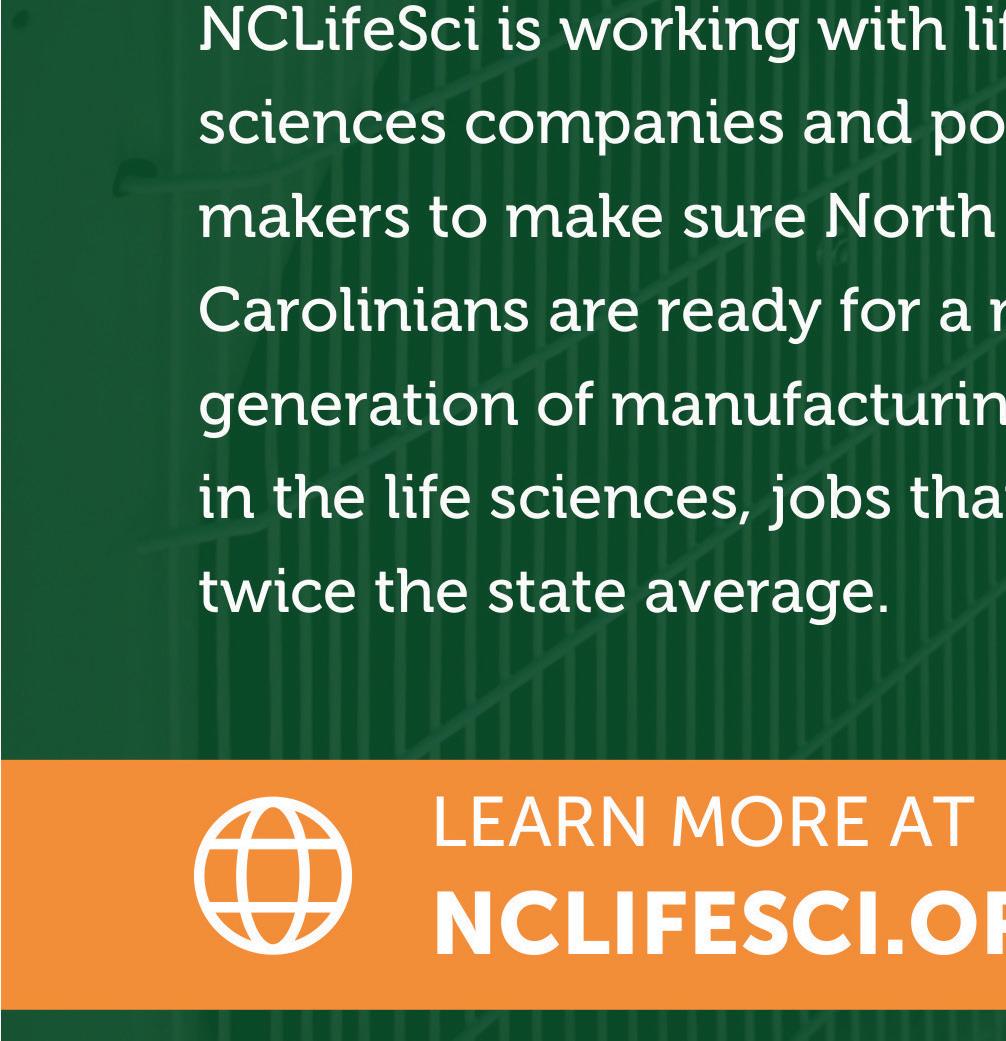





sciences for early stage companies where our regional offices are located right now. That’s another type of thing where you get the mentoring.
IS THERE AN AREA OF LIFE SCIENCES OR BIOTECH THAT THE STATE IS KIND OF LAGGING BEHIND ON OR MAYBE NEEDS MORE ATTENTION TO GROW?
PAPPAS: If you kind of look to the future, and you see what is going on with artificial intelligence, the next wave of AI is going to be quantum computing. Maryland is putting in place a huge quantum computing center to deal with the future. If you want to leapfrog that kind of technology, that is what we should address.

WHAT’S ONE THING THAT YOU’RE EXCITED ABOUT IN TERMS OF THE INDUSTRY AND WHERE IT’S HEADED IN THE NEXT FIVE TO 10 YEARS?
MONTEITH: The thing I’m excited about the most is the technology that someone just mentioned, that hasn’t really got into the approval realms yet such as cell and gene therapy. That type of thing is going to become the wave of the future
for medicine. And it hasn’t really hit the mainstream yet.
KUENZI: I think there’s a lot of opportunity and transformational things that need to be done on the backside. What can we do to shorten the time to get it to the market? What can we do to make it easier for patients to get this regionally? How can we respond to changes in a different way from the manufacturing side?
SMITH: I’m excited about the partnerships we’re creating with the industry. We do something where we bring in different companies in the industry to meet with our students to learn about their company and talk about the opportunities for advancement. I’m also excited about the educational things we’re doing with K-12 folks to talk about life sciences. I think that will pay us big

dividends with getting employees for the companies. And also, I’m excited about the point that hopefully one day all this growth won’t be in the Research Triangle Park. It’d be in rural North Carolina in Tier 1 or 2 Two counties.
PAPPAS: I’m most excited about that transformation in the state. We haven’t even talked about marine biology and what’s happening on the coast, and we haven’t talked about the agricultural side. We’re going to see some profound development that’s going to bring all sorts of different opportunities into rural areas.
BAXTER: I’m particularly excited to see the advancement of clean technology. I view clean tech as preventative maintenance for human beings. Let’s address a lot of these environmental
issues before they start impacting us personally. I think we’re about to see an inflection point of the scaling of that technology. If you look at most major corporate commitments, they typically have timelines of 2025 to 2030. There needs to be a pretty massive scale up in the supply chain in order to help them honor those commitments.
EDGETON: I’m also excited right now with some of the programs for people in all stages of their career finding a career in life

sciences in North Carolina. I think there’s opportunities and lifetimes across our state, not just here in RTP but across the state.
JORDAN: Maybe from another vantage is the proliferation of small companies that make it. We look at R&D approvals in the last several years. Most of them are coming from companies that are outside of the large pharmaceutical top 20 companies. Oftentimes it’s their first drug. The more that happens, the more it starts to carve a path to market that’ll create more leaders that know how to build small and take it to the finish line. But it’ll also create a kind of knock-on effect for other jobs because these small companies will look to outsource their manufacturing and find suppliers that can meet their needs on a nimble basis. That can create more growth and sustain this great trajectory that North Carolina is on. ■
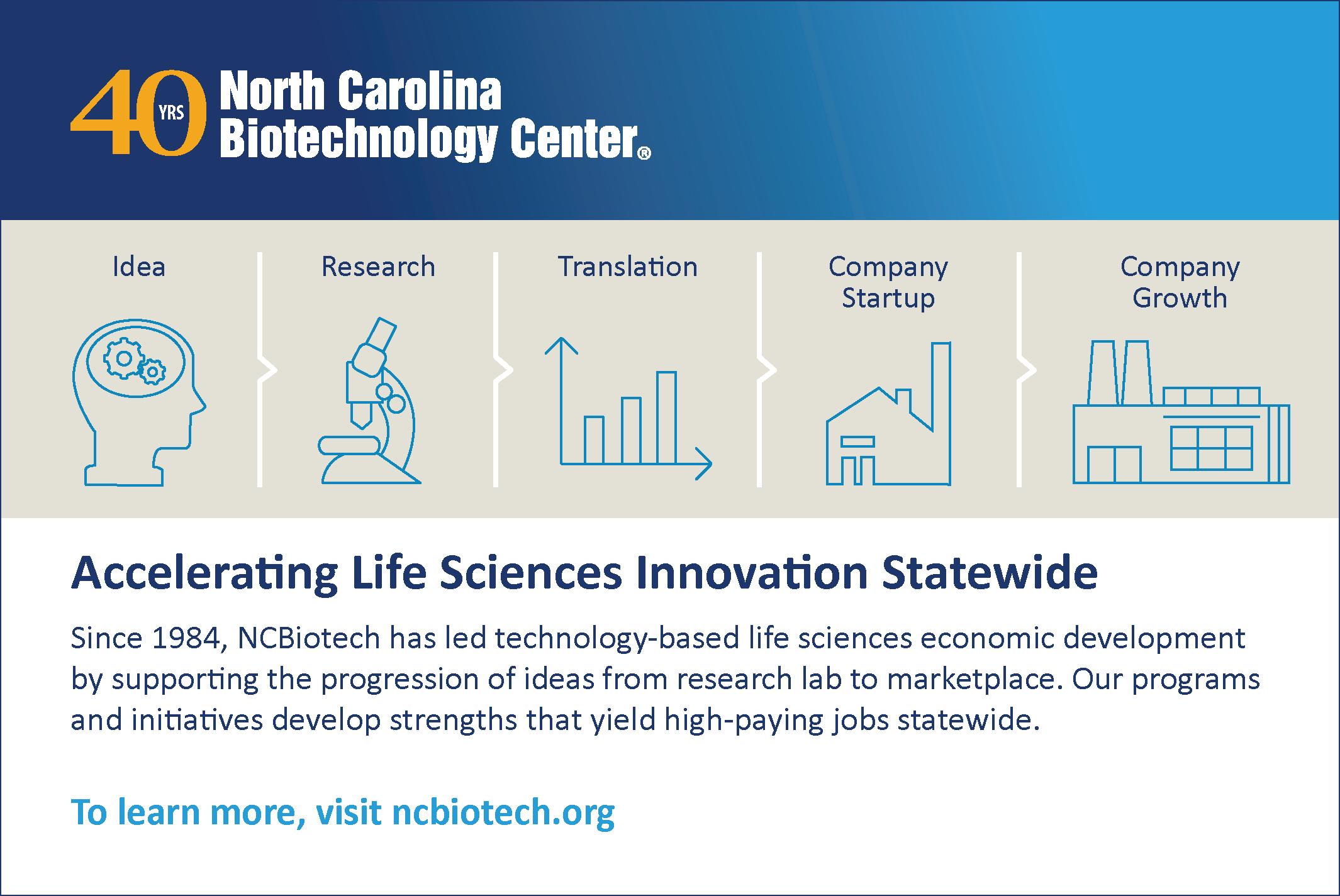



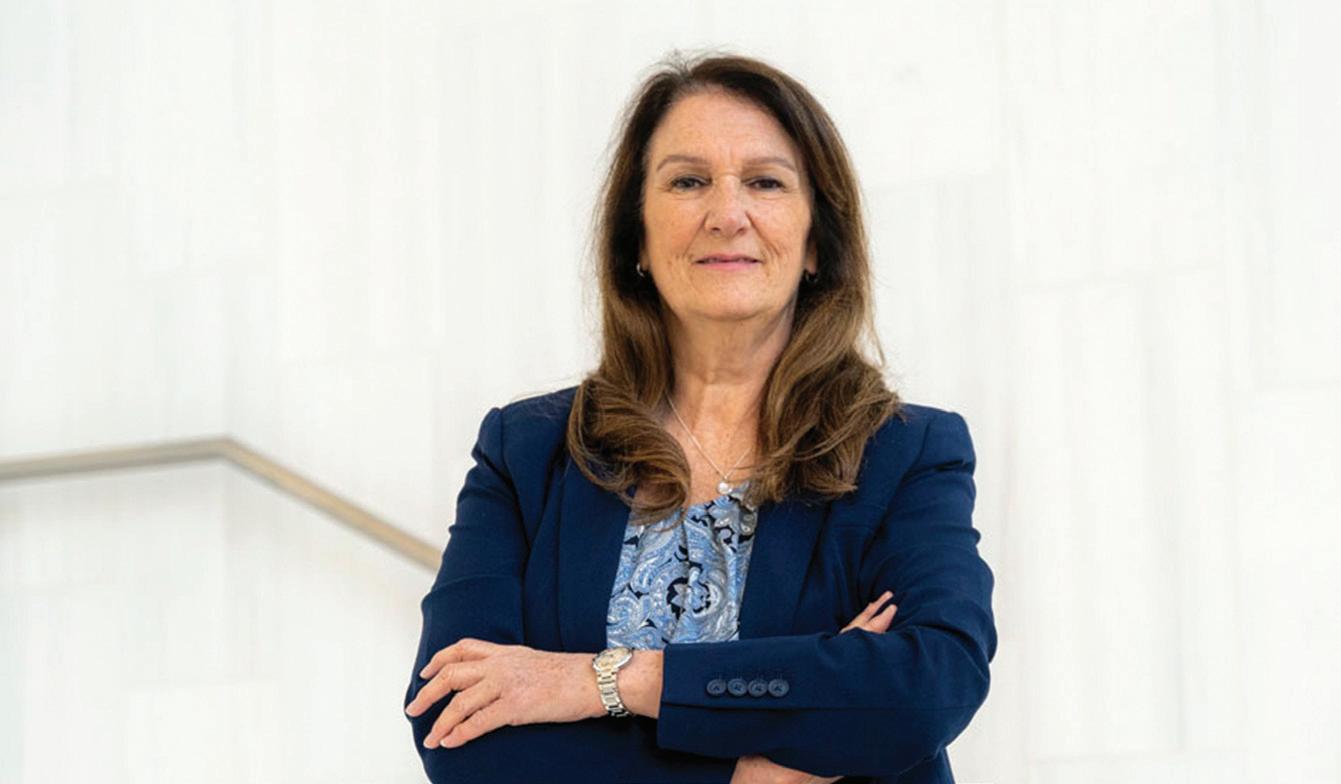
MAKING A DIFFERENCE
by Alyssa PresslerIf there’s one thing that can be learned from the group of women we profiled this year, it’s that relationships matter. Each woman emphasized the importance of prioritizing people personally and professionally as something that has contributed to their overall success, passion and happiness. In industries including higher education, law, accounting, banking and transportation, women are creating real change in their communities and for North Carolina as a whole.

A SEAT AT THE TABLE
INGRID NELSON
 MANAGING DIRECTOR
MANAGING DIRECTOR

BSA/AML/CFT/OFAC
FIRST CAROLINA BANK

Like most compliance-oriented individuals, Ingrid Nelson says she loves true crime.
She didn’t always know she would be able to turn that love into a career in protecting financial institutions and their customers and shareholders from bad actors, which is a large part of what makes her passionate about the work she now does as First Carolina Bank’s Managing Director –BSA/AML/CFT/OFAC.
But she did know a few things as she started her journey in the corporate world: she wanted to be a professional, she wanted a seat at the table and she wanted to make a difference.

She credits the mentors she had at North Carolina Central University for showing her what it meant to embody professionalism as well as those at the North Carolina Bankers Association and other groups for providing her with and pushing her to take advantage of valuable networking opportunities. A self-proclaimed introvert – though you’d never know it if you met her – getting that extra nudge “made me stronger” and allowed her to “see other individuals, especially women, in our industry who are making a difference, and I would think ‘let me network that person. What can I do to assist them, and what can they do to assist me? Can they put me in contact with somebody in their organization that shares the same interests as I do?’”
It was through one of those instances that she earned a seat at the table at First Carolina Bank a year ago, and she and her two primary counterparts – also women – hit the ground running and played a main role in guiding the Bank’s successful onboarding of a large fintech partnership. She’s particularly proud of those contributions as well as those ongoing to her field of BSA/AML at the Bank.
As for her last goal – making a difference – to Nelson, a proud Black woman in banking, it means “that this opportunity wasn’t always there. Take pride in that and accept it, do the best that you can in that role, and make room for other women coming down the line. I think that’s what’s important.”
A CAREER SET IN STONE

ROSELYN BAR
 EXECUTIVE VICE PRESIDENT GENERAL COUNSEL AND CORPORATE SECRETARY
EXECUTIVE VICE PRESIDENT GENERAL COUNSEL AND CORPORATE SECRETARY
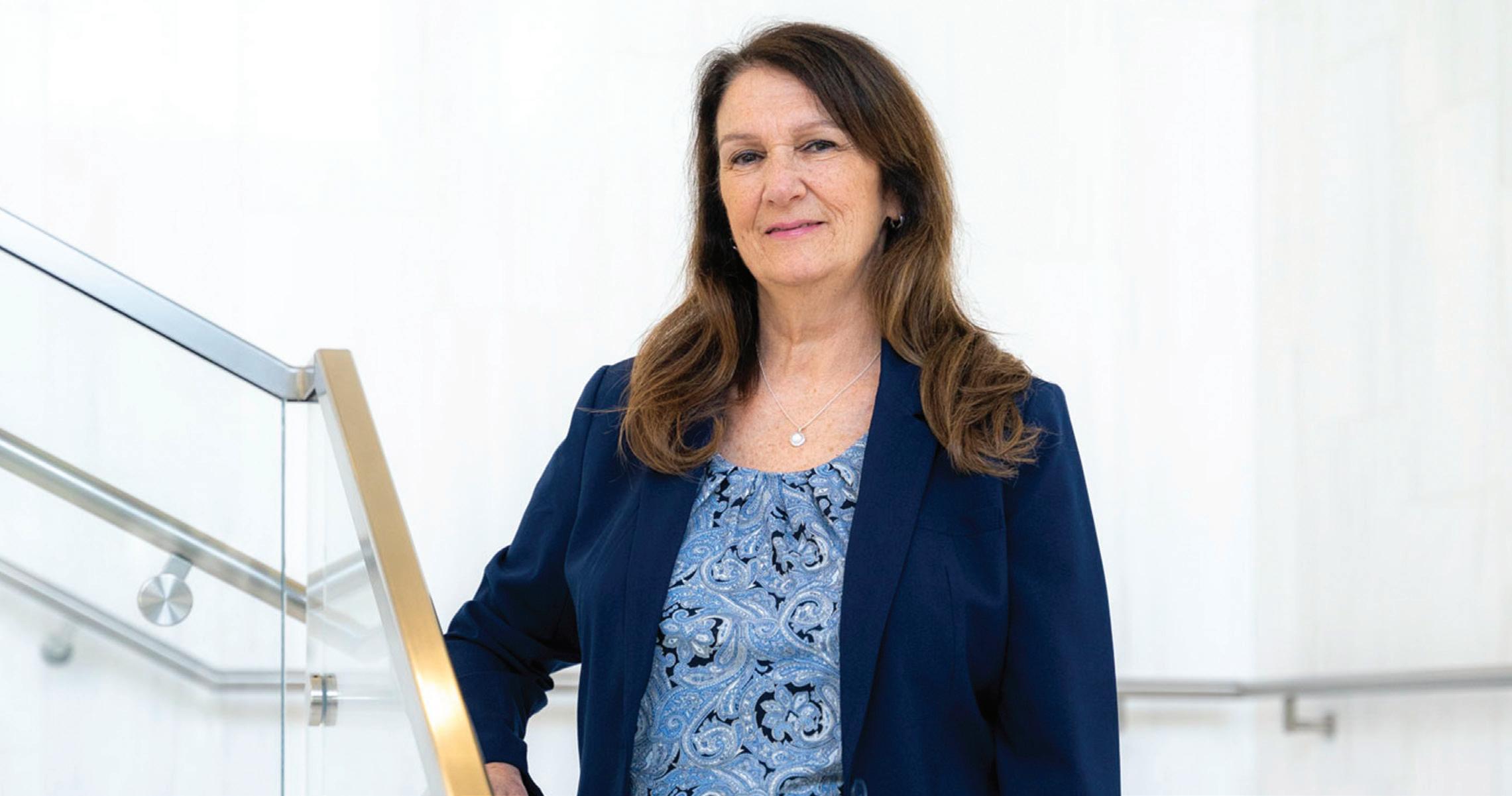
Roselyn Bar built her career on one of the Earth’s most important resources.
Now, she has a message for anyone looking to do the same: The aggregates industry is dynamic, high-growth, and a wonderful business to work in.
As the executive vice president, general counsel and corporate secretary for Martin Marietta, a publicly traded S&P 500 company and leading heavy building materials supplier headquartered in Raleigh, Bar is making an impact in the corporate world and her community. Her success wasn’t attained overnight.
She joined Martin Marietta as an assistant general counsel and assistant corporate secretary when the company went public in 1994. She then grew her career as the company made its evolution from a regional organization with less than $500 million in market cap to a nationwide enterprise with nearly 500 facilities and $37 billion in market cap.

“Some have held the view that building materials is an industry geared toward men, but that’s simply not true,” she says. “I truly believe this industry – and this company, in particular – is the hidden gem. Many people – smart and driven women among them – have found great careers at Martin Marietta.” In her position, Bar works on a wide variety of legal matters ranging from filings with the federal government to serving as the company’s chief ethics officer. She has also played an essential role in all of the company’s mergers and acquisitions.
“I’ve worked on hundreds of deals in my career – some as small as $2 million and several in excess of $2 billion,” she says. “All of these transactions have helped shape and strengthen Martin Marietta, and they were achieved without sacrificing our commitment to safety, governance, ethics and culture.” Those company values – the ones she has helped solidify during her tenure – are the same that drive her personal life.
Bar is passionate about a variety of causes and has volunteered with such organizations as Make-AWish Eastern North Carolina and American Corporate Partners, a nonprofit that helps transition servicemembers and their spouses to civilian life.
What makes her career all the more special, is that it has been built with an employer equally committed to the well-being of its communities.
Martin Marietta has supported artists, dancers and musicians by signing a multi-million-dollar agreement to name Raleigh’s Martin Marietta Center for the Performing Arts and encourages residents to engage in healthy activities by sponsoring events like the Martin Marietta City of Oaks Marathon. Earlier this year, the company was the presenting sponsor of the American Cancer Society’s Discovery Ball, which raised more than $540,000 for the nonprofit.
“Knowing that Martin Marietta plays such a vital part in helping our community thrive is incredibly rewarding,” Bar says. “Whether driving on roads and by businesses and homes built with our crushed stone, or speaking with the many who have had great careers here, it has been gratifying to see our company contribute so much to the state of North Carolina.”
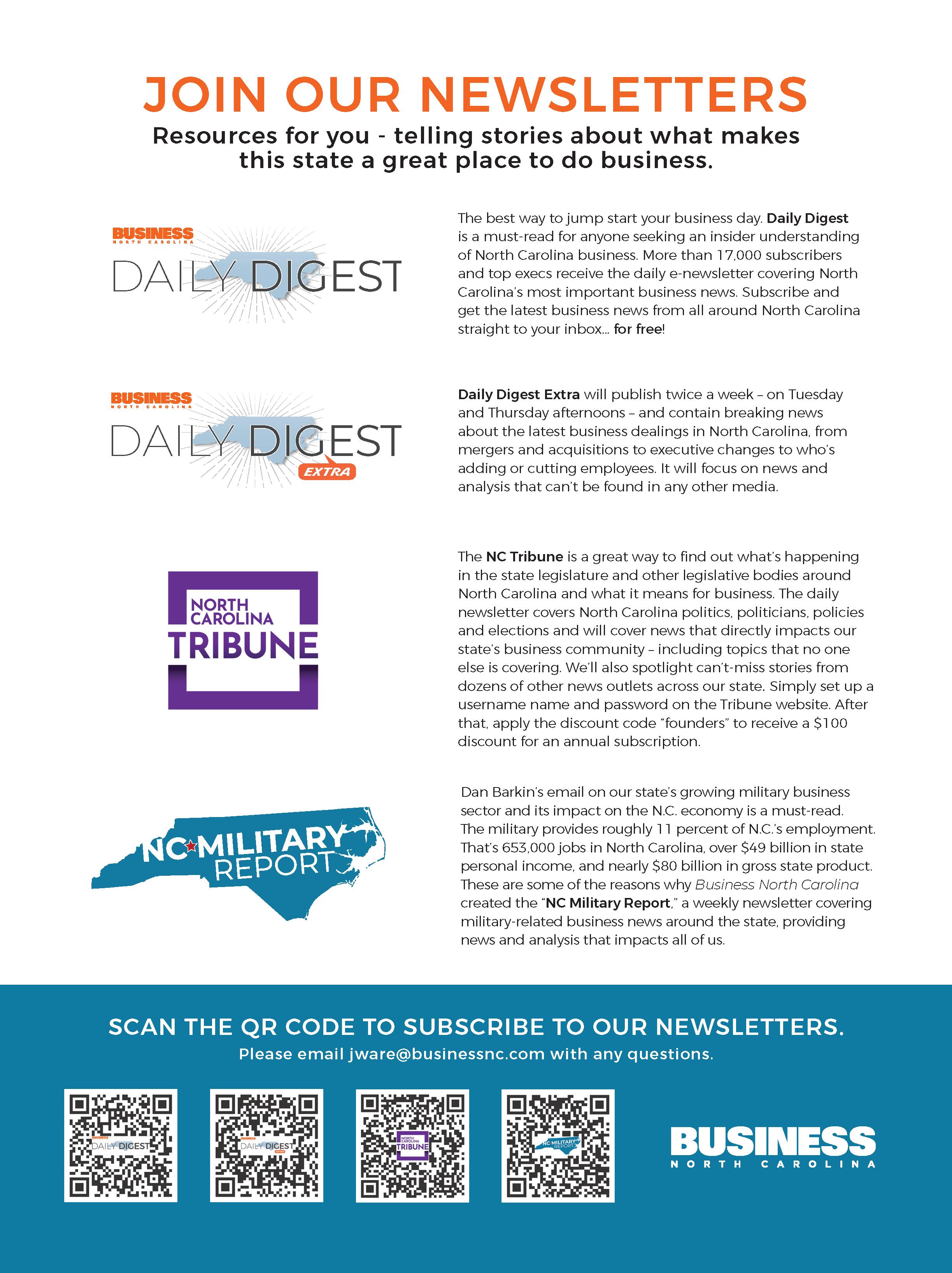


 BY PETE ANDERSON
BY PETE ANDERSON

Welcome to our annual guide to the state’s higher education sector. North Carolina has 16 public universities, with its largest, North Carolina State University in Raleigh, enrolling nearly 37,000 students. e smallest is UNC School of the Arts in WinstonSalem, which has about 1,100 students. Also, the state is home to 58 private institutions and 58 community colleges, for a total of 132 di erent institutions.
is list, compiled from data from the UNC System and the National Center for Education Statistics, looks beyond enrollment gures. It also lists overall costs, including tuition, fees and room and board, where applicable, based on the 2021-2022 school year, plus the average nancial aid awarded at each institution (based on 2020-2021 school year). For public universities, N.C. State tops the list at $24,986 for in-state students and $45,771 for students out of state. e state’s public universities haven’t raised in-state tuition for seven consecutive years, though other costs have increased.
Wake Forest University and Duke University top the private schools with estimated costs of $79,886 and $79,860, respectively. Both campuses provide average nancial aid awards of about $47,000, making them accessible to more students.
is list also describes acceptance rates; student-faculty ratios; gender ratio for full-time undergraduate students; and the percentage of diverse students, based on non-white students enrolled in the fall of 2021.


e overall retention rates refer to full-time students who began in the fall of 2020 and returned in 2021. Graduation rates track the progress of full-time students who entered school in fall 2015 to see if they completed a degree within 150% of “normal time,” typically six years. Community college statistics are for 2021-2022.
e list also provides information on the 32 colleges and universities o ering MBA programs, including online options.


PUBLIC UNIVERSITIES
Enrollment for 2021-22 school year.
APPALACHIAN STATE UNIVERSITY
BOONE, APPSTATE.EDU
Total enrollment: 20,641; undergraduate enrollment: 18,555; contact: 828-262-2120, admissions@appstate.edu; freshman applicants/ accepted: 21,120/17,952;student/faculty ratio: 17/1; (85%); total cost (in-state/out-of-state):
$20,799/$36,406; average financial aid awarded: $8,184; retention/graduation rate: 86%/73%; undergraduate male/female: 43%/57%; diverse students: 19%
EAST CAROLINA UNIVERSITY
GREENVILLE, ECU.EDU
Total enrollment: 28,021; undergraduate enrollment: 22, 463; contact: 252-328-6640, admissions@ecu.edu; freshman applicants/ accepted: 21,898/20,548 (94%); student/faculty ratio: 18/1; total cost (in-state/out-of-state):
$23,215/$39,492; average financial aid awarded: $7,604; retention/graduation rate: 81%/66%; undergraduate male/female: 41%/59%; diverse students: 37%
ELIZABETH CITY STATE UNIVERSITY*
ELIZABETH CITY, ECSU.EDU
Total enrollment: 2,054; undergraduate enrollment: 1,956; contact: 252-335-3305, admissions@ecsu. edu; freshman applicants/ accepted: 3,373/2,597 (77%); student/faculty ratio: 16/1; total cost (in-state/out-of-state): $14,425/$18,425; average financial aid awarded: $8,338; retention/graduation rate: 73%/40%; undergraduate male/female: 40%/60%; diverse students: 82%
FAYETTEVILLE STATE UNIVERSITY
FAYETTEVILLE, UNCFSU.EDU
Total enrollment: 6,748; undergraduate enrollment: 5,557; contact: 910-672-1371, admissions@uncfsu. edu; freshman applicants/accepted: 4,135/3,391 (82%);student/faculty ratio: 15/1; total cost (in-state/out-of-state): $17,626/$29,234; average financial aid awarded: $7,646; retention/graduation rate: 63%/37%; undergraduate male/female: 30%/70%; diverse students: 81%
N.C. AGRICULTURAL AND TECHNICAL STATE COLLEGE
GREENSBORO, NCAT.EDU
Total enrollment: 13,322; undergraduate enrollment: 11,596; contact: 336-334-7496, uadmit@ncat.edu; freshman applicants/accepted: 21,528/12,271 (57%); student/faculty ratio: 19/1; total cost (in-state/ out-of-state): $18,612/$32,122; average financial aid awarded: $9,180; retention/ graduation rate: 77%/53%; undergraduate male/ female: 39%/61%; diverse students: 96%
N.C. CENTRAL UNIVERSITY
DURHAM, NCCU.EDU
Total enrollment: 7,953; undergraduate enrollment: 5,892; contact: 919-530-6100, admissions@nccu. edu; freshman applicants/ accepted: 8,244/6,265 (76%); student/faculty ratio: 15/1; total cost (in-state/out-of-state): $25,160/$37,867; average financial aid awarded: $10,262; retention/ graduation rate: 74%/51%; under-graduate male/ female: 30%/70%; diverse students: 95%
N.C. STATE UNIVERSITY
RALEIGH, NCSU.EDU
Total enrollment: 36,831; undergraduate enrollment: 26,505; contact: 919-515-2011, undergradadmissions@ncsu.edu; freshman applicants/ accepted: 32,998/15,509 (47%); student/faculty ratio: 15/1; total cost (in-state/out-of-state): $24,986/$45,771; average financial aid awarded: $8,951; retention/ graduation rate: 94%/84%; undergraduate male/ female: 51%/49%; diverse students: 33%
UNC ASHEVILLE ASHEVILLE, UNCA.EDU
Total enrollment: 3,233; undergraduate enrollment: 3,233; contact: 828-251-6481, admissions@unca. edu; freshman applicants/ accepted: 4,550/3,731 (82%); student/faculty ratio: 14/1; total cost (in-state/ out-of-state): $21,231/$38,579; average financial aid awarded: $7,317; retention/graduation rate: 75%/65%; undergraduate male/female: 43%/57%; diverse students: 26%
UNC CHAPEL HILL
CHAPEL HILL, UNC.EDU
Total enrollment: 31,641; undergraduate enrollment: 19,845; contact: 919-966-3621, unchelp@admissions. unc.edu; freshman applicants/accepted: 50,729/ 10,146 (20%); student/faculty ratio: 15/1; total cost (in-state/out-of-state): $24,770/$52,633; average financial aid awarded: $16,349; retention/graduation rate: 97%/90%; undergraduate male/female: 40%/60%; diverse students: 44%
UNC CHARLOTTE
CHARLOTTE, UNCC.EDU
Total enrollment: 30,448; undergraduate enrollment: 24,166; contact: 704-687-5507, admissions@uncc. edu; freshman applicants/ accepted: 20,366/17,922 (79%); student/faculty ratio: 20/1; total cost (in-state/ out-of-state): $23,716/ $37,150; average financial aid awarded: $7,583; retention/graduation rate: 85%/66%; undergraduate male/female: 52%/48%; diverse students: 48%
UNC GREENSBORO
GREENSBORO, UNCG.EDU
Total enrollment: 19,038; undergraduate enrollment: 15,178; contact: 336-334-5243, admissions@uncg. edu; freshman applicants/accepted: 10,696/9,733 (91%); student/faculty ratio: 17/1; total cost (in-state/ out-of-state): $20,404/$35,563; average financial aid awarded: $8,501; retention/graduation rate: 78%/58%; undergraduate male/female: 33%/67%; diverse students: 59%
UNC PEMBROKE*
PEMBROKE, UNCP.EDU
Total enrollment: 8,318; undergraduate enrollment: 6,317; contact: 910-521-6262, admissions@uncp. edu; freshman applicants/accepted: 5,578/5,132 (92%); student/faculty ratio: 15/1; total cost (in-state/out-of-state): $16,195/$20,195; average financial aid awarded: $5,854; retention/graduation rate: 73%/44%; undergraduate male/female: 37%/63%; diverse students: 62%
UNC SCHOOL OF THE ARTS WINSTON-SALEM, UNCSA.EDU
Total enrollment: 1,119; undergraduate enrollment: 938; contact: 336-770-3290, admissions@ uncsa.edu; freshman applicants/accepted: 1,321/396 (30%); student/faculty ratio: 6/1; total cost (in-state/out-of-state): $24,335/$41,569; average financial aid awarded: $10,106; retention/ graduation rate: 91%/70%; undergraduate male/ female: 39%/61%; diverse students: 36%
UNC WILMINGTON WILMINGTON, UNCW.EDU
Total enrollment: 18,030; undergraduate enrollment: 14,488; contact: 910-962-3243, admissions@uncw.edu; freshman applicants/ accepted: 15,792/10,739 (68%); student/faculty ratio:16 /1; total cost (in-state/out-of-state): $25,855/$39,920; average financial aid awarded: $6,447; retention/graduation rate: 83%/72%; undergraduate male/female: 35%/65%; diverse students: 23%
WESTERN CAROLINA UNIVERSITY* CULLOWHEE, WCU.EDU
Total enrollment: 11,877; undergraduate enrollment: 10,145; contact: 828-227-7317, admiss@ email.wcu.edu; freshman applicants/ accepted: 12,308/9,723 (79%); student/faculty ratio: 15/1; total cost (in-state/out-of-state): $19,018/$23,018; average financial aid awarded: $5,652; retention/ graduation rate: 75%/61%; undergraduate male/ female: 44%/56%; diverse students: 23%
WINSTON-SALEM STATE UNIVERSITY
WINSTON-SALEM, WSSU.EDU
Total enrollment: 5,226; undergraduate enrollment: 4,726; contact: 336-750-2074, admissions@wssu. edu; freshman applicants/ accepted: 5,419/4,389 (81%);student/faculty ratio: 16/1; total cost (in-state/out-of-state): $22,603/$33,259; average financial aid awarded: $8,223; retention/graduation rate: 76%/46%; undergraduate male/female: 24%/76%; diverse students: 93%
PRIVATE INSTITUTIONS
Enrollment for 2021-22 school year.
BARTON COLLEGE
WILSON, BARTON.EDU
Total enrollment: 1,213; contact: 252-629-5472, enroll@barton.edu; freshman applicants/accepted: 1928/1909 (99%); student/ faculty ratio: 13/1; total cost: $47,750; average financial aid awarded: $22,785; retention/ graduation rate: 71%/52%; undergraduate male/female: 45%/55%; diverse students: 45%
BELMONT ABBEY COLLEGE
BELMONT, BELMONTABBEYCOLLEGE.EDU
Total enrollment: 1,517; contact: 888-222-0110, admissions@bac.edu; freshman applicants/ accepted: 1,841/1,823 (99%); student/faculty ratio: 14/1; total cost: $33,990; average financial aid awarded: $10,480; retention/graduation rate: 65%/45%; undergraduate male/female: 53%/48%; diverse students: 37%
BENNETT COLLEGE
GREENSBORO, BENNETT.EDU
Total enrollment: 207; contact: 336-370-8624, admissions@bennett.edu; freshman applicants/ accepted: 1,218/962 (79%); student/faculty ratio: 9/1; total cost: $35,872; average financial aid awarded: $14,654; retention/graduation rate: 86%/22%; undergraduate male/female: 0%/100%; diverse students: 100%
BREVARD COLLEGE
BREVARD, BREVARD.EDU
Total enrollment: 780; contact: 828-641-0641, admissions@brevard.edu; freshman applicants/ accepted: 2,232/1,004(45%); student/faculty ratio: 10/1; total cost: $44,650; average financial aid awarded: $21,916; retention/graduation rate: 67%/32%; undergraduate male/female: 59 %/41%; diverse students: 32%
CABARRUS COLLEGE OF HEALTH SCIENCES
CONCORD, ATRIUMHEALTH.ORG/ EDUCATION/CABARRUS-COLLEGE-OFHEALTH-SCIENCES
Total enrollment: 557; contact: 704-403-1556, admissions@cabarruscollege.edu; freshman applicants/accepted: 50/23 (46%); student/faculty ratio: 7/1; total cost: $31,290; average financial aid awarded: $4,826; graduation rate: 79%; undergraduate male/female: 6%/94%; diverse students: 29%
CAMPBELL UNIVERSITY
BUIES CREEK, CAMPBELL.EDU
Total enrollment: 5,622; contact: 800-334-4111, 910-893-1200, admissions@campbell.edu; freshman applicants/accepted: 4,142/3,604 (87%); student/faculty ratio: 14/1; total cost: $58,800; average financial aid awarded: $25,201; retention/ graduation rate: 74%/56%; undergraduate male/ female: 58%/52%; diverse students: 40%
CAROLINA CHRISTIAN COLLEGE
WINSTON-SALEM, CAROLINA.EDU
Total enrollment: 79; contact: 336-744-0900; student/faculty ratio: 5/1; total cost: $15,530; average financial aid awarded: $7,070; retention rate: 45%; undergraduate male/female: 54%/46%; diverse students: 98%
CAROLINA COLLEGE OF BIBLICAL STUDIES
FAYETTEVILLE, CCBS.EDU
Total enrollment: 162; contact: 910-323-5614, admissions@ccbs.edu; student/faculty ratio: 4/1; total cost: $21,943**; average financial aid awarded: $3,610; graduation rate: 25%; undergraduate male/ female: 52%/48%; diverse students: 72%
CAROLINA UNIVERSITY
WINSTON-SALEM, CAROLINAU.EDU
Total enrollment: 988; contact: 800-937-5097, admissions@carolinau.edu; freshman applicants/ accepted: 536/247 (46%); student/faculty ratio: 10/1; total cost: $27,500; average financial aid awarded: $9,586; retention/graduation rate: 68%/50%; undergraduate male/female: 49%/51%; diverse students: 47%
CATAWBA COLLEGE
SALISBURY, CATAWBA.EDU
Total enrollment: 1,207; contact: 800-CATAWBA, 704-637-4402, admission@catawba.edu; freshman applicants/accepted: 2,199/1,231 (56%); student/ faculty ratio: 11/1; total cost: $48,344; average financial aid awarded: $25,091; retention/ graduation rate: 68%/60%; undergraduate male/ female: 48%/52%; diverse students: 44%
CHAMBERLAIN UNIVERSITY NORTH
CAROLINA
CHARLOTTE, CHAMBERLAIN.EDU
Total enrollment: 251; contact: 877-751-5783; freshman applicants/accepted: 3/2 (67%); student/ faculty ratio: 11/1; total cost: $40,545; average financial aid awarded: $4,176; undergraduate male/ female: 9%/91%; diverse students: 65%
CHARLOTTE CHRISTIAN COLLEGE AND THEOLOGICAL SEMINARY
CHARLOTTE, CHARLOTTECHRISTIAN.EDU
Total enrollment: 136; contact: 704-334-6882, admissions@charlottechristian.edu; student/ faculty ratio: 5/1; total cost: $36,324; average financial aid awarded: $2,238; undergraduate male/ female: 41%/59%; diverse students: 88%
CHOWAN UNIVERSITY
MURFREESBORO, CHOWAN.EDU
Total enrollment: 981; contact: 888-4-CHOWAN, 252-398-6500, admissions@chowan.edu; freshman applicants/accepted: 1,658/1,210 (79%); student/ faculty ratio: 16/1; total cost: $38,170; average financial aid awarded: $20,106; retention/ graduation rate: 64%/29%; undergraduate male/ female: 58%/42%; diverse students: 79%
DAVIDSON COLLEGE
DAVIDSON, DAVIDSON.EDU
Total enrollment: 1,973; contact: 800-768-0380, admission@davidson.edu; freshman applicants/ accepted: 6,434/1,158 (18%); student/faculty ratio: 10/1; total cost: $73,200; average financial aid awarded: $42,825; retention/graduation rate: 95%/90%; undergraduate male/female: 47%/53%; diverse students: 35%
DEVRY UNIVERSITY
CHARLOTTE, DEVRY.EDU
Total enrollment: 29; contact: 704-697-1020; undergrad applicants/accepted: 3/2 (67%); student/faculty ratio: 3/1; total cost: $38,444; average financial aid awarded: $4,018; graduation rate: 0%; undergraduate male/female: 48%/52%; diverse students: 90%
DUKE UNIVERSITY
DURHAM, DUKE.EDU
Total enrollment: 17,620; contact: 919-684-3214, undergrad-admissions@duke.edu; freshman applicants/accepted: 49,703/ 2,928 (6%); student/ faculty ratio: 6/1; total cost: $79,860; average financial aid awarded: $46,726; retention/ graduation rate: 98%/96%; undergraduate male/ female: 48%/52%; diverse students: 60%
ECPI UNIVERSITY
CHARLOTTE, GREENSBORO, RALEIGH, ECPI.EDU
Contact: 704-751-4558 (Charlotte campus), 336-792-7594 (Greensboro campus), 919-283-5748 (Raleigh campus); total cost: $30,692**
ELON UNIVERSITY
ELON, ELON.EDU
Total enrollment: 7,127; contact: 336-278-3566, admissions@elon.edu; freshman applicants/ accepted: 17,834/13,911 (78%); student/faculty ratio: 12/1; total cost: $55,647; average financial aid awarded: $15,190; retention/graduation rate: 88%/83%; undergraduate male/female: 40%/60%; diverse students: 20%
GARDNER-WEBB
UNIVERSITY
BOILING SPRINGS, GARDNER-WEBB.EDU
Total enrollment: 3,441; contact: 704-406-2550, admissions@gardner-webb.edu; freshman applicants/accepted: 5,657/4,469 (79%); student/ faculty ratio: 11/1; total cost: $46,990; average financial aid awarded: $20,930; retention/ graduation rate: 59%/48%; undergraduate male/ female: 35%/65%; diverse students: 40%
GREENSBORO COLLEGE
GREENSBORO, GREENSBORO.EDU
Total enrollment: 875; contact: 336-272-7102, admissions@greensboro.edu; freshman applicants/accepted: 1,248/1,098 (88%); student/ faculty ratio: 10/1; total cost: $32,984; average financial aid awarded: $13,762; retention/ graduation rate: 68%/30%; undergraduate male/ female: 54%/46%; diverse students: 55%
GUILFORD COLLEGE
GREENSBORO, GUILFORD.EDU
Total enrollment: 1,167; contact: 336-316-2000, admission@guilford.edu; freshman applicants/ accepted: 3,027/2,482 (82%); student/faculty ratio: 12/1; total cost: $56,710; average financial aid awarded: $27,366; retention/graduation rate: 58%/55%; undergraduate male/female: 48%/52%; diverse students: 53%
HERITAGE BIBLE COLLEGE
DUNN, HERITAGEBIBLECOLLEGE.EDU
Total enrollment: 30; contact: 910-892-3178, ext. 236, drzonca@heritagebiblecollege.edu; student/ faculty ratio: 3/1; total cost: $23,326**; average financial aid awarded: $4,153; graduation rate: 25%; undergraduate male/female: 37%/63%; diverse students: 60%
HIGH POINT UNIVERSITY
HIGH POINT, HIGHPOINT.EDU
Total enrollment: 5,860; contact: 800-345-6993, 336-841-9000, admiss@highpoint.edu; freshman applicants/accepted: 11,150/8,920 (80%); student faculty ratio: 17/1; total cost: $59,408; average financial aid awarded: $15,793; retention/ graduation rate: 82%/70%; undergraduate male/ female: 44%/56%; diverse students: 24%
JOHNSON & WALES
UNIVERSITY
CHARLOTTE, JWU.EDU/CAMPUSES/ CHARLOTTE
Total enrollment: 1,262; contact: 866-598-2427, 980-598-1100, clt@admissions.jwu.edu; freshman applicants/accepted: 4,480/3,674 (82%); student/ faculty ratio: 15/1; total cost: $54,540; average financial aid awarded: $22,910; retention/ graduation rate: 64%/54%; undergraduate male/ female: 35%/65%; diverse students: 67%
JOHNSON C. SMITH UNIVERSITY
CHARLOTTE, JCSU.EDU
Total enrollment: 1,166; contact: 704-378-1010, admissions@jcsu.edu; freshman applicants/ accepted: 2,634/1,185 (45%); student/ faculty ratio: 9/1; total cost: $33,444; average financial aid awarded: $12,585; retention/ graduation rate: 57%/39%; undergraduate male/female: 43%/57%; diverse students: 99%
LEES-MCRAE COLLEGE
BANNER ELK, LMC.EDU
Total enrollment: 873; contact: 828-898-5241, admissions@lmc.edu; freshman applicants/ accepted: 1,777/1,048 (59%); student/faculty ratio: 11/1; total cost: $42,640; average financial aid awarded: $17,200; retention/graduation rate: 67%/40%; undergraduate male/female: 35%/65%; diverse students: 26%
LENOIR-RHYNE UNIVERSITY
ASHEVILLE, HICKORY, LR.EDU
Total enrollment: 2,405; contact: 828-328-1741, admission@lr.edu; freshman applicants/accepted: 4,847/4,168 (86%); student/faculty ratio: 12/1; total cost: $58,910; average financial aid awarded: $30,882; retention/graduation rate: 62%/48%; undergraduate male/female: 42%/58%; diverse students: 34%
LIVING ARTS COLLEGE
RALEIGH, LIVING-ARTS-COLLEGE.EDU
Total enrollment: 203; contact: 919-488-8504, info@living-arts-college.edu; freshman applicants/ accepted: 58/27 (47%); student/faculty ratio: 6/1; total cost: $31,782; average financial aid awarded: $7,123; retention/ graduation rate: 57%/46%; undergraduate male/female: 45%/55%; diverse students: 74%
LIVINGSTONE COLLEGE
SALISBURY, LIVINGSTONE.EDU
Total enrollment: 890; contact: 800-835-3435, 704-216-6001, admissions@livingstone.edu; freshman applicants/accepted: 3,811/1,944 (51%); student/faculty ratio: 13/1; total cost: $28,390; average financial aid awarded: $12,726; retention/ graduation rate: 58%/23%; undergraduate male/ female: 55%/45%; diverse students: 99%
LOUISBURG COLLEGE
LOUISBURG, LOUISBURG.EDU
Total enrollment: 501; contact: 919- 496-2521, admissions@louisburg.edu; freshman applicants/ accepted: 570/467 (82%); student/ faculty ratio: 16/1; total cost: $35,630; average financial aid awarded: $13,777; retention/ graduation rate: 47%/73%; undergraduate male/female: 74%/26%; diverse students: 80%
MANNA UNIVERSITY
FAYETTEVILLE, MANNA.EDU
Total enrollment: 235; contact: 910-221-2224, admissions@manna.edu; freshman applicants/ accepted: 22/21 (95%); student/faculty ratio: 10/1; total cost: $22,280; average financial aid awarded: $5,581; retention/graduation rate: 33%/75%; undergraduate male/female: 54%/46%; diverse students: 43%
MARS HILL UNIVERSITY
MARS HILL, MHU.EDU
Total enrollment: 1,073; contact: 828-689-1201, admissions@mhu.edu; freshman applicants/ accepted: 1,713/1,370 (80%); student/faculty ratio: 9/1; total cost: $47,489; average financial aid awarded: $25,668; retention/graduation rate: 74%/34%; undergraduate male/female: 49%/51%; diverse students: 37%
MEREDITH COLLEGE
RALEIGH, MEREDITH.EDU
Total enrollment: 1,711; contact: 919-760-8581, admissions@meredith.edu; freshman applicants/ accepted: 1,706/1,194(70%); student/faculty ratio: 10/1; total cost: $56,034; average financial aid awarded: $27,823; retention/ graduation rate: 82%/68%; undergraduate male/female: 0%/100%; diverse students: 35%
METHODIST UNIVERSITY FAYETTEVILLE,
METHODIST.EDU
Total enrollment: 1,916; contact: 800-488-7110, 910-630-7000, admissions@methodist.edu; freshman applicants/accepted: 2,964/2,302 (79%); student/faculty ratio: 10/1; total cost: $55,938; average financial aid awarded: $23,657; retention/ graduation rate: 62%/37%; undergraduate male/ female: 55%/45%; diverse students: 55%
MID-ATLANTIC CHRISTIAN UNIVERSITY
ELIZABETH CITY, MACUNIVERSITY.EDU
Total enrollment: 145; contact: 252-334-2000 ext. 3013, admissions@macuniversity.edu; freshman applicants/accepted: 250/120 (48%); student/faculty ratio: 7/1; total cost: $32,240; average financial aid awarded: $10,329; retention/ graduation rate: 48%/38%; undergraduate male/ female: 63%/37%; diverse students: 43%
MILLER-MOTTE COLLEGE
FAYETTEVILLE, MILLER-MOTTE.EDU
Total enrollment: 259; contact: 910-238-3077; total cost: $59,244**; average financial aid awarded: $4,687; student/faculty ratio: 21/1; retention/ graduation rate: 74%/63%; undergraduate male/ female: 34%/66%; diverse students: 87%
MILLER-MOTTE COLLEGE
JACKSONVILLE, MILLER-MOTTE.EDU
Total enrollment: 175; contact: 910-778-9304; total cost: $61,511**;average financial aid awarded: $4,993; student/faculty ratio: 19/1; retention/ graduation rate: 68%/66%; undergraduate male/ female: 29%/71%; diverse students: 57%
MILLER-MOTTE COLLEGE
RALEIGH, MILLER-MOTTE.EDU
Total enrollment: 225; contact: 919-230-6471; total cost: $59,244**; average financial aid awarded: $4,523; student/faculty ratio: 16/1; retention/ graduation rate: 45%/57%; undergraduate male/ female: 19%/81%; diverse students: 88%
MILLER-MOTTE COLLEGE
Total enrollment: 1,860; contact: 910-632-5542; student/faculty ratio: 35/1; total cost: $59,244**; average financial aid awarded: $4,607; graduation rate: 13%; undergraduate male/female: 19%/81%; diverse students: 65%
MONTREAT COLLEGE
MONTREAT, BLACK MOUNTAIN, MONTREAT.EDU
Total enrollment: 1,013; contact: 828-669-8012, admissions@montreat.edu; freshman applicants/ accepted: 1,465/1,319 (90%); student/ faculty ratio: 13/1; total cost: $43,240; average financial aid awarded: $25,893; retention/ graduation rate: 77%/29%; undergraduate male/female: 55%/45%; diverse students: 47%
NORTH CAROLINA WESLEYAN COLLEGE
ROCKY MOUNT, NCWC.EDU
Total enrollment: 1,531; contact: 252-985-5200, 800-488-6292, admissions@ncwc.edu; freshman applicants/accepted: 2,220/622 (28%); student/ faculty ratio: 12/1; total cost: $47,789; average financial aid awarded: $20,538; retention/ graduation rate: 66%/31%; undergraduate male/ female: 48%/52%; diverse students: 74%
NORTHEASTERN UNIVERSITY
CHARLOTTE, ONLINE, NORTHEASTERN. EDU/CHARLOTTE
Total enrollment: 15,747; contact: 980.224.8467, S.Edwards@northeastern.edu; freshman applicants/accepted: 75, 244/13544 (18%); student/faculty ratio: 15/1; total cost: $78,202; average financial aid awarded: $30,084; retention/ graduation rate: 97%/91%; undergraduate male/ female: 46%/54%; diverse students: 57%
PFEIFFER UNIVERSITY
MISENHEIMER, CHARLOTTE, RALEIGH DURHAM, PFEIFFER.EDU
Total enrollment: 1,067; contact: Misenheimer campus — 800-338-2060, Charlotte, RaleighDurham campuses — 704-521-9116, admissions@ pfeiffer.edu; freshman applicants/accepted: 1,335/961(72%); student/faculty ratio: 11/1; total cost: $48,254; average financial aid awarded: $26,259; retention/graduation rate: 69%/34%; undergraduate male/female: 42%/58%; diverse students: 42%
QUEENS
UNIVERSITY
OF CHARLOTTE
CHARLOTTE, QUEENS.EDU
Total enrollment: 2,063; contact: 704-337-2212, admissions@queens.edu; freshman applicants/ accepted: 3,503/2,417 (69%); student/faculty ratio: 9/1; total cost: $55,498; average financial aid awarded: $19,100; retention/graduation rate: 69%/64%; undergraduate male/female: 26%/64%; diverse students: 47%
SAINT AUGUSTINE’S UNIVERSITY
RALEIGH, ST-AUG.EDU
Total enrollment: 1,261; contact: 919-516-4012, 919-516-4018, admissions@st-aug.edu; freshman applicants/accepted: 5,633/4,225 (75%); student/ faculty ratio: 12/1; total cost: $32,118; average financial aid awarded: $12,175; retention/ graduation rate: 77%/22%; undergraduate male/ female: 57%/43%
SALEM COLLEGE
WINSTON-SALEM, SALEM.EDU
Total enrollment: 496; contact: 336-721-2621, admissions@salem.edu; freshman applicants/ accepted: 479/431 (90%); student/faculty ratio: 15/1; total cost: $49,466; average financial aid awarded: $20,519; retention/graduation rate: 62%/67%; undergraduate male/female: 2%/98%; diverse students: 51%
SHAW UNIVERSITY
RALEIGH, SHAWU.EDU
Total enrollment: 1,141; admissions contact: 800214-6683, 919-546-8275, admissions@shawu.edu; freshman applicants/accepted: 2,435/1,583 (65%); student/faculty ratio: 15/1; total cost: $29,734; average financial aid awarded: $13,491; graduation/ retention rate: 58%/16%; undergraduate male/ female: 43%/57%; diverse students: 98%
SOUTHEASTERN BAPTIST THEOLOGICAL SEMINARY
Total enrollment: 3,048; contact: 919-761-2100, admissions@sebts.edu; freshman applicants/ accepted: 89/80 (90%); student/faculty ratio: 9/1; total cost: $25,838; average financial aid awarded: $7,722; retention/graduation rate: 86%/51%; undergraduate male/female: 61%/39%; diverse students: 18%
SOUTHEASTERN FREE WILL BAPTIST BIBLE COLLEGE
WENDELL, SFWBC.EDU
Total enrollment: 61; contact: 919-365-7711, info@sfwbc.edu; student/ faculty ratio: 7/1; total cost: $20,203; average financial aid awarded: $3,849; retention/ graduation rate: 77%/47%; undergraduate male/female: 57%/43%; diverse students: 13%
ST. ANDREWS UNIVERSITY
LAURINBURG, SA.EDU
Total enrollment: 911; contact: 910-277-5555, admissions@sa.edu; freshman applicants/ accepted: 2,164/260 (12%); student/ faculty ratio: 14/1; total cost: $49,100; average financial aid awarded: $17,872; retention/ graduation rate: 60%/31%; undergraduate male/female: 46%/54%; diverse students: 69%
STRAYER UNIVERSITY NORTH CAROLINA
CHARLOTTE, CONCORD, GREENSBORO, HUNTERSVILLE, MORRISVILLE, RALEIGH, STRAYERUNIVERSITY.EDU
Total enrollment: 3,536; contact: Greensboro –336-315-7800, virtualadvising@strayer.edu, North Charlotte campus – 704-886-6500, South Charlotte campus – 704-499-9200; North Raleigh campus – 919-301-6500; South Raleigh campus –919-890-7500; student/faculty ratio: 27/1; total cost: $23,985**; average financial aid awarded: $4,994; retention rate: 50%; undergraduate male/female: 16%/84%; diverse students: 81%
UNIVERSITY OF MOUNT OLIVE MOUNT OLIVE, DURHAM, GOLDSBORO, SMITHFIELD, UMO.EDU
Total enrollment: 2,288; contact: 919-658-7794, admissions@umo.edu; freshman applicants/ accepted: 1,676/1,391 (83%); student/faculty ratio: 14/1; total cost: $35,138; average financial aid awarded: $11,533; retention/graduation rate: 62%/47%; undergraduate male/female: 34%/66%; diverse students: 46%

WAKE FOREST UNIVERSITY
WINSTON-SALEM, WFU.EDU
Total enrollment: 8,947; contact: 336.758.5201, admissions@wfu.edu; freshman applicants/ accepted: 15,156/3,789 (25%); student/faculty ratio: 10/1; total cost: $79,886; average financial aid awarded: $46,814; retention/graduation rate: 94%/90%; undergraduate male/female: 46%/54%; diverse students: 32%
WARREN WILSON COLLEGE
SWANNANOA, WARREN-WILSON.EDU
Total enrollment: 803; contact: 800-934-3536, admit@warren-wilson.edu; freshman applicants/ accepted: 1,146/883 (77%); student/faculty ratio: 9/1; total cost: $54,080; average financial aid awarded: $27,459; retention/ graduation rate: 66%/39%; undergraduate male/female: 34%/66%; diverse students: 25%
WATTS SCHOOL OF NURSING
DURHAM, WATTSSCHOOLOFNURSING.ORG
Total enrollment: 144; contact: 919-470-7348, wsninfo@duke.edu; student/faculty ratio: 10/1; total cost: $21,322; average financial aid awarded: $5,768; undergraduate male/female: 9%/91%; diverse students: 41%
WESTERN GOVERNORS UNIVERSITY
DURHAM, ONLINE, WGU.EDU/NORTHCAROLINA
Total enrollment: 150,116; contact: 866-903-0109; student/faculty ratio: 42/1; total cost: $14,652**; average financial aid awarded: $4,203; retention/ graduation rate: 63%/64%; undergraduate male/ female: 38%/62%; diverse students: 41%
WILLIAM PEACE UNIVERSITY
RALEIGH, PEACE.EDU
Total enrollment: 742; contact: 919-508-2214, admissions@peace.edu; freshman applicants/ accepted: 1,223/636 (52%); student/faculty ratio: 11/1; total cost: $49,183; average financial aid: $19,602; retention/graduation rate: 77%/42%; undergraduate male/female: 46%/54%; diverse students: 49%
WINGATE UNIVERSITY
WINGATE, CHARLOTTE, HENDERSONVILLE, WINGATE.EDU
Total enrollment: 3,439; contact: 704-233-8200, admit@wingate.edu; freshman applicants/ accepted: 17,662/15,013 (85%); student/faculty ratio: 15/1; total cost: $55,780; average financial aid: $31,478; retention/graduation rate: 64%/61%; undergraduate male/female: 41%/59%; diverse students: 53%
COMMUNITY COLLEGES
Enrollment for 2021-22 school year.
ALAMANCE COMMUNITY COLLEGE
BURLINGTON, GRAHAM, ALAMANCECC.EDU
Enrollment: 3,789; contact: 336-506-4270 , admissions@alamancecc.edu; student/ faculty ratio: 13/1; undergraduate male/female: 29%/61%; diverse students: 46%
ASHEVILLE-BUNCOMBE TECHNICAL COMMUNITY COLLEGE
ARDEN, ASHEVILLE, CANDLER, MARSHALL, WOODFIN, ABTECH.EDU
Enrollment: 6,270; contact: 828-398-7900, admissions@abtech.edu; student/faculty ratio: 12/1; undergraduate male/female: 37%/63%; diverse students: 26%
BEAUFORT COUNTY COMMUNITY COLLEGE
WASHINGTON, BEAUFORTCCC.EDU
Enrollment: 1,627; contact: 252-940-6237, admissions@beaufortccc.edu; student/faculty ratio: 10/1; undergraduate male/female: 32%/63%; diverse students: 45%
BLADEN COMMUNITY COLLEGE
DUBLIN, BLADENCC.EDU
Enrollment: 1,016; contact: 910-879-5584, bccadvising@bladencc.edu; student/faculty ratio: 9/1; undergraduate male/female: 30%/70%; diverse students: 55%
BLUE RIDGE COMMUNITY COLLEGE
BREVARD, FLAT ROCK, HENDERSONVILLE, BLUERIDGE.EDU
Enrollment: 2,635; contact: Transylvania County campus — 828-883-2520, Henderson County campus — 828-694-1800, admissions@blueridge. edu; student/faculty ratio: 14/1; undergraduate male/female: 38%/62%; diverse students: 27%
BRUNSWICK COMMUNITY COLLEGE
BOLIVIA, LELAND, SOUTHPORT, SUPPLY, BRUNSWICKCC.EDU
Enrollment: 1,678; contact: 910-755-7374, blandg@ brunswickcc.edu; student/faculty ratio: 12/1; undergraduate male/female: 38%/62%; diverse students: 30%
CALDWELL COMMUNITY COLLEGE AND TECHNICAL INSTITUTE
BOONE, HUDSON, CCCTI.EDU
Enrollment: 3,550; contact: Caldwell campus — 828-726-2200, Watauga campus — 828-297-3811, ccctiadmissions@cccti.edu; student/faculty ratio: 18/1; undergraduate male/female: 40%/60%; diverse students: 22%
CAPE FEAR COMMUNITY COLLEGE
BURGAW, CASTLE HAYNE, HAMPSTEAD, WILMINGTON, CFCC.EDU
Enrollment: 13,059; contact: 910-362-7000, admissions@cfcc.edu; student/faculty ratio: 14/1; undergraduate male/female: 48%/52%; diverse students: 31%
CARTERET COMMUNITY COLLEGE
MOREHEAD CITY, CARTERET.EDU
Enrollment: 1,535; contact: 252-222-6154, johnsona@email.carteret.edu; student/faculty ratio: 11/1; undergraduate male/female: 32%/68%; diverse students: 24%
CATAWBA VALLEY COMMUNITY COLLEGE
CONOVER, HICKORY, NEWTON, TAYLORSVILLE, CVCC.EDU
Enrollment: 4,168; contact: 828-327-7000, ext. 4216, admissions@cvcc.edu; student/faculty ratio: 11/1; undergraduate male/female: 42%/58%; diverse students: 34%
CENTRAL CAROLINA COMMUNITY COLLEGE
DUNN, LILLINGTON, PITTSBORO, SANFORD, SILER CITY, CCCC.EDU
Enrollment: 4,871; contact: Chatham County — 919-545-8000, Harnett County — 910-893-9101, Lee County — 919-775-5401; enroll@cccc.edu; student/ faculty ratio: 12/1; undergraduate male/ female: 35%/65%; diverse students: 47%
CENTRAL PIEDMONT COMMUNITY COLLEGE
CHARLOTTE, HUNTERSVILLE, MATTHEWS, CPCC.EDU
Enrollment: 17,694; contact: 704-330-2722 ext. 6733, andrea.abercrombie@cpcc.edu; student/faculty ratio: 16/1; undergraduate male/female: 41%/59%; diverse students: 58%

CLEVELAND COMMUNITY COLLEGE
SHELBY, CLEVELANDCC.EDU
Enrollment: 2,425; contact: 704-669-4081, admissions@clevelandcc.edu; student/faculty ratio: 15/1; undergraduate male/female: 37%/63%; diverse students: 33%
COASTAL CAROLINA COMMUNITY COLLEGE
JACKSONVILLE, COASTALCAROLINA.EDU
Enrollment: 3,571; contact: 910-938-6394, admissions@coastalcarolina.edu; student/faculty ratio: 14/1; undergraduate male/female: 36%/64%; diverse students: 42%
COLLEGE OF THE ALBEMARLE BARCO, EDENTON, ELIZABETH CITY, MANTEO, ALBEMARLE.EDU
Enrollment: 2,255; contact: 252-335-0821, ext. 0, admissions@albemarle.edu; student/faculty ratio: 13/1; undergraduate male/female: 34%/66%; diverse students: 35%
CRAVEN COMMUNITY COLLEGE
HAVELOCK, NEW BERN, CRAVENCC.EDU
Enrollment: 2,713; contact: New Bern campus — 252-638-7200, Havelock campus — 252-4446005; admissions@cravencc.edu; student/faculty ratio: 12/1; undergraduate male/female: 41%/59%; diverse students: 40%
DAVIDSON-DAVIE COMMUNITY COLLEGE
BERMUDA RUN, LEXINGTON, MOCKSVILLE, THOMASVILLE, DAVIDSONDAVIE.EDU
Enrollment: 3,636; contact: 336-249-8186, admissions@davidsondavie.edu; student/faculty ratio: 17/1; undergraduate male/female: 34%/66%; diverse students: 29%
DURHAM TECHNICAL COMMUNITY COLLEGE
DURHAM, HILLSBOROUGH, DURHAMTECH.EDU
Enrollment: 4,119; contact: 919-536-7200, admissions@durhamtech.edu; student/faculty ratio: 7/1; undergraduate male/female: 37%/63%; diverse students: 67%
EDGECOMBE COMMUNITY COLLEGE
ROCKY MOUNT, TARBORO, EDGECOMBE.EDU
Enrollment: 1,508; contact: 252-823-5166, admissions@edgecombe.edu; student/faculty ratio: 10/1; undergraduate male/female: 22%/78%; diverse students: 63%
FAYETTEVILLE TECHNICAL COMMUNITY COLLEGE
FAYETTEVILLE, FORT BRAGG, SPRING LAKE, FAYTECHCC.EDU
Enrollment: 9,790; contact: 910-678-8400, admissions@faytechcc.edu; student/faculty ratio: 15/1; undergraduate male/female: 37%/63%; diverse students: 63%
FORSYTH TECHNICAL COMMUNITY COLLEGE
KERNERSVILLE, KING, WALNUT COVE, WINSTON-SALEM, FORSYTHTECH.EDU
Enrollment: 7,774; contact: 336-723-0371, admissions@forsythtech.edu; student/faculty ratio: 11/1; undergraduate male/female: 36%/64%; diverse students: 51%
GASTON COLLEGE
BELMONT, DALLAS, LINCOLNTON, GASTON.EDU
Enrollment: 4,953; contact: 704-922-6200, admissions@gaston.edu; student/faculty ratio: 13/1; undergraduate male/female: 35%/65%; diverse students: 36%
GUILFORD TECHNICAL COMMUNITY COLLEGE
COLFAX, GREENSBORO, HIGH POINT, JAMESTOWN, GTCC.EDU
Enrollment: 9,960; contact: 336-334-4822, ext. 31125, admissions@gtcc.edu; student/faculty ratio: 17/1; undergraduate male/female: 41%/59%; diverse students: 58%
HALIFAX COMMUNITY COLLEGE
WELDON, HALIFAXCC.EDU
Enrollment: 943; contact: 252-536-2551, admissions@halifaxcc.edu; student/faculty ratio: 11/1; undergraduate male/female: 32%/68%; diverse students: 59%
HAYWOOD COMMUNITY COLLEGE
CLYDE, HAYWOOD.EDU
Enrollment: 1,318; contact: 828-627-4500, enrollment@haywood.edu; student/faculty ratio: 6/1; undergraduate male/female: 36%/64%; diverse students: 19%
ISOTHERMAL COMMUNITY COLLEGE
COLUMBUS, RUTHERFORDTON, SPINDALE, ISOTHERMAL.EDU
Enrollment: 1,913; contact: 828-286-3636, admissions@isothermal.edu; student/faculty ratio: 12/1; undergraduate male/female: 36%/64%; diverse students: 28%
JAMES SPRUNT COMMUNITY COLLEGE
KENANSVILLE, JAMESSPRUNT.EDU
Enrollment: 1,320; contact: 910-275-6364, wedwards@jamessprunt.edu; student/faculty ratio: 9/1; undergraduate male/female: 31%/69%; diverse students: 57%
JOHNSTON COMMUNITY COLLEGE
CLAYTON, FOUR OAKS, SMITHFIELD, JOHNSTONCC.EDU
Enrollment: 4,049; contact: 919-209-2128, jccadmissions@johnstoncc.edu; student/faculty ratio: 10/1; undergraduate male/female: 36%/64%; diverse students: 36%
LENOIR COMMUNITY COLLEGE
KINSTON, LA GRANGE, PINK HILL, SNOW HILL, TRENTON, LENOIRCC.EDU
Enrollment: 2,348; contact: 252-527-6223, dostroud89@lenoircc.edu, dostroud89@lenoircc. edu; student/faculty ratio: 10/1; undergraduate male/female: 36%/64%; diverse students: 49%
MARTIN COMMUNITY COLLEGE WILLIAMSTON, WINDSOR, MARTINCC.EDU
Enrollment: 856; contact: 252-782-1521, admissions@martincc.edu; student/ faculty ratio: 10/1; undergraduate male/female: 32%/68%; diverse students: 51%
MAYLAND COMMUNITY COLLEGE
BURNSVILLE, NEWLAND, SPRUCE PINE, MAYLAND.EDU
Enrollment: 863; contact: 828-765-7351, admissions@mayland.edu; student/faculty ratio: 15/1; undergraduate male/female: 43%/57%; diverse students: 11%
MCDOWELL TECHNICAL COMMUNITY COLLEGE
MARION, MCDOWELLTECH.EDU
Enrollment: 1,135; contact: 828-659-0444, 828-6520622, admissions@go.mcdowelltech.edu; student/ faculty ratio: 7/1; undergraduate male/female: 39%/61%; diverse students: 20%
MITCHELL COMMUNITY COLLEGE
MOORESVILLE, STATESVILLE, MITCHELLCC.EDU
Enrollment: 3,289; contact: 704-978-5493, admissions@mitchellcc.edu; student/faculty ratio: 18/1; undergraduate male/female: 39%/61%; diverse students: 32%
MONTGOMERY COMMUNITY COLLEGE
TROY, MONTGOMERY.EDU
Enrollment: 712; contact: 910-8989617, lathamj1472@montgomery.edu.; student/ faculty ratio: 9/1; undergraduate male/female: 48%/52%; diverse students: 45%
NASH COMMUNITY COLLEGE ROCKY MOUNT, NASHCC.EDU
Enrollment: 2,874; contact: 252-451-8263, admissions@nashcc.edu; student/faculty ratio: 20/1; undergraduate male/female: 40%/60%; diverse students: 48%
PAMLICO COMMUNITY COLLEGE
BAYBORO, GRANTSBORO, PAMLICOCC. EDU
Enrollment: 307; contact: 252-249-1851, ext. 3014, cwarner@pamlicocc.edu; student/ faculty ratio: 3/1; undergraduate male/female: 28%/72%; diverse students: 40%
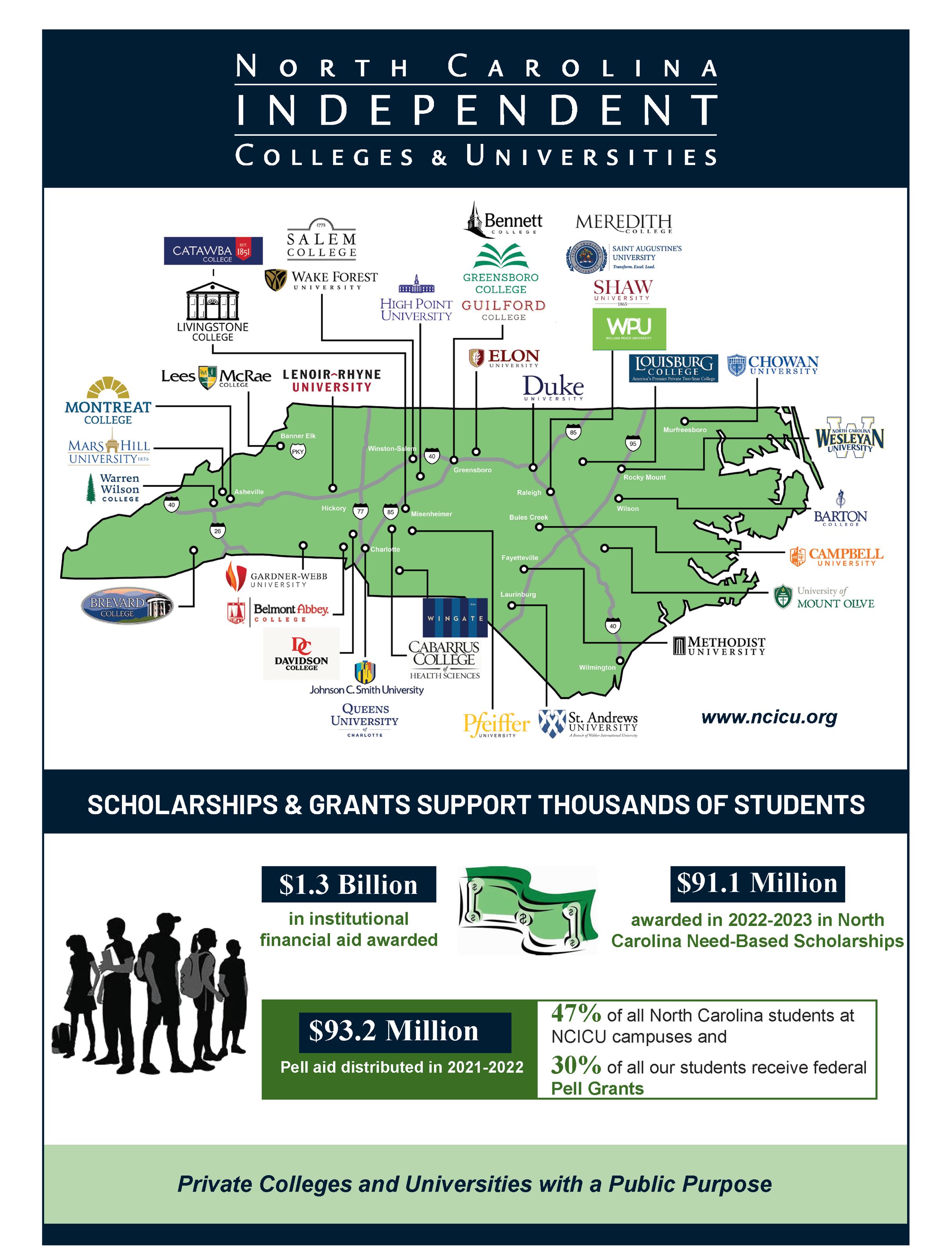
PIEDMONT COMMUNITY COLLEGE
ROXBORO, YANCEYVILLE, PIEDMONTCC. EDU
Enrollment: 1,187; contact: Person County — 336599-1181, Caswell County — 336-694-5707; student/ faculty ratio: 9/1; undergraduate male/female: 38%/62%; diverse students: 39%
PITT COMMUNITY COLLEGE
WINTERVILLE, PITTCC.EDU
Enrollment: 7,346; contact: 252-493-7245, registrar@my.pittcc.edu; student/faculty ratio: 15/1; undergraduate male/female: 40%/60%; diverse students: 51%
RANDOLPH COMMUNITY COLLEGE
ASHEBORO, RANDOLPH.EDU
Enrollment: 2,289; contact: 336-633-0200, rccreg@randolph.edu; student/faculty ratio: 8/1; undergraduate male/female: 34%/64%; diverse students: 35%
RICHMOND COMMUNITY COLLEGE
HAMLET, LAURINBURG, RICHMONDCC.EDU
Enrollment: 2,164; contact: main campus — 910410-1700, Scotland County campus —910-410-1831; student/faculty ratio: 11/1; undergraduate male/ female: 35%/65%; diverse students: 56%
ROANOKE-CHOWAN COMMUNITY COLLEGE
AHOSKIE, ROANOKECHOWAN.EDU
Enrollment: 624; contact: 252-862-1248, rsaxby@ roanokechowan.edu; student/faculty ratio: 13/1; undergraduate male/female: 25%/75%; diverse students: 67%
ROBESON COMMUNITY COLLEGE
LUMBERTON, ROBESON.EDU
Enrollment: 1,809; contact: 910-272-3342, plocklear@robeson.edu; student/faculty ratio: 15/1; undergraduate male/female: 26%/74%; diverse students: 79%

ROCKINGHAM COMMUNITY COLLEGE
WENTWORTH, ROCKINGHAMCC.EDU
Enrollment: 1,867; contact: 336-342-4261, ext. 2333, admissions@rockinghamcc.edu; student/faculty ratio: 11/1; undergraduate male/female: 35%/65%; diverse students: 37%
ROWAN-CABARRUS COMMUNITY COLLEGE
CONCORD, KANNAPOLIS, SALISBURY, RCCC.EDU
Enrollment: 6,716; contact: 704-216-7222, admissions@rccc.edu; student/faculty ratio: 15/1; undergraduate male/female: 36%/64%; diverse students: 47%
SAMPSON COMMUNITY COLLEGE
CLINTON, SAMPSONCC.EDU
Enrollment: 1,556; contact: 910-900-4319, admissions@sampsoncc.edu; student/faculty ratio: 8/1; undergraduate male/female: 31%/69%; diverse students: 52%
SANDHILLS COMMUNITY COLLEGE
PINEHURST, CARTHAGE, RAEFORD, ROBBINS, SANDHILLS.EDU
Enrollment: 3,986; contact: 910-695-3725, sccadmissions@sandhills.edu; student/faculty ratio: 13/1; undergraduate male/female: 37%/63%; diverse students: 48%
SOUTHEASTERN COMMUNITY COLLEGE
WHITEVILLE, SCCNC.EDU
Enrollment: 1,079; contact: 910-788-6279, admission@sccnc.edu; student/faculty ratio: 11/1; undergraduate male/female: 34%/66%; diverse students: 39%
SOUTH PIEDMONT COMMUNITY COLLEGE
MONROE, POLKTON, WADESBORO, SPCC.EDU

Enrollment: 2,967; contact: L.L. Polk campus — 704-272-5300, Lockhart-Taylor Center — 704-2725400, Old Charlotte Highway campus — 704-2905100, recruitment@spcc.edu; student/faculty ratio: 13/1; undergraduate male/female: 36%/64%; diverse students: 43%
SOUTHWESTERN COMMUNITY COLLEGE
SYLVA, SOUTHWESTERNCC.EDU
Enrollment: 2,504; contact: 800-447-4091 ext. 4325, 828-339-4352 , admissions@southwesterncc.edu; student/faculty ratio: 11/1; undergraduate male/ female: 36%/64%; diverse students: 26%
STANLY COMMUNITY COLLEGE
ALBEMARLE, LOCUST, STANLY.EDU
Enrollment: 2,456; contact: Albemarle campus –704-982-0121, Crutchfield Education Center – 704888-8848, sccadmissions@stanly.edu; student/ faculty ratio: 11/1; undergraduate male/female: 27%/73%; diverse students: 35%
SURRY
COMMUNITY COLLEGE
DOBSON, ELKIN, MOUNT AIRY, PILOT MOUNTAIN, YADKINVILLE, SURRY.EDU
Enrollment: 2,849; contact: 336-386-3218, admissions@surry.edu; student/faculty ratio: 13/1; undergraduate male/female: 37%/63%; diverse students: 31%
TRI-COUNTY COMMUNITY COLLEGE
MARBLE, MURPHY, ROBBINSVILLE, TRICOUNTYCC.EDU
Enrollment: 962; contact: 828-835-4213, admissions@tricountycc.edu; student/faculty ratio: 10/1; undergraduate male/female: 40%/60%; diverse students: 14%
VANCE-GRANVILLE COMMUNITY COLLEGE
CREEDMOOR, HENDERSON, LOUISBURG, WARRENTON, VGCC.EDU
Enrollment: 2,757; contact: 252-738-3327, admissions@vgcc.edu; student/faculty ratio: 13/1; undergraduate male/female: 31%/69%; diverse students: 56%
WAKE TECHNICAL COMMUNITY COLLEGE
CARY, MORRISVILLE, RALEIGH, WAKE FOREST, WENDELL, ZEBULON, WAKETECH.EDU
Enrollment: 21,299; contact: 919-866-5420, admissions@waketech.edu; student/faculty ratio: 17/1; undergraduate male/female: 44%/56%; diverse students: 51%
WAYNE COMMUNITY COLLEGE GOLDSBORO, WAYNECC.EDU
Enrollment: 2,815; contact: 919-739-6720, 919-7396719, wcc-admissions@waynecc.edu; student/ faculty ratio: 12/1; undergraduate male/female: 38%/65%; diverse students: 46%
WESTERN PIEDMONT COMMUNITY COLLEGE MORGANTON, WPCC.EDU
Enrollment: 1,670; contact: 828-448-3500, applications@wpcc.edu; student/faculty ratio: 9/1; undergraduate male/female: 35%/65%; diverse students: 22%
WILKES COMMUNITY COLLEGE SPARTA, WEST JEFFERSON, WILKESBORO, WILKESCC.EDU
Enrollment: 2,321; contact: 336-838-6509, mbstaley687@wilkescc.edu; student/faculty ratio: 8/1; undergraduate male/female: 41%/59%; diverse students: 19%
WILSON COMMUNITY COLLEGE WILSON, WILSONCC.EDU
Enrollment: 1,862; contact: 252-291-1195, admissions@wilsoncc.edu; student/faculty ratio: 11/1; undergraduate male/female: 31%/69%; diverse students: 60%
Enrollment data compiled from National Center for Education Statistics, nces.ed.gov; contact info from college websites.
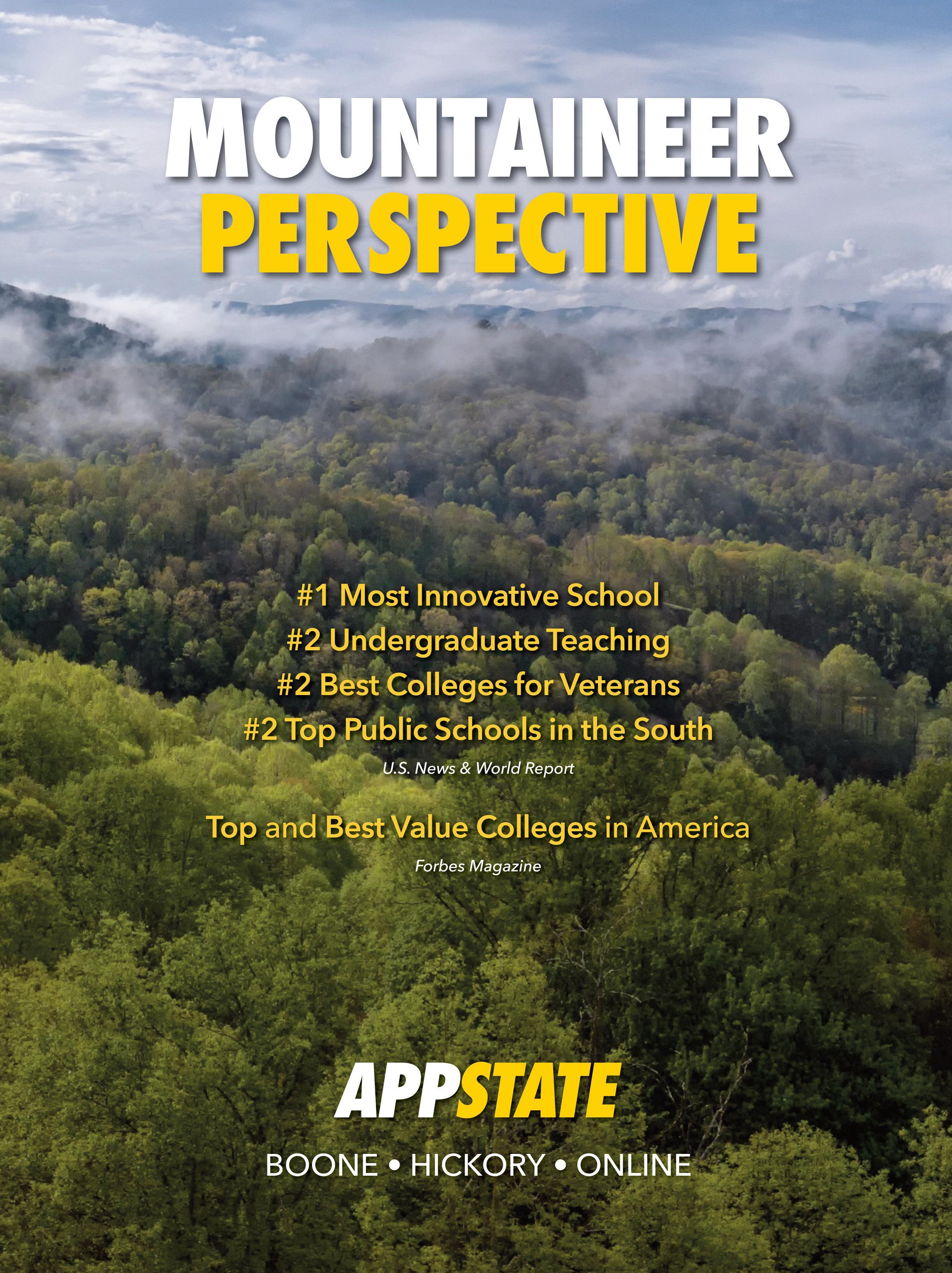
MBA PROGRAMS 2024
COLLEGE OR UNIVERSITY SCHOOL
APPALACHIAN STATE UNIVERSITY* Walker College of Business Sandra Vannoy Boone, online business.appstate.edu
BARTON COLLEGE School of Business
Ronald E. Eggers Wilson barton.edu/graduate/master-of-businessadministration/
CAMPBELL UNIVERSITY† Lundy-Fetterman School of Business Kevin O’Mara Buies Creek, Raleigh, online business.campbell.edu
CAROLINA UNIVERSITY Patterson School of Business Alma Gracic Winston-Salem, online business.carolinau.edu/
DEVRY UNIVERSITY† Keller Graduate School of Management Charlotte, online devry.edu/online-programs/mastersdegrees/mba.html
DUKE UNIVERSITY* Fuqua School of Business Bill Boulding Durham, global locations fuqua.duke.edu
EAST CAROLINA UNIVERSITY* College of Business Michael Harris Greenville, online business.ecu.edu
ELON UNIVERSITY* Martha & Spencer Love School of Business Raghu Tadepalli Elon, Research Triangle Park elon.edu/u/academics/business/
FAYETTEVILLE STATE UNIVERSITY* Broadwell College of Business and Economics Ulysses Taylor Fayetteville, online uncfsu.edu
GARDNER-WEBB UNIVERSITY† Godbold School of Business Mischia A. Taylor Boiling Springs, Charlotte, online gardner-webb.edu/programs/businessadministration-mba/
HIGH POINT UNIVERSITY Earl N. Phillips School of Business Daniel Hall High Point, online highpoint.edu/graduate/mba
LENOIR-RHYNE UNIVERSITY† Charles M. Snipes School of Business & Economics Craig Schreiber Asheville, Hickory, online lr.edu/business-administration-mba
MEREDITH COLLEGE* School of Business Kimberly Burke Raleigh meredith.edu/mba
MONTREAT COLLEGE School of Adult & Graduate Studies Paul Gratton Asheville, Charlotte, online montreat.edu/mba
N.C. A&T STATE UNIVERSITY* Wille A. Deese College of Business and Economics Kevin James Greensboro, online ncat.edu/cobe/mba/index.php
N.C. CENTRAL UNIVERSITY* School of Business Anthony C. Nelson Durham, online nccu.edu/business
N.C. STATE UNIVERSITY* Jenkins Graduate School/Poole College of Management Frank A. Buckless Raleigh, RTP, online mba.ncsu.edu
NORTHEASTERN UNIVERSITY D’Amore-McKim School of Business Emery Trahan Charlotte, online northeastern.edu/charlotte
PFEIFFER UNIVERSITY† Susan Luck Charlotte, online pfeiffer.edu/mba
QUEENS UNIVERSITY* McColl School of Business
ST. ANDREWS UNIVERSITY
Greg Pillar Charlotte, online queens.edu/mba
Wayne Freeman Online sa.edu/master-of-business-administration/
STRAYER UNIVERSITY† Charlotte, Greensboro, Morrisville, Raleigh strayer.edu
UNC CHAPEL HILL* Kenan-Flagler Business School Jennifer Conrad Chapel Hill, Charlotte, online kenan-flagler.unc.edu
UNC CHARLOTTE* Belk College of Business Jennifer L. Troyer Charlotte, online mba.uncc.edu
UNC GREENSBORO* Bryan School of Business and Economics
UNC PEMBROKE* Thomas School of Business
UNC WILMINGTON* Cameron School of Business
UNIVERSITY OF MOUNT OLIVE Robert L. Tillman School of Business
WAKE FOREST UNIVERSITY* School of Business
WESTERN CAROLINA UNIVERSITY* College of Business
WINGATE UNIVERSITY Porter B. Byrum School of Business
WINSTON-SALEM STATE UNIVERSITY School of Business
McRae Banks Greensboro, online bryan.uncg.edu
Mohamed Djerdjouri Online uncp.edu/mba
Robert Burrus Online
csb.uncw.edu/grad/index.html
Kathy T. Best Online umo.edu/mba
Michelle Roehm Charlotte, Winston-Salem , online business.wfu.edu/mba
Angela “AJ” Grube Asheville, online wcu.edu
Sergio Castello Charlotte wingate.edu/graduate-programs/master-ofbusiness-administration
Manju Bhat Online wssu.edu/admissions/programs/businessadministration-mba/index.html
Most popular UNC System master’s programs (in 2022-2023 school year) (% change from 2021-22)

The
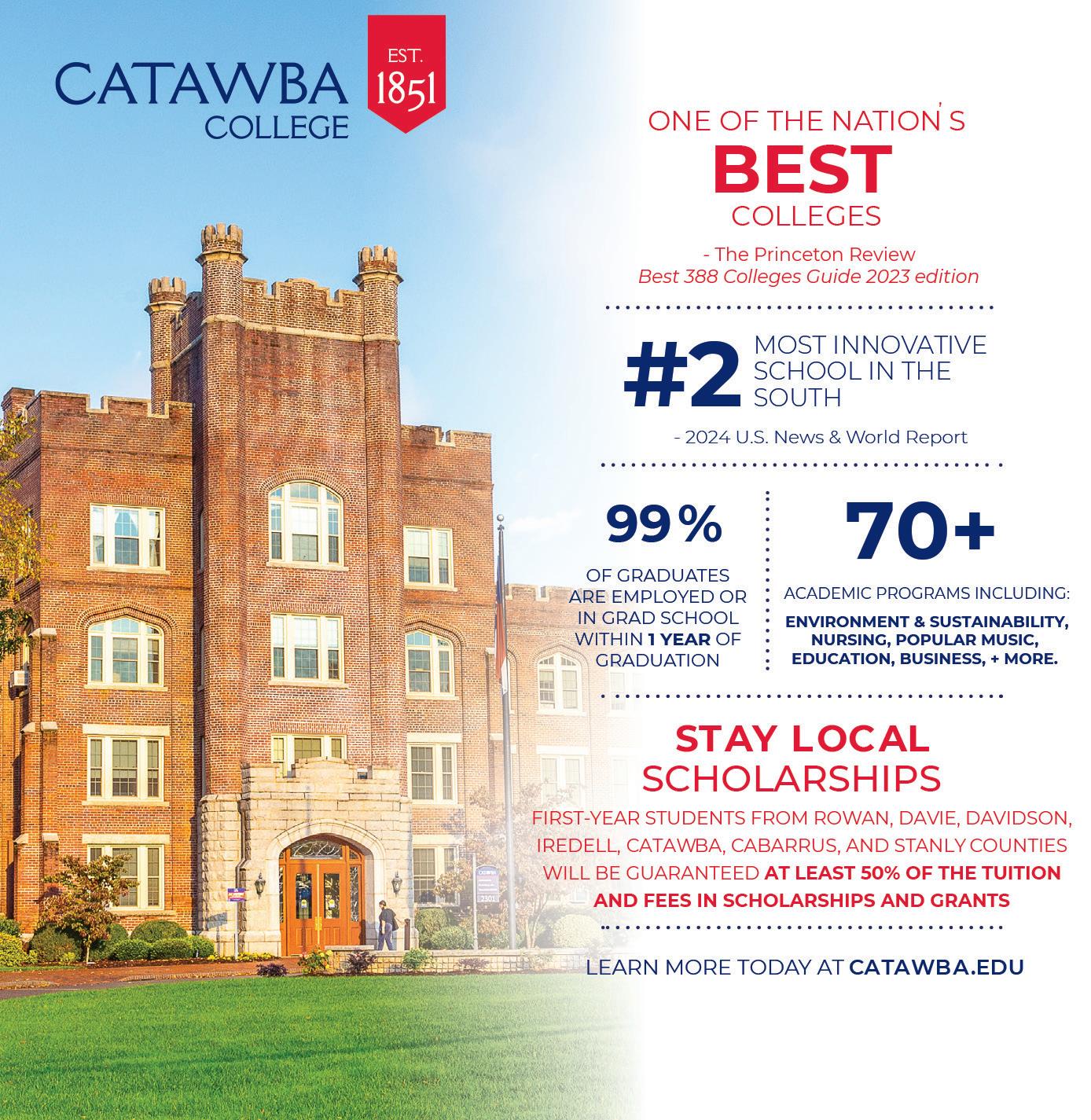












TNATION




Mixing business moxie with an appeal for traditional values turns High Point University into a conqueror.By David Mildenberg

his is a story about dramatic growth at High Point University. If you’re tired of hearing about a university with a ubiquitous marketing effort, maybe just read the following quote from Tom Ross — and skip the rest of the story. He's the former president of the UNC System, with 16 collegiate campuses and nearly 250,000 students. He also ran Davidson College, an elite private undergraduate school with a $1.3 billion endowment.
“High Point is as remarkable of a turnaround story as one can find in higher education,” Ross says. “President Nido Qubein has done a remarkable job and surpassed what many doubters thought was possible. I can be included in that list of doubters. I didn’t see it happening.”
Now, for readers who want to hang in there, here’s an abbreviated version of how Qubein pulled off this unexpected growth story.
SOMETHING’S GOTTA CHANGE
In late 2004, Qubein was the incoming board chair at HPU, where he had earned a bachelor’s degree in 1970 after immigrating a few years earlier from Lebanon. His father died when he was 6, and his seamstress mother urged her five children to attend college in the U.S. He says he arrived at 17 with $50 and little else.
Within 25 years, he was topping $1 million a year from motivational speeches, books and tapes. The media business sales were seven times as lucrative as speechifying, he says. He had other business ties, and was a director of Truist, or predecessors BB&T and Southern National Bank, from 1990 through 2023.
So Qubein was taken aback when HPU board Chair Richard Budd, who led the search committee to replace the retiring president, asked him to take the job running the campus because they couldn’t find a suitable candidate.
The HPU alum loved his Methodist-affiliated college, but he knew it was in trouble. It had about 1,400 students on a 91-acre campus; more than 20% left annually rather than complete a degree. Its fundraising totaled a few million dollars a year, and campus buildings required $120 million in deferred maintenance. It had colleges of business, liberal arts and education and an endowment of about $45 million.
The campus was split along city-maintained streets in a neighborhood of moderate to lower-income homes, about a mile north of downtown High Point. “You could live in High Point and not know the school was there,” says former Mayor Jay Wagner. “It was educating kids, but there was little interaction with the city.”
The turnaround challenge intrigued Qubein, who envisioned that a strong university could help revive High Point, which was overly dependent on stagnating furniture and textile industries. He started the job in January 2005. In his first year, he recalls struggling to attract 40 or 50 potential students on official visit days.
Today, HPU has an enrollment of about 5,960, including 623 graduate students, according to a Standard & Poor’s report. There are 14 schools with the first class of dental and law students enrolling this fall, followed by optometry next year. Qubein regularly ranks among the highest-paid U.S. university presidents, with total compensation of $2.1 million in 2022, according to HPU’s latest tax filing.
The campus now includes 128 buildings, with its streets owned and maintained by the university. Gates and wrought-iron fencing surround the campus, which has expanded to 500 acres after HPU bought more than 1,000 adjacent parcels.
Cost of attendance exceeds $62,000 a year, which requires sacrifice from N.C. families who could pay half as much to send a child to a UNC System campus. It’s $15,000 to $20,000 less than some private colleges considered comparable by HPU officials.
Yet, HPU received more than 18,000 applications last year for about 1,250 first-year slots. It isn’t highly selective, with an acceptance rate of more than 75%. But average GPAs and SAT scores of incoming students have increased significantly to 3.6 and 1250, respectively, over the past decade. Criticism that HPU is a magnet for wealthy families stings Qubein, and the university has boosted its annual spending on scholarships from $31 million in 2017 to $85 million this year.
And admission visit days? Now, it’s common for 1,000 potential enrollees to show up.

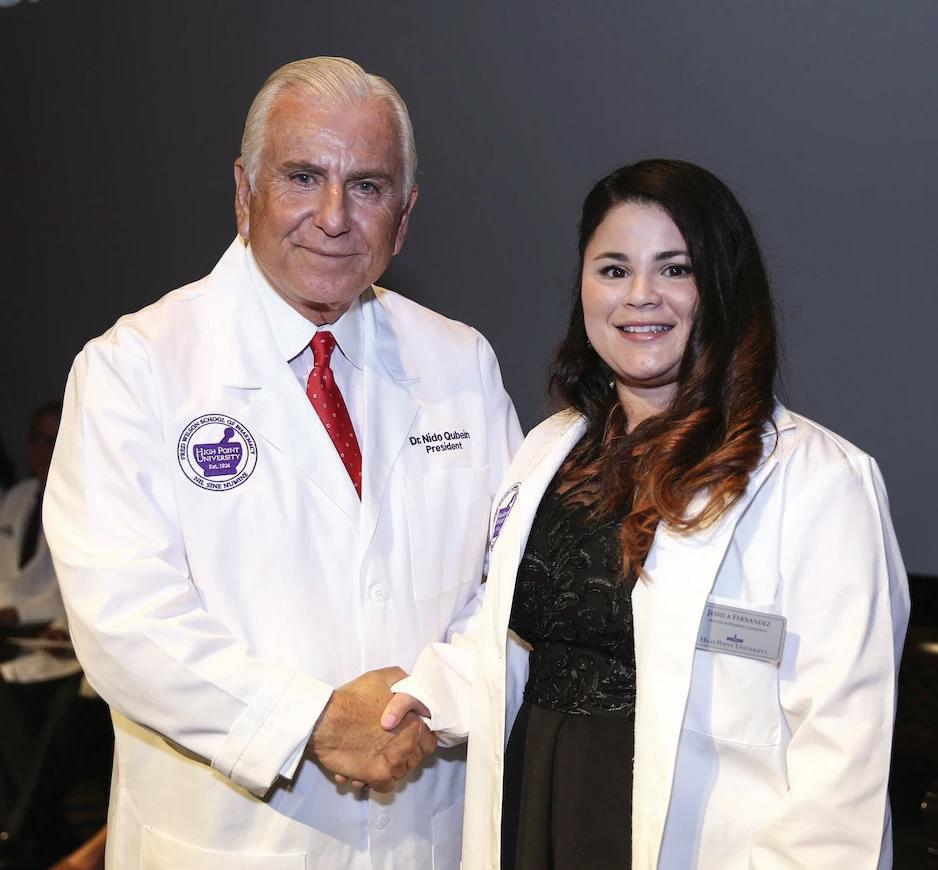
FACULTY MATTERS

In academia, senior leadership comes and goes, while faculty tend to stick around. The average president lasts fewer than seven years, matching the length of a typical major capital campaign, ex-UNC chief Ross says. Professors with campus clout know they can wait out a short-term president.
Qubein, 75, says his HPU experience shows him nothing could have happened without strong faculty support.
Before accepting the job, he stipulated each of the 100 or so faculty members had to support his hiring. College professors tend to disagree about a lot and don’t usually want a CEO-type as president.
So he met with the HPU faculty. After an hour in which he shared his personal history and hopes, then answered questions, the entire group gave him a standing ovation. No dissenters emerged.
Faculty remain respectful of Qubein, says Daniel Erb, who left Duke University in 2011 to become dean of HPU’s School of Health Science, then became provost in 2021.
“Does everyone agree with what we do? No, 5% of faculty is going to be opposed to whatever you do,” Erb says. “But we’re not talking about cutting programs here, so faculty aren’t worried about that, but instead are focused on their classes and our students.”
Unlike most universities, High Point requires faculty members to show up at campus five days a week. “If you want to teach Tuesdays and Thursdays, that’s fine, but I tell them that’s a part-time job,” Qubein says.
The faculty respect authenticity and listening skills, the president says. “I always start with a yes. It doesn't always end that way after we’ve done the study, but a lot of people start with a no. We’ve created an atmosphere for creativity around here.”
About 30% of HPU faculty have tenure, an academic tradition that Qubein dislikes. He views tenure as typically a 30-year promissory note that unfairly binds a university. “I’m all for security in your job, but I can’t have but so many with tenure.”
The balance of educators work on multiyear contracts or are on a tenure-track. Despite some criticism, HPU receives ample applications when it is hiring professors, he says.
Adds Erb, “We couldn’t have accomplished what we have here without the faculty being behind us. There’s no way.”

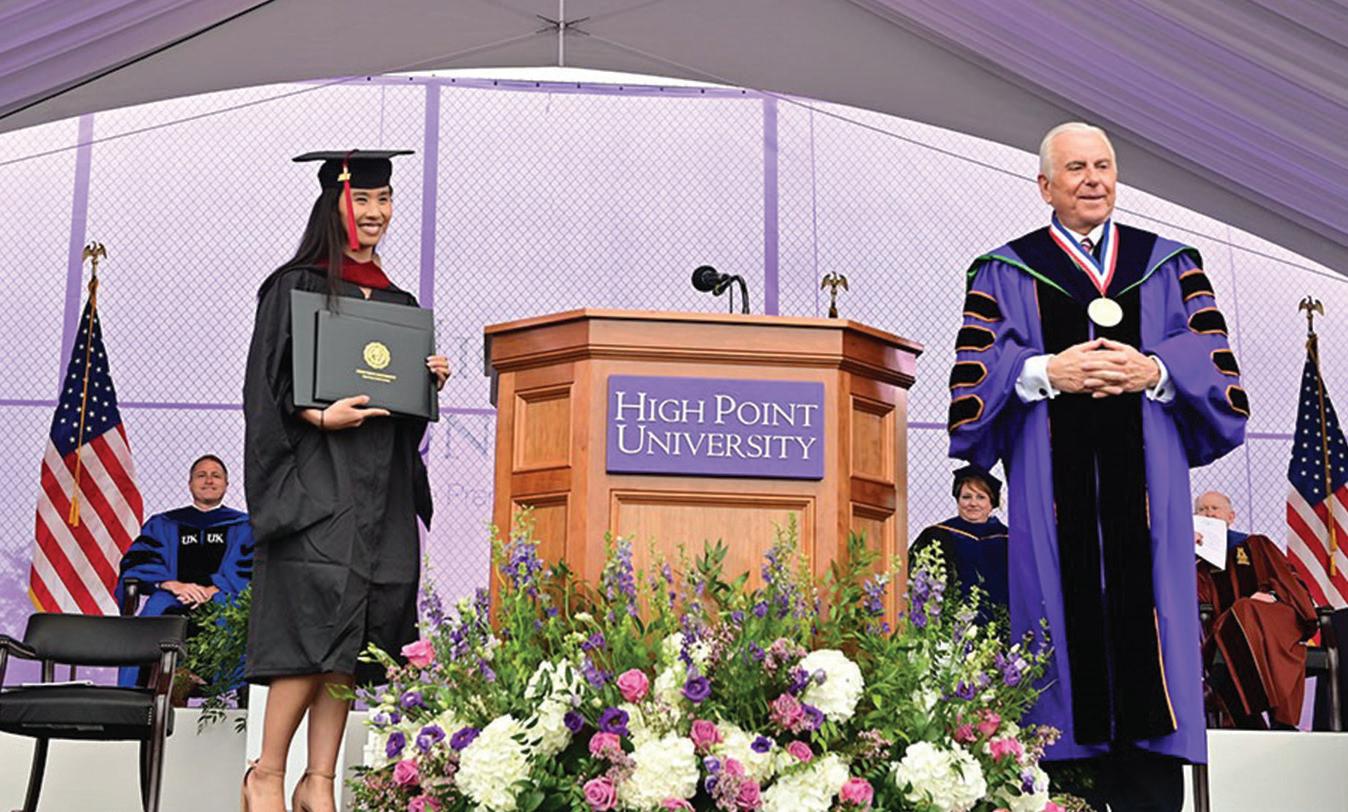

THE GAME OF LIFE
“How did you do it,” is the main question that Qubein says he has received from the 400 college presidents who have visited HPU to study its success.
It’s a mix of several factors, he answers, but a list-topper is a focus on helping students develop life skills that trump any single diploma.
“A college education isn’t a prize to be won or a certificate to be completed,” says Kerr Ramsay, senior vice president of enrollment. “It is a process of growth and transformation that, if done right, can impact graduates for the rest of their lives. That’s what families are responding to. That’s what’s led to our growth.”
HPU caught Ramsay’s eye in 2011 when he was a student recruiter for Emory University’s divinity school. “The High Point students — and I’m talking about every one of them — were the only ones who looked me in the eye, shook my hand firmly, gave me their resume with confidence and had conversations that stood out,” he recalls. “It was a wow moment for me. I realized something different was happening here.” Ramsay was hired at HPU in 2013 and took his current post in 2022.
Each freshman is assigned to a career coach, who helps direct students to courses and internship opportunities. The program is led by Andy Bills, who led a Triad marketing agency and worked with the Qubein-led Great Harvest Bread retail firm before joining HPU in 2005. He’s now a senior vice president who oversees career development, student success and retention.
Qubein is especially proud of building alliances with a rotating group of about 50 corporate executives. They visit campus periodically to lecture and help students learn about the world in a way that Qubein calls unusual in U.S. higher education. Prominent members include Apple cofounder Steve Wozniak; Dallas Mavericks CEO Cynt Marshall; and Domino’s CEO Russell Weiner. North Carolina executives who’ve been HPU’s advisers include former Belk CEO Tim Belk, retired Truist CEO Kelly King and Greensboro media executive Bonnie McElveen-Hunter.
HEALTHY STRATEGY
Growth comes easier if one picks the right industry. HPU invests heavily to train students for careers in healthcare, a sector that makes up about a fifth of the U.S. economy. As a former CEO consultant, Qubein says he pressed them to look out 10 years and understand societal and geopolitical changes. A similar process led HPU’s board to approve the healthcare focus, he says.
Erb says he was confident in leaving Duke because of Qubein’s assurance that he had connections with wealthy donors who would support the College of Health Science, followed by programs for physician assistants, physical therapists and pharmacists. Before that, HPUs health-related offerings were limited to undergraduate exercise science and athletic training programs.
Qubein and his team made it happen by raising high seven-figure or eight-figure gifts from a few dozen wealthy individuals and families.
HPU’s pharmacy school is named after High Point chemicalcompany owner Fred Wilson. The Congdons, owner of giant trucker Old Dominion Freight Line in Thomasville, have their name on the College of Health & Sciences. Wisconsin’s Wanek family, which owns the Ashley Furniture chain, sponsored the School of Natural Sciences, among many HPU gifts. In March, High Point insurance executive Doug Witcher gave $20 million; the School of Human and Behavioral Sciences bears his name.
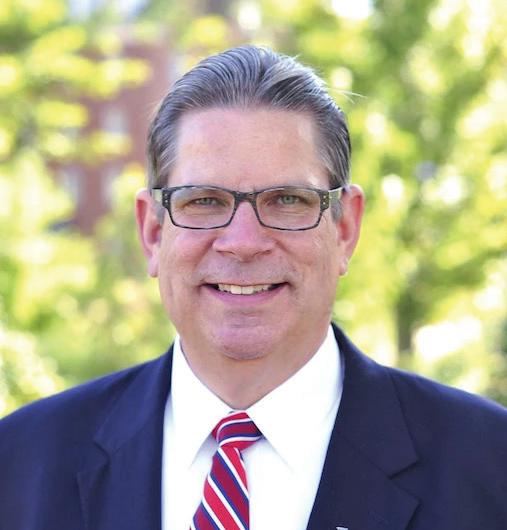

Qubein himself is among the school's biggest donors.
“Being a member of the team who raised over $400 million since 2015 has been a privilege,” former HPU development director Chris Dudley said last year when he left HPU to join the Raleigh-based BrightDot consulting firm. In March, HPU announced donations of $230 million from six families, including the Congdons and Witchers.
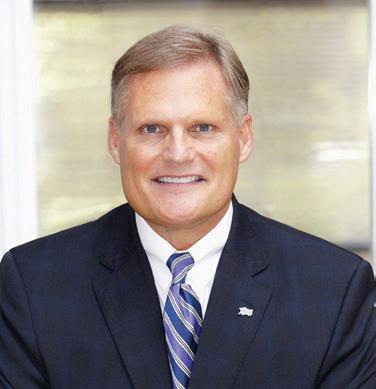

Erb says he chose High Point over jobs at higher-ranked universities. “You could try innovative things here as long as you were thoughtful,” he says. “And I thought I could help more here.”
Qubein says.
“I can’t tell you how brilliantly I think we are doing that.”


“We want to be a school that prepares students to be a person of influence and relevance,”






Former UNC leader Ross says he doubted HPU’s expansion in pharmacy would work. The statewide system studied adding a pharmacy school, but nixed it because perceived insufficient demand. He also questions if North Carolina needs another law school.


Pharmacy has been a success for HPU since 2016, Erb says. Qubein says he’s excited about the law school’s prospects, led by Mark Martin, former chief justice of the N.C. Supreme Court.
HPU's plan for a third N.C. dental school has faced considerable opposition from the state’s dental community, Qubein says. The program received 1,400 applications for 60 slots in its first cohort this fall.
BUSINESS MATTERS
Qubein makes no pretense that he is a business guy and not an academic. Running a private university is vastly different than being a chancellor of a public campus beholden to boards appointed by politicians, he says.
Operating with solid margins — namely revenues over expenses — has been essential for High Point’s success, and it’s a source of great pride for him. Fast-growing businesses, he notes, are not nearly as rare as private universities that have soared in size and impact.
HPU operating revenue increased nearly 40% between 2020 and 2023, to $383 million. That doesn’t include donations. It had a $44 million operating surplus in its 2023 fiscal year, and $55 million a year earlier, according to Standard & Poor’s. That represented margins of 13% and 18% respectively. The national average for private colleges is less than 5%. Many operate at a deficit, using reserves to pay bills.
“Because of the continued growth in enrollment, as well as management’s conservative budgeting practices, we expect [HPU’s] operating results will remain robust,” the credit rating agency noted.
As of Dec. 31, HPU’s balance sheet showed $1 billion in assets and $83 million in debt, Qubein says. It had about $80 million in cash and liquid assets as of March, so it could extinguish its debt tomorrow, Qubein says. “But I’m paying a very low interest rate, so it would be pretty stupid.”
No wonder, he says, that rumors over the years that HPU held $500 million of debt or was a “house of cards” are now debunked. “Nobody is saying that anymore.”
What about the endowment, which totaled $151.5 million as of May 2023, according to S&P? Several N.C. colleges have larger funds.
Qubein answers that the endowment has been a low priority for much of his tenure. In 2005, he concluded that he couldn’t attract students without first-rate dorms, classrooms, labs, restaurants and a good recreation center. So he focused on raising money from those who share his goals for HPU, then poured every cent into structures and programs.
The resulting campus evokes comparisons to Disney theme parks for its cleanliness and greenery. In a state full of beautiful campuses, HPU ranks high. No one would have said that in 2005, say Wagner, the former High Point mayor.
“The endowment is getting more attention, and it’s one of the biggest things on our radar,” says HPU board Chair Chris Henson, the former head of banking and insurance at Truist Financial, and president of predecessor BB&T. “But things have their priority, and we’re not relying on a large endowment for our future.”
VALUE PROPOSITION
A key aspect of HPU’s story is its emphasis on “God/Family/ Country” values that rarely get top billing at elite U.S. universities. Qubein cites a mix of beliefs and gestures: He favors a universal belief in God; dozens of American flags are displayed across campus; HPU athletes are required to place a hand on their heart during the playing of the national anthem.
Princeton Review, which rates colleges, lists HPU’s student body as among the most conservative in the nation. But High Point has intentionally avoided the path of Liberty University, the Lynchburg, Virginia, institution that grew rapidly in recent decades by appealing to evangelical Christian students and investing in online education. Liberty has more than 15,000 students on campus and nearly 100,000 take online classes. It has an endowment of $2 billion.
Qubein bristles at the comparison. He says he supports diversity and inclusion efforts, including welcoming LGBTQ students and
faculty. He doesn’t define what constitutes a family. About 24% of students are diverse. HPU is focused on character and career-building, not gender and racial differences, he notes. To attract Jewish students, he started a Hillel program. Now, he says about 7% of the student body call themselves Jewish.
“I don’t define God for people, and we have Muslims, Jews, Christians, people with no religion,” he says. “What matters is we believe in God. We don’t push it down your throat, but we want you to know where we stand.”
Qubein wants “actionists” on campus, not “activists,” whom he defines as noisemakers who rarely deliver positive results.
It is a timely strategy. “We’re seeing across the country in higher education and corporations that people are attracted to organizations that offer a clarity on what they believe, even if they don’t agree 100%,” says Ramsay, the enrollment leader. “We don’t say we are a great place for everybody, and people appreciate that clarity.”
The president says he wants everyone to share his love for the USA, reflecting his personal experience. “We have enormous blemishes and many inequalities that we can agree on. But my God, the available opportunities for success can be loaded up by the truckload.”
THE REST OF THE STORY
Following Qubein’s act will be a challenge. He isn’t saying how long he will stick around. Estimates from people close to the president range from the end of this year, after conclusion of HPU’s 100th anniversary events, to completing his current contract, which ends in 2029.
It won’t be for a lack of energy or mental agility, people familiar with Qubein say. He wakes up around 5 a.m. for exercise and reading emails and the news, gets to campus by 7 a.m., then fills his days with meetings and activities such as his weekly PBS NC interview show. He attends many HPU athletic contests, sitting close enough at basketball games to badger refs over “bad calls.” He has led many civic efforts, including efforts to revitalize center-city High Point with a ballpark and kids' museum thas is named after Qubein and his wife, Mariana.
The Qubeins spend considerable time at their condo in Palm Beach, Florida’s Worth Avenue district. That’s where the money is, he says, referring to North Carolinians and others with second homes in the Sunshine State. He also enjoys walking on the beach.
Qubein emphasizes that a strong team runs daily operations and “two or three” senior leaders are highly capable successors. HPU's board has many veteran business leaders with succession experience.
“Nido has been a catalyst, but he’s been mindful of bringing in a deep bench of talented people,” says Henson. “If we had an emergency tomorrow, we’ve got an answer for that. But if his health holds up, we’re not there yet.”
Henson is a 1983 graduate raised by a single mom who was a seamstress. He attended HPU on a federal grant and private donations arranged by the school then rose to be BB&T's second-highest paid executive. He thinks sustaining growth will be less challenging than what Qubein faced in 2005. “People say it’s an unbelievable campus, but they miss the focus on values, generosity and personal initiative,” he says. “The vision to build a university that creates unique value has been the driver.”
EPILOGUE
This story started with a comment from Tom Ross, a progressive. Let’s close with a word from a conservative, State Treasurer Dale Folwell: “I’ve listened to President Qubein for two decades and never detected a gap between who he is and how he leads. In such an upside world, young minds gravitate toward that stability.”■



wheeler dealer wheeler DEALER






Rock crusher Martin Marietta Materials is built on buying and selling, with bright prospects ahead.
By Chris Roush











The most important documents for Martin Marietta Materials and CEO Ward Nye were created 15 years ago and have been updated three times.
They're called “SOAR,” for strategic operating analysis and review, and they’re the blueprint for the 85-year-old company, which has become a national leader in the business of mining rocks used in many types of construction. They analyze the Raleigh-based company’s geographic and product markets, studying whether it should hold, expand, exit or target competitors. They review state and federal budgets for building roads, highways and other construction projects that require aggregates, as well as expected population growth and the company’s competitive status.
“This is a highly fragmented industry,” says Michael Petro, senior vice president of strategy and development. “Our strategy doesn’t really change every five years; it just gets refreshed.”
The strategy has worked extremely well. Raleigh-based Martin Marietta Materials reported record revenue and earnings in 2023, and its stock price has gained nearly 80% in the past year through mid-April. Nye says better performance is coming.

Using its SOAR strategy, the company sold its Texas cement business for $2.1 billion in February after imports became a bigger part of that market. It used that money to buy 20 aggregate mines in the Southeast, betting on more government spending on building highways, roads, bridges and streets from both the federal JOBS Act signed into law in late 2021 and state DOT budgets. Two markets – Nashville and Miami – included in that deal are ones that Martin Marietta has long coveted because of SOAR.
Pent-up demand for residential construction will fuel more growth, Nye argues. The changes also align with the company’s primary focus on the Southeast and Southwest economies, projected to grow faster than other U.S. regions.
Nye notes that the company’s market capitalization has doubled in each of the last three of the company’s five-year SOAR timeframes. He’s ahead of that goal for the latest fiveyear plan, which started in 2021. Its stock performance over the last five years has ranked among the top 10 of North Carolina public companies, gaining more than 200% through mid-April. That compares with a 95% rise for the S&P 500 index, of which it is a part.
“We have plenty of dry powder to continue doing what we’re doing,” says Nye. “We think states like North Carolina and others in the Southeast and Southwest, where the population trends have been so significant and will continue to be significant, we have to be focused on capacity expansion.”
Nye’s strategy has garnered the respect of Wall Street analysts and business experts. At a market capitalization of $37 billion, it’s worth slightly more to investors than rival Vulcan Materials, a Birmingham, Alabama-based company that has a market cap of about $35 billion. The N.C. company’s $6.8 billion in revenue last year trailed Vulcan by about $1 billion.
Declining interest rates would boost Martin Marietta’s residential construction business, says Stephens analyst Trey Grooms, adding that its recent acquisitions will boost its profits and “creates a more durable earnings base.” Jefferies analyst Philip Ng predicts that the company “will remain active on the M&A front in 2024” and believes a deal similar to the $2 billion purchase of Blue Water Industries’ 20 mines in the Southeast is a potential. In addition, Raymond James analyst Patrick Tyler Brown expects the company will increase prices later this year, fueling more revenue and earnings growth.
Duke University business professor John Graham teaches a corporate finance course in which he uses Martin Marietta’s mergers and acquisitions strategy to teach students how the company allocates its money. He notes the company’s approach to buying and selling to expand its business in the right markets and at the right times.
“They’re disciplined in their acquisition activity,” says Graham. “They are trying to grow, but they’re trying to do it pragmatically, not excessively cautious, but not crazy. They accumulate resources. And they have in mind a price they’re willing to pay. They seem to have the discipline to walk away if it’s not the right deal for them. They don’t try to strong-arm these smaller quarries that they’re buying. They have a fair conversation with them, saying ‘Here’s what we think it’s worth.’”
Martin Marietta produced 200 million tons of aggregate in 2023. In its SOAR analysis, it identified more than 200 million tons of aggregate being produced by family owned or private quarries that are in markets where it would like to expand. “We like to say there’s another Martin Marietta out there in M&A in markets that we want to be in,” says Petro. “And that 200 million tons is only about 10% of the total addressable market in the United States.”
SUCCESSION STORY
Deals have been the company’s DNA since its beginning. Founded as Superior Stone in Raleigh in 1939, with the first quarry in Red Hill, Virginia, the company was purchased by AmericanMarietta in 1959 and merged with aerospace contractor Glenn L. Martin Co. in 1961 to become Martin Marietta. In 1995, it was acquired for $10 billion by defense giant Lockheed, then spun off as a separate company a year later.
Martin Marietta, which then had revenue of about $660 million, was led by Steve Zelnak, who had joined the business in 1981 and became CEO a year later. During his 27 years as the company’s top boss, he oversaw more than 70 acquisitions. “Steve is all about understanding the marketplace and understanding the customer,” says Nye, who stays in touch with Zelnak, who lives in Raleigh.
Nye, who holds a bachelor’s degree from Duke University and law degree from Wake Forest, was working as an attorney in the early 1990s for a firm whose largest client was a building materials company. He then spent 13 years at Hanson, a London-based holding company that ended up spinning off all of its businesses except
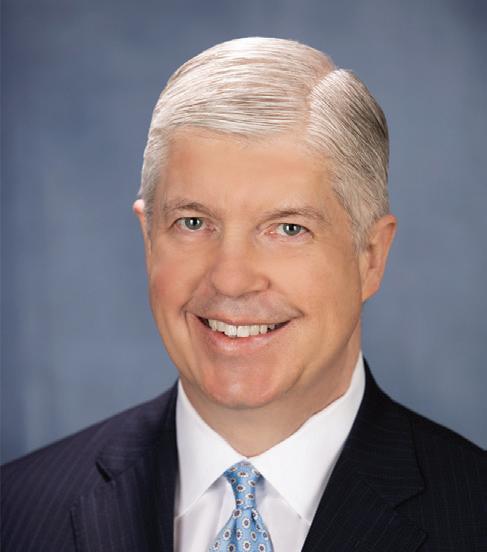
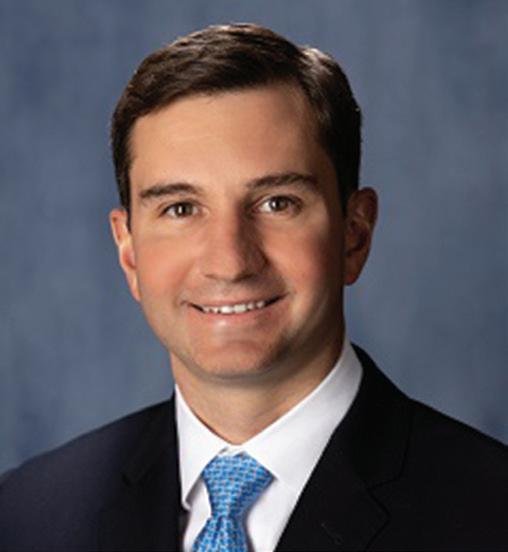
CEO Ward Nye and Michael Petro, senior vice president of strategy and development.
the building materials operation. His jobs included running the company’s mergers and acquisition team, heading the East division based in Raleigh, then working in Dallas as executive vice president of North American operations.
In 2006, he got a call from Martin Marietta, which was looking for Zelnak’s successor. He jumped at the chance, serving as president from 2006-09, then became CEO a year later when revenue was $1.8 billion and the market cap was $4.2 billion.
It was during his initial years at Martin Marietta when it developed the SOAR process. Nye says the company spent 30,000 internal man-hours examining each of its markets, including 11 mega-regions that make up 70% of U.S. population growth. Those included markets, such as the Piedmont and the Gulf Coast, where Martin Marietta had a strong presence and others, such as Florida, where it had no operations.
Armed with the SOAR strategy, Nye started making deals. “We’ve been very dedicated to this process,” he says. “It was never something that was a lovely PowerPoint presentation that you then stuck on a shelf and didn’t live by.”
One of his first moves as CEO was to hold merger talks with his biggest rival, Vulcan. When those discussions broke down, Nye launched a $5 billion hostile takeover in 2012 that was blocked by a Delaware judge, who argued that Martin Marietta had violated confidentiality agreements. Martin Marietta said that the combined

companies would be better equipped to withstand an economic downturn and could save as much as $250 million in costs, while the two had few competing operations.
“I think Vulcan has made us better,” says Nye. “I think we’ve made them better. And I think when people are deciding where they want to invest, oftentimes it’s coming down to one or the other, and sometimes both, and that’s the highest compliment.”
DEALS AND DEALS
In late 2011, the company exchanged its quarries and distribution yards along the Mississippi River in exchange for French company Lafarge’s quarry sites, ready-mix concrete and asphalt plants, and a road-paving business in Colorado.
In 2014, Martin Marietta spent $2.7 billion to acquire Texas Industries, increasing its cement presence in Texas and California. When the deal closed, Martin Marietta’s market capitalization was $8.8 billion, or less than a quarter of its current value. Nye says that deal gave the company a bigger presence in fast-growth markets such as Dallas-Fort Worth and San Antonio. “We’re not a nationwide cement company and don’t intend to be,” says Nye. “But we’re a strategic cement company.”
Four years later, it bought Bluegrass Materials, the largest privately-held, pure-play aggregates company in the United States, for $1.625 billion in cash. The transaction included quarries across Georgia, South Carolina, Maryland, Kentucky and Tennessee.
The next big deal occurred in 2021. Martin Marietta had ended 2020 with a market capitalization of $17.7 billion and revenue of $4.7 billion. The company bought Lehigh Hanson’s U.S. West region for $2.3 billion, giving it 17 new sites in California and Arizona, and a deep-water import terminal in San Francisco. The deal added 13 million tons of annual aggregate production, 1.5 million tons of cement from two plants and 2.8 million tons of asphalt production from two plants.
With that deal, Martin Marietta now has a large presence in 10 of the 11 mega regions cited in its SOAR strategy, with only the Pacific Northwest lacking a strong company operation. (It has one location in Seattle.)
Selling the Texas cement business earlier this year, says Nye, was due to imports becoming more a part of the Texas market. The United States imported $2.2 billion worth of cement in 2022, and Cement Distribution Consultants in Amsterdam reports that about 80% of the cement imported into Houston and Corpus Christi comes from Turkey. “It was no longer really meeting our defined role of strategic cement,” says Nye. “And it allowed us to somewhat serendipitously take those funds and redeploy them into a pure aggregates business.” Its remaining cement plant, in the Dallas-Fort Worth market, is far enough away from Houston that it won’t be affected by imports, the company believes. (The company sold a California cement plant in 2023 for $317 million in cash, and it sold its Colorado and Central Texas ready-mixed concrete operations to Smyrna Ready Mix Concrete in 2022.)
Two particularly attractive markets studied by the company are Austin, Texas, and in northern Virginia near Washington, Petro says.
As for future deals, Petro says the company often holds conversations with potential sellers for years. “It’s usually a succession issue or family issue,” he says. “We like to stay in front of them and talk to them regularly about how we would handle a transaction if they were willing to sell. What they typically want, especially with a family business, is that their people are taken care of. And we like to think we’re a pretty good place for people to come to work.”
Duke University professor Graham calls that a smart strategy. “You can’t walk in there and be a city slicker and be full of yourself and talk to these owners,” he says. “They will shut the door on you and not open up.”
Deal making is preferable to starting new quarries, a tough process entailing finding 500 acres near a metropolitan market where there’s quality stone near the surface. Then the aggregates enterprise has to go through a lengthy rezoning and permitting process, along with gaining environment and water permits. Not many people want to live near a quarry, either.
“That’s not a matter of months, but a matter of years,” says Nye. The alternative, which Martin Marietta is mastering, is making deals for existing sites. “One of the things that we do extraordinarily well is plan and execute, particularly around mergers and acquisitions,” says Nye. “If you go back over the 30 years we’ve been a public company, literally well over 100 transactions, it would be hard to find some that didn’t go as we hoped.” ■




GOOD FOR GM , GOOD FOR GM ,
The automotive giant has ambitious defense contracting plans. A Concord factory is helping revive a proud legacy.
By David Mildenberg


G O OD FOR NORTH CAROLINA?
General Motors is making a push to become a significant player in the defense industry, with Cabarrus County serving as a key beachhead.
The Detroit-based company already bases its motorsports technical division at the Hendrick Motorsports campus near Charlotte Motor Speedway, about 15 miles northeast of the Queen City’s downtown. A main mission there is to achieve success for Chevrolets speeding around NASCAR race tracks.
Now the company is pumping two vehicle product lines that it considers fundamental to its vision of meeting demand from supplying the U.S. defense complex and governments of friendly nations around the globe.
Since 2020, GM Defense has been working on a $214 million U.S. Army contract to produce infantry squad vehicles, or ISVs. They are intended to help soldiers move quickly in tense military situations.
The first few ISVs were designed at GM’s Milford, Michigan, engineering center. But since 2021, about 750 ISVs have been completed — through mid-April — by
about 30 GM employees at a company-owned, former warehouse building in Concord. Three-fourths of the team previously worked in the motorsports industry as mechanics and assemblers, says Chad Allman, the plant manager and a 32-year GM veteran.
Separately, GM Defense won a 10-year contract with the U.S. Department of State to deliver heavy-duty sport utility vehicles. The deal has the potential for as much as $300 million in revenue, GM said in November.
SUVs are aimed at providing greater safety for diplomats and other government officials riding around Washington, D.C., and other capitals across the globe, while offering the same ride, technology and comforts of GM’s commercial Suburban brand.
Production of both vehicle lines shifted in recent weeks a couple miles south to a new 275,000-squarefoot building at the Hendrick acreage. Employment of assemblers of the infantry vehicles and SUVs is expected to reach about 80 over the next year or so. But the structure’s size suggests a much larger workforce is likely, depending

on GM Defense’s ability to win more contracts and develop other products.
Cabarrus County is thrilled by expansions at the Hendrick campus, which represents an important employment hub, says Page Castrodale, executive director of the county’s economic development arm. She notes that GM’s experience “proves the ability of our residents to make just about anything in Cabarrus County.”
ATTACK PILOT
The automaker’s effort is led by GM Defense President Stephen duMont, who is based in northern Virginia. He joined GM in 2021 after a dozen years at Raytheon (now renamed RTX), holding key posts in its missile systems, intelligence and space units. He had previously worked for Boeing and BAE Systems.
Though never based in North Carolina, duMont served in the military for eight years. He was an attack helicopter pilot and did training flights over the Uwharrie Mountains from Fort Liberty, the largest U.S. Army base and formerly known as Fort Bragg.
He praises Cabarrus County as a logical site for GM Defense because of its rich talent base of experienced mechanics and car assemblers.
Indeed, the N.C. location isn’t coincidental. Hendrick Motorsports owner Rick Hendrick is among GM’s most prominent auto dealers, having used his initial Chevrolet franchises in Bennettsville, South Carolina, and Charlotte in the late 1970s as a springboard to becoming owner of Hendrick Automotive Group. It now tops $12 billion in annual revenue, ranking among the largest U.S. dealership companies.
He’s probably even better known for the successful racing teams that have put him atop the NASCAR world for decades. His Concord site has been home to GM’s $45 million Charlotte Technical Center motorsports operation since 2022.
Hendrick Motorsports, which employs about 600 people, has diversified into defense work in recent years. It has about 100 employees working on making defenserelated products such as carts that can carry 500 pounds of equipment. Many of them are engineers and mechanics with racing backgrounds, says Scott Lampe, the company’s chief financial officer.
For GM’s ISV, Hendrick assembles the steel skeleton used as the vehicle’s roll-over cage, helping soldiers avoid injury in the same way that race-car drivers survive horrific wrecks at Sunday NASCAR events. “The ISV is one of the best-protected vehicles out there, and we owe that to our experience in motorsports,” duMont says.
 ▲ Nine-passenger vehicles that can be carried by helicopters are built in Concord.
▲ Nine-passenger vehicles that can be carried by helicopters are built in Concord.
The company’s close relationship with Hendrick and the dealer’s personal passion for supporting the U.S. military convinced GM that North Carolina was the place to expand the defense unit, he adds.
GM Defense’s two key product lines have different military missions. The ISVs weigh about 5,000 pounds, light enough to be carried by military cargo planes or helicopters that can drop them into challenging environments. The program was developed out of the Army’s request to give more mobility to its 82nd and 101st Airborne Air Assault divisions, which are based at Fort Liberty and Fort Campbell in Kentucky, respectively, duMont says.
Those famous troopers drop into dangerous situations, then typically travel five or 10 kilometers to close on the enemy. The ISVs can transport as many as nine soldiers to an intended location, rather than relying on heavy tanks or walking through enemy terrain.
The vehicles can be modified to carry fewer troops and more cargo. They don’t have armor and aren’t intended to be involved in firefights.
Meanwhile, the SUVs are intended to protect diplomats and other government officials from harm, while generally looking like a Chevrolet Suburban for sale at a local dealership. Rather than just tacking on stronger armor, the new heavy-duty SUVs are designed by GM from the ground up to incorporate heavier materials and different systems that don’t harm the vehicle’s handling and performance.
GM Defense’s SUVs weigh at least double a typical Suburban, which puts greater pressure on brake systems, engines and other parts. That underlines GM’s conviction that it can shake up defense contracting by integrating its vaunted manufacturing and engineering prowess with military demands for high-quality vehicles
Traditionally, the Defense Department has helped fund development of new vehicles for companies that don’t specialize in such product innovation. But GM can modify its existing lineup to speed deployment and reduce expense, duMont says. That’s a different approach than the production of battlefield stalwarts such as Abrams or Bradley tanks, which are made in partnerships with General Dynamics and BAE Systems, respectively.
For GM, producing new vehicles for specialized military and diplomatic needs is a different world from its core business of mass-producing vehicles at a couple dozen global assembly plants. Assemblers at the former Concord plant started making four ISVs a week, and now about 10 roll off the line every week. By comparison, a Silverado, Colorado, Suburban or other model rolls off a GM assembly line every 50 seconds.
In Concord, the ISVs are assembled at six stations with hundreds of processes required to create each vehicle. Bluetooth-enabled wrenches and other tools, along with computer monitors, provide needed precision. The effort won an innovation award from the National Association of Manufacturers trade association, while duMont says federal defense officials have noted the ISVs haven’t had the typical hiccups associated with new products.
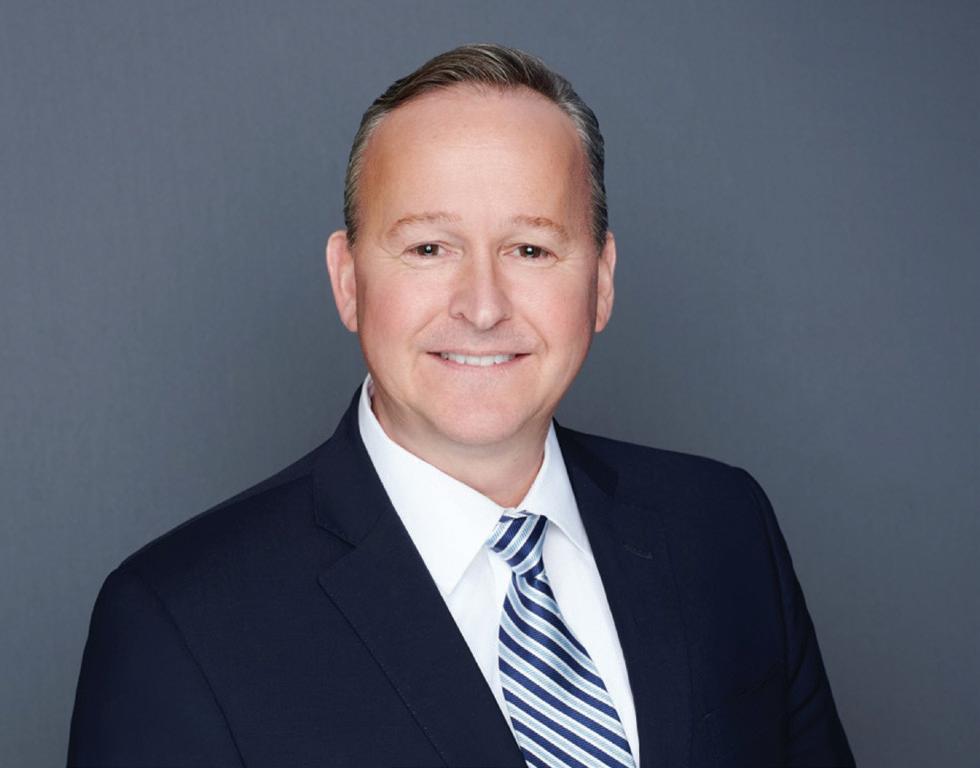
RICH LEGACY
The Cabarrus operation is a return to the past for GM, which played a pivotal role in aiding the Allied victory in World War II by converting its vehicle factories for military use.
After the war intended to end all wars, GM returned to its car-making roots. Its defense business became a bit player, a strategy that worked as it remained one of the world’s largest, most highly valued companies for many years. But wars haven’t stopped, creating huge opportunities for the military-industrial complex, while the auto industry once dominated by GM has become more complicated.
GM was the Pentagon’s 23rd largest defense contractor in 1985, according to a Washington Post story. It quoted industry analysts saying that the company saw huge promise in diversifying by buying a leading defense company. Martin Marietta, Hughes Aircraft or Boeing were cited as potential targets.
The story proved prescient: GM paid $5 billion in late 1985 to buy Hughes Aircraft, which owned pioneering satellite technologies with military and civilian uses, such as DirecTV. It then added General Dynamics’ cruise missile business in 1992.
By the late ’80s and ’90s, competition from Japanese and European rivals was causing massive financial pressure at GM. The cash-strapped company sold Hughes Aircraft to Raytheon in 1998 for $9.5 billion, including about $4 billion in debt. Five years later, GM sold the rest of its defense business to General Dynamics for $1.1 billion. At the time, the unit had about $950 million in revenue and 2,400 employees, who mostly worked in a partnership with General Dynamics, making lightly armored Stryker combat vehicles.
After $80 billion in cumulative losses between 2005 and 2008, GM filed for bankruptcy protection in 2009, marking the biggest industrial insolvency in U.S. history. Emergency federal funding enabled the company to quickly restructure into a smaller entity, aided by the biggest initial public offering in U.S. history in 2010. A Center for Automotive Research study shows the bailout saved 1.2 million jobs and about $35 billion in tax revenue.
GM has rebounded significantly since those dark days, which analysts credit partly to Mary Barra, who was appointed CEO in 2014, and strong demand for the company’s large pickup trucks and SUVs. The company had revenue of $172 billion last year and has reported annual net income of about $10 billion for each of the past three years. It has an investment-grade credit rating from Moody’s and Standard & Poor’s.
Still, the company’s stock market value of about $50 billion in mid-April remains a tenth the size of electric vehicle leader Tesla and an eighth that of Toyota. It’s also lower than defense giants RTX, which had a market cap of about $135 billion, and Northrop Grumman, $68 billion.
No one expects defense to quickly turn the needle at GM. But in a world of conflict and U.S. defense budgets under constant pressure from Congress, having another viable competitor for government contractors is an attractive prospect. “The big prime defense companies have embraced us,” duMont says. “They know we will bring them new opportunities.”
He also notes that the automotive industry’s trends for electric-powered and autonomous vehicles will inevitably benefit the military and create opportunities for GM Defense. Barra pledged in 2021 that GM will only sell electric vehicles by 2035, though earlier this year she hedged a bit by citing plans to reintroduce some hybrid engines that would use some gasoline.
Electric vehicles have some big potential benefits for soldiers and armies. For example, vehicles using diesel fuel tend to be noisy, hot and easily detectable by infrared monitors. Studies show that at least half of the casualties


GENERAL MOTORS in North Carolina

■ 422 employees
■ 121 dealers
■ 67,338 vehicles delivered
■ $68 million invested since 2012
■ $1.1 billion spending with 236 suppliers

GENERAL MOTORS in the United States
■ 91,972 employees
■ 496,000 retirees
■ 4,014 dealers
■ $35 billion invested since 2014
■ $87 billion spent with suppliers annually
Source: GM

in the Afghan and Iraq wars involved soldiers driving fuel or water to the frontlines.
“Everything that I targeted as an attack pilot, I used the infrared signature to lock on,” duMont says. But the bad guys have a harder time locating electric-battery-powered vehicles, which he adds run much cooler and more quietly.
GM has produced more material for U.S. defense than any other entity, mainly because of its World War II effort. It’s understandable, then, why duMont sees his work as more than bolstering an already powerful company.
“The reason I do this job is we have an amazing noble cause. We build amazing stuff for the best and bravest for the U.S. and our allies around the world. That’s why we do what we do.” ■




locations Mooresville Branch and Headquarters 106 Corporate Park Drive Mooresville, NC Statesville Branch
108 N. Tradd Street
Statesville, NC
Belmont Loan Production O ce
409 East Catawba Street
Belmont, NC
Hickory Loan Production O ce
2131 North Center Street
Hickory, NC
www.blueharborbank.com
At blueharbor bank we are honored and privileged to introduce Iredell County and our bank to the readers of Business North Carolina. We consider Iredell to be the premier county adjacent to Mecklenburg and an integral part of North Carolina’s vital economic engine that is the Charlotte Metro region.
We are proud to call Iredell home and have done so since our inception in 2008. As a recent three-time past Chairman of Iredell Economic Development Corporation, I have witnessed firsthand the rapid interest in our county and the development we have experienced in just the past decade alone.
Just as Iredell County has grown and prospered, so has blueharbor bank. Our style of banking, focused on solid relationships, has not just been welcomed by our county, it has been instrumental in our success within the region. Our now unique combination using a common sense approach along with quick and nimble decisioning is our hallmark. We listen to our customers and carefully tailor solutions that are a win for them, us, and our community.
We are pleased to share that while our style of banking has been well received locally, it has also received considerable recognition throughout North Carolina and even the nation. blueharbor bank was rated as the top-performing bank in North Carolina every quarter in 2023 by Bank Performance Report, a KBA Publication. S&P Global Market Intelligence, a leading banking analytical firm, ranked us #6 in the Southeast among banks with less than $10 billion in assets and #31 among 3,782 banks in the United States with assets less than $3 billion. These rankings are based on measurable tangibles like safety, soundness, profitability, capital, asset quality, and expense control.
blueharbor bank is so proud to call Iredell County home. A place where we have helped thousands of businesses and individuals make their home and achieve their dreams and aspirations.
Join us in Iredell County. Welcome Home!
Sincerely,
 Jim Marshall President & CEO
Jim Marshall President & CEO















RACING AHEAD


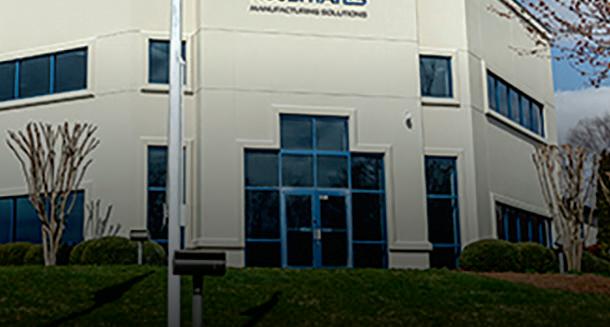
From tractors to motorsports, open land to industrial parks, Iredell County has much to offer.
From its northern line at Yadkin and Wilkes, to its southern at Mecklenburg, Iredell is one of North Carolina’s longest counties, stretching almost 50 miles.
It also is one of two nationwide, according to a UNC study, that borders nine other counties.
Within its lines lies a versatile landscape – populous boroughs of manufacturing and industry, a midsection of rail lines and crisscrossing interstates, and a northern sector of lush pastureland and farming, void of cityfied infrastructure and development.
Interstate 77 travels the length of Iredell like a four-lane economic indicator, its northern end a scenic country drive, its southern a congested toll road, with payment options through NC Quick Pass.
Iredell’s story, its Economic Development Corporation says, is told through three principal chapters: manufacturing, distribution and logistics and agriculture. Supporting them are two school systems, a community college chartered in 1859 and a growing economy that includes jobs paying the sixth-highest average wages among the state’s 100 counties.
Jenn Bosser moved to Iredell five years ago and is president and CEO of the EDC. Her office is in the southern-end
town of Mooresville, which swelled from 50,193 residents in 2020 to 54,810 now.
The biggest change since her arrival, she says, is repurposing of land.
“I would say it’s the industrial sites. When I first got here, we had a lot of ground available but not site-ready,” she says.
The trigger came in 2019 when developer Kathy Godley began construction on a 1 million square-foot industrial park in Troutman, a town of 3,600 between Mooresville and Statesville. It’s perhaps best-known for hosting a National Balloon Rally.
Troutman Industrial Park would be one mile from I-77, less than 10 from Interstate 40.
“Everyone thought she was crazy. Why have 1 million square-feet of distribution space in the middle of Troutman?” Bosser says. “Then Walmart bought it [for $69 million] in December 2020, and everyone woke up and said, ‘Iredell has so much land north of Charlotte,’ and since then the private investment in industrial buildings and sites has been unprecedented.”
Charlotte to Mooresville is 28 miles, using the express lane, a trip on I-77 that includes a bridge over Lake Norman. The distance is a positive for commuters, but Iredell is carving its own identity, away from that.
The county slogan is “Crossroads for the Future.”
“I think,” Bosser says, “it should be ‘Crossroads for Now.’”

MANUFACTURING
Iredell has 10 industrial/business/ commerce parks with Statesville, Mooresville or Troutman addresses, and the EDC reports 13 announced projects totaling $784 million in investment in 2022, creating 904 jobs.
Through March, there have been six announcements this year of five new companies and one expansion. Japanese company NGK Ceramics, Bosser says, has “grown 17 times in the last 30 years” in Mooresville.
DENSO Manufacturing in Statesville, an automotive components company, recently invested $38 million in machinery, Bosser says, and Germanybased wood and panel processing
technology equipment’s Weinig Holz-Her recently signed a lease for 149,110 squarefeet at the Statesville Commerce Center.
Sherwin-Williams invested nearly $325 million in Statesville and announced a 36,000 square-foot extension to its manufacturing facility and a new 800,000 square-foot distribution and fleet transportation center, with four rail spurs, to be completed by year’s end.
Troutman broke ground last July on its 500,000-square-foot North Fork Business Park, 2 miles west of I-77 and across the street from the Walmart Fulfillment Center. In March, Collett Industrial announced its $5.5 million purchase off I-77 for a 90-acre project in Troutman called Northside 77.
“We want to have a balance of product, manufacturing, industrial and distribution,” Bosser says, “and one thing that’s helped us in the mix, is we are able to accommodate a company such as Sherwin-Williams that needed that, the manufacturing and the distribution.”

DISTRIBUTION AND LOGISTICS
Statesville, the county seat, is part of the Main Street America Accredited program.
The Downtown Statesville Development Corp. oversees developing public-private partnerships to boost economic growth.

Statesville is where interstates 77 and 40 intersect. U.S. 64, which runs 2,281 miles from Nags Head to Arizona, cuts through Statesville as does U.S. 70, which stretches from Arizona to Carteret County. The town is 40 miles from Charlotte Douglas International Airport and is served by Statesville Regional Airport’s private corporate jet and freight resources.
West Star Aviation, which specializes in airframe and engine repair, maintenance and modifications, is expected to add 200 jobs, Bosser says. “Having that industry there and a number of outparcels there will be interesting opportunities,” she says.
Seventy-two percent of the U.S. is within two-days’ trucking time, according to the EDC; 26 companies list locations in Statesville or Mooresville with distribution and/or logistics as their description.
The northeast quadrant of the I-77/ I-40 intersection is a mix of distribution and manufacturing, Bosser says, with 5 million square-feet going in. The northwest quad has South Korea-based Doosan Bobcat, which completed a $70 million expansion in 2022.
TRAINING THE WORKFORCE
Like the county, Mitchell Community College in Statesville has evolved, from its inaugural purpose as a Presbyterian college for women, with emphasis on music and fine arts, to becoming the 57th member of the North Carolina Community College System in 1973. Mitchell opened early college programs to high-schoolers in 2004 and, now, focuses on job creation and employment opportunities. It also houses a milliondollar advanced manufacturing center.
Enrollment increased in fall 2023, with full-time rising 10% and workforce development programs 9%. The school served more than 6,000 students during the fall semester.
Its 2023-2028 strategic plan, Mitchell Empowers Futures, embraces three priorities: Teaching and learning, achieving economic mobility and thriving partnerships with stakeholders. Degree programs at Mitchell Community College locations in Statesville and Mooresville

Keeping Iredell farm friendly
Ensuring country living’s survival in the face of big-city development.
Iredell is the No. 1 dairy producing county in the state, No. 1 in all cattle (No. 4 in beef) and No. 1 in corn silage. Cash receipts from agriculture is approximately $174 million, with an economic impact of $680 million.
That’s the good news.
But agriculture in Iredell County is shrinking. The 2017 Census of Agriculture listed 1,055 farms on 133,346 acres, meaning 32.5% of the county was farmland. By 2020, the farm count diminished to 894, a loss of 161, and acreage dropped to 119,481, a loss of more than 13,000.
“If we continue the way we’re going, we are projected to lose 42,000 acres by 2040,” says County Extension Director Nancy Keith, “and if urban sprawl kicks in, we will lose 60,000 acres by 2040.”
A recent report by NumbersUSA says that since 1982, North Carolina has lost more than 2.5 million acres of farmland to urban sprawl, as the state added 4.25 million residents during that frame.
Last December, Iredell’s Board of Commissioners adopted its 2045 Horizon Plan, which addresses the dilemma of Mecklenburg-induced growth pouring into Iredell, south-to-north, mile marker by mile marker.
The plan approaches growth in population, infrastructure needs, advances in technology, transportation, growth related to interstate access and environmental considerations along Lake Norman and the Catawba River.
Iredell ranks 38th among U.S. counties for projected loss of farmland, Keith says.
The majority of farms are family owned and average about 134 acres. In addition to cattle and corn, add poultry, grapes, strawberries, soybeans, wheat, cotton and forest products.
“There isn’t the infrastructure in northern Iredell for industrial development,” says Jenn Bosser, CEO of the county’s Economic Development Corporation. “You don’t want to put it in just to put it in. We want to protect and preserve.”
Mooresville also wants to protect its open areas.
In 2019, it adopted a OneMooresville Comprehensive Plan, which describes “expanding quality of life through green spaces,” utility and transportation investments, housing choices and “a multimodal focus on strengthening regional connections to adjacent communities.”
It also looks at partnering with Davidson, Troutman, Kannapolis and surrounding counties for infrastructure investments. ■
include business agriculture, computer technologies and graphic design, health sciences, engineering and construction, business technologies, public safety and public service technologies.
The Iredell EDC’s 2023 Annual Report notes Mitchell awarded $107,941 to 20 Iredell companies to train 931 employees.
In 2022, community partners committed $750,000 to launch Iredell Ready, a marriage of workforce partners to help students of all ages. Iredell Ready offers apprenticeships, internships and job shadowing.
RACE CARS
Mooresville can name-drop well, knowns such as JR Motorsports, Dale Earnhardt, Kyle Busch Motorsports, Rusty Wallace, Penske and Kasey Kahne among its 60 NASCAR team shops, offices or manufacturing sites, in its branding “Race City USA.”
The NASCAR Technical Institute trade school in Mooresville, with courses in welding, robotics and automation, HVACR, machinist training and automotive technician, works with local race teams such as Roush Yates, which helped create the CNC Machining course.
At least five of Iredell’s top 20 manufacturers have ties to NASCAR, including big names Team Penske and Roush Yates, which expanded to include aerospace, defense and medical in its



manufacturing resume. Keselowski Advanced Manufacturing in Statesville added aerospace, defense and energy work to its automotive and performance motorsports work.
“Some of those operations are larger than the motorsports side,” Bosser says. “It’s really kind of neat to watch, because you see them take their skills and capabilities and transfer to a new industry section.”

THE LIFESTYLE AND VISITORS’ CHAPTER
Several NASCAR companies have local museums. Visit Mooresville, the convention and visitors bureau, has the list, as well as other things to occupy time: Boat rentals and fishing charters on Lake Norman; juried art shows and the Mooresville Museum; golf courses and state parks; and an Ale Trail. A car show is held every fourth Saturday at Merino Mill in Mooresville, and the Rock the Park Summer Concert Series starts in June. The Carolina BalloonFest, with a skydiving exhibition, is in October.
Up and down Iredell’s 50 miles, neighborhoods are marked with growth. Troutman recently approved rezoning to add 2,800 residential units. Statesville is getting a new fire station and an inclusive playground at Jenning Park, thanks to a $500,000 Accessibility for Parks Grant.
“Overall, we saw the second-most retail growth in North Carolina last year, and a lot of people are making investments in all kinds of businesses to start here,” Bosser says. “They see it as a good place to live and raise their family. Iredell is a good place to hang your shingle.” ■
— Kathy Blake is a writer from eastern North Carolina.




JPROJECT PLANS ››› Foreign job growth in N.C.






MUTUAL ATTRACTION

Japan-based companies keep calling North Carolina home.
BY KEVIN ELLISapanese companies appear to have an affinity for North Carolina, an inclination nurtured by Tar Heel leaders seeking new investment and job creations.
That affection was on public display April 12 when Japanese Prime Minister Fumio Kishida became the first foreign head of state to attend a State Lunch at the Governor’s Mansion.
About 60 people – evenly divided between Japanese and mostly North Carolina officials – dined on almost certainly Japanese-sourced wagyu beef tenderloin, along with poached North Carolina shrimp, followed by a pudding brûlée made with Carolina Gold rice, a different species from Asian rice. A bluegrass band played outside while the politicians and dignitaries ate on formal state dishes with a gold inlay.




FOREIGN DIRECT INVESTMENT IN N.C. FROM 2018-2022:
$6.6 billion, 5,166 jobs >
$571 million, 837 jobs >
$515.3 million, 1,532 jobs >
$429.5 million, 2,194 jobs >
$402.1 million, 374 jobs >

Source: Economic Development Partnership of North Carolina
A day before Kishida and his entourage made North Carolina a last stop on his weeklong visit to the U.S., the close business relationship between Japan and the Old North State unfolded in another part of Wake County. In Holly Springs, Fujifilm Diosynth Biotechnologies announced it was expanding upon its 2021 biopharmaceutical project there, adding $1.2 billion in investment and another 680 jobs, bringing the total stake to $3.2 billion and about 1,400 jobs.
Fujifilm did not leave empty-handed. State, county and city governments offered more than $88 million in incentives to close the deal. That money, which includes $19.7 million the state promised in 2021, is spread over 12 years and contingent on Fujifilm delivering on its pledge for jobs and investment.
“We’re not just putting out the welcome mat for you,” Wake County Commission Chair Shinica Thomas told company President Lars Petersen. “We are rolling out the red carpet.”
In the last decade, Japan has been North Carolina’s biggest foreign direct investment partner by far. It hasn’t even been close, with Japan accounting for 44% of the 607 total announced Greenfield Projects in North Carolina from July 2013 through June 2023, according to the U.S. Bureau of Economic Analysis. Germany (17%) and the United Kingdom (16%) are second and third on that list.
Gov. Roy Cooper often points out more than 30,000 North Carolina residents now work for companies based in Japan. That number should include an upward trajectory. In 2023, Japanese companies pledged $10.35 billion in investments to create almost 3,396 jobs in North Carolina. The biggie in that number being Toyota announcing two expansions worth $10.1 billion in investment at its battery manufacturing facility in Randolph County and adding 3,000 jobs. Toyota now values its investment there in manufacturing batteries for its hybrid and electric vehicles at $13.9 billion. The company expects the plant to be operational in 2025 and eventually employ 5,100 workers.
Already in 2024, two other Japanese-based companies have announced $260 million in investments to create another 235 jobs, a total of 815 jobs counting those being created by Fujifilm in Holly Springs. Kyowa Kirin, a pharmaceutical company, will invest $200 million and create 102 jobs in Sanford, and Fujihatsu and Toyota will invest $60 million and create 133 jobs for an EV component factory to supply the battery plant.
“Japanese companies continue to provide good-paying jobs and economic opportunity for people across North Carolina,” says Cooper in announcing the Fujifilm expansion.
Cooper, in his eighth year as governor, touts his relationship with Japanese companies as an example of his skill as an economic development recruiter. He says he had an “amazing conversation” with Fujifilm Holdings President and CEO Teiichi Goto last October when he flew to Tokyo for a major economicdevelopment conference. That same annual conference will take place this October in Charlotte.
“We do not take these opportunities for granted, that’s for sure, because companies like this can choose to locate anywhere in the world,” Cooper says in reference to Fujifilm. “And because we do live in a global economy, the goal of putting money into the pockets of North Carolina families requires foreign direct investment in our state.” ■
SOME OTHER JAPANESE COMPANIES WITH N.C. OPERATIONS: Aisin | Denso | Morinaga | HondaJet | Amada | NGK | Bridgestone | Sumitomo | AsahiKasei

